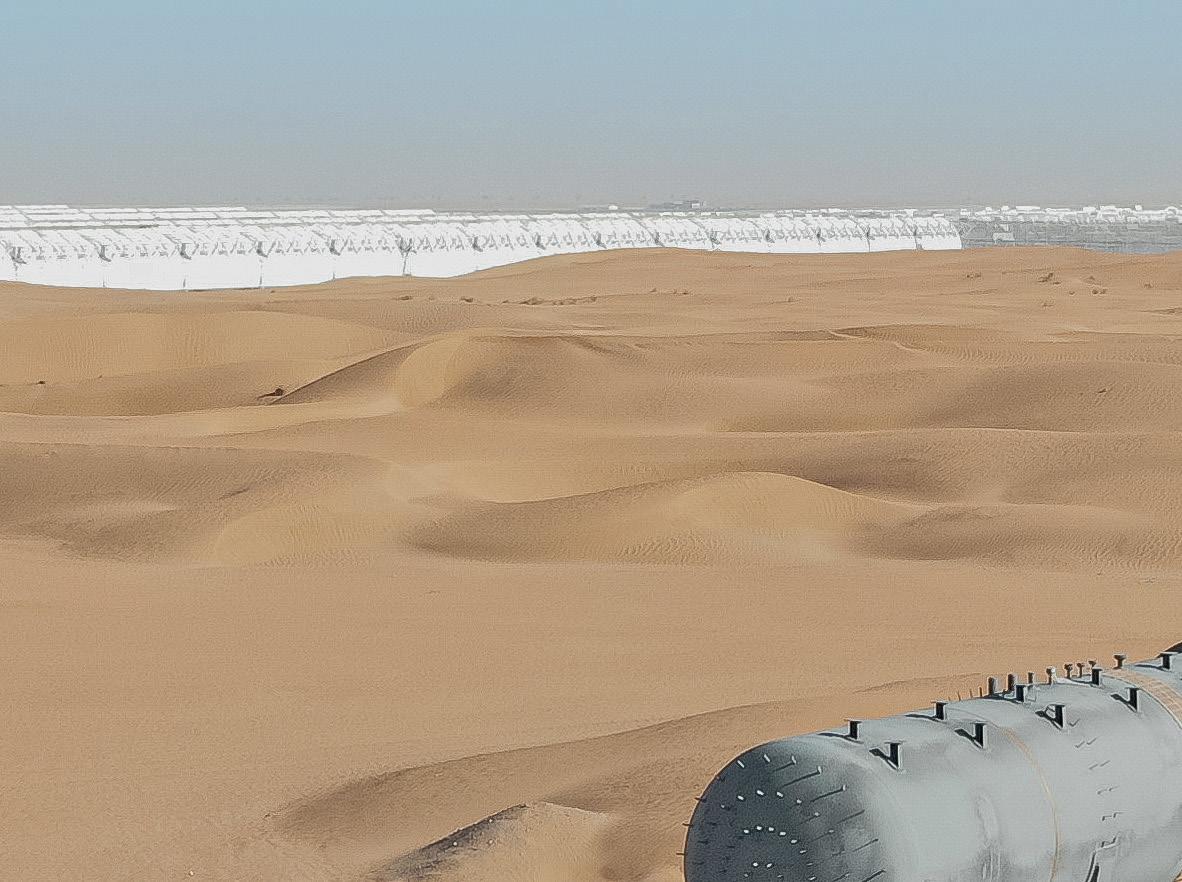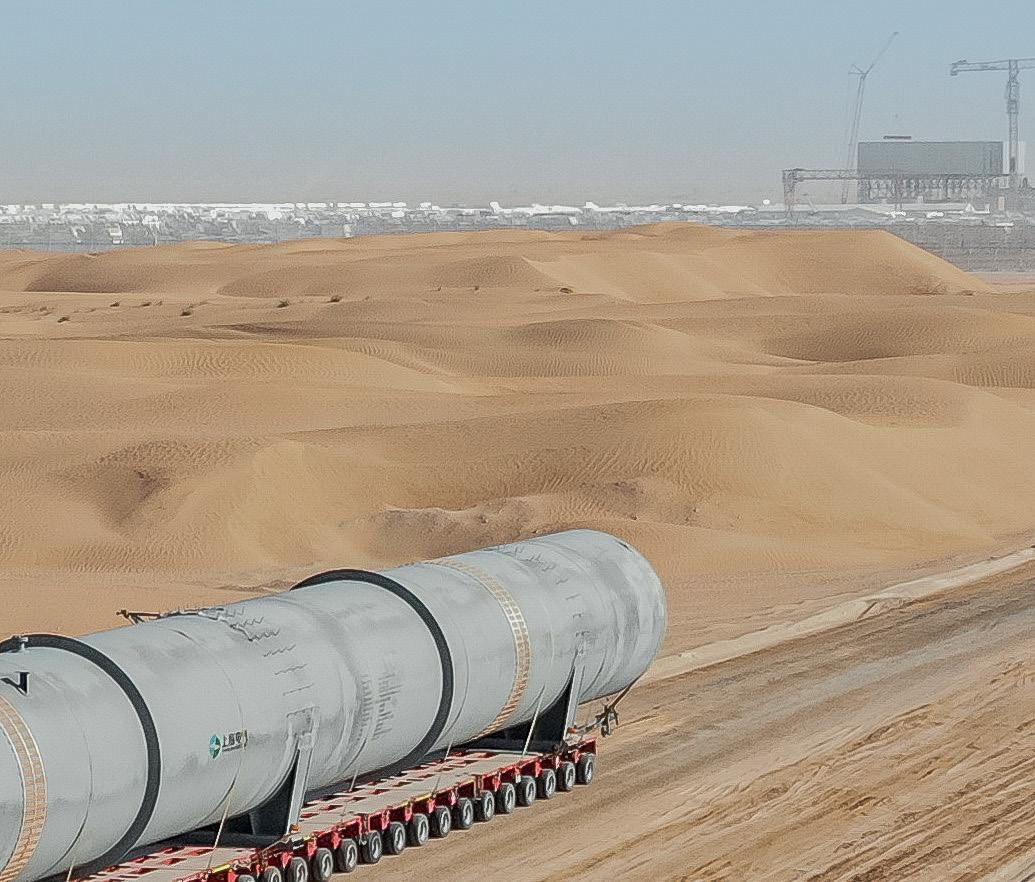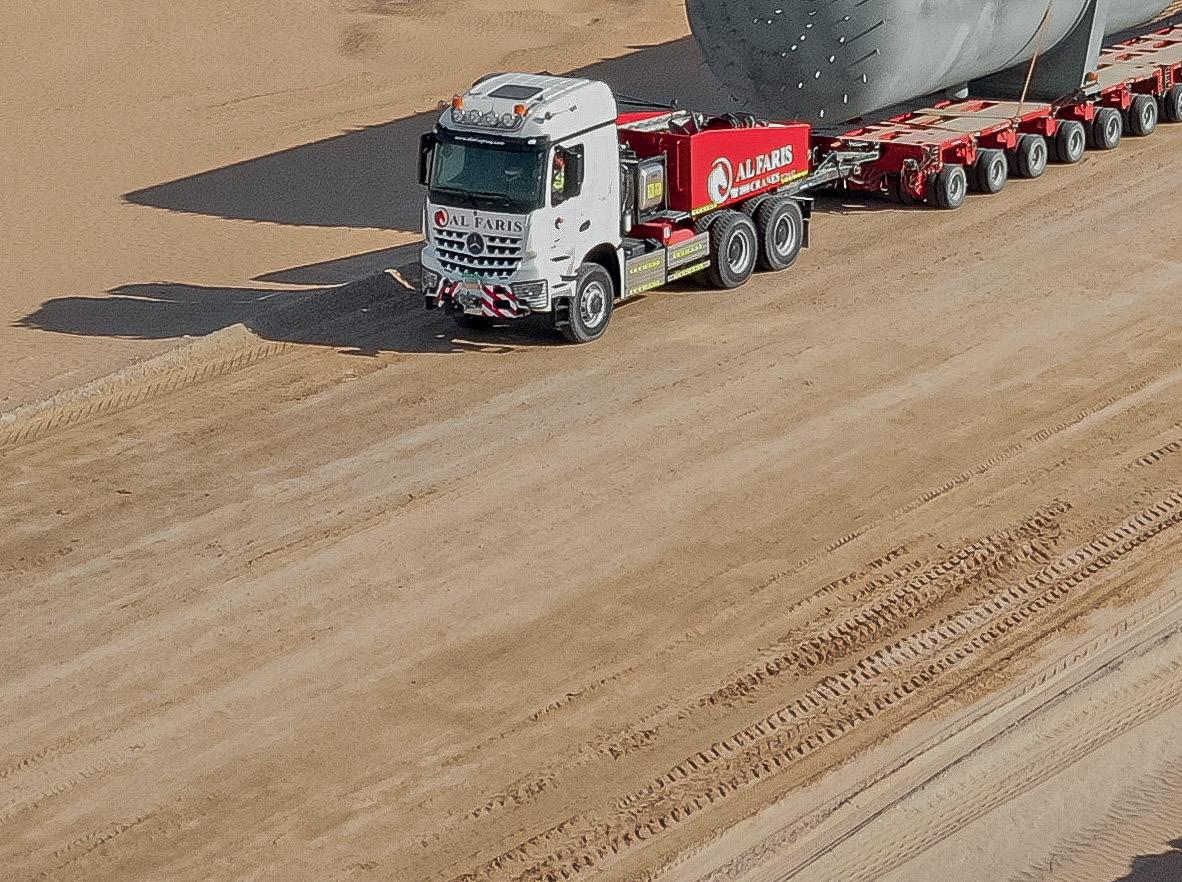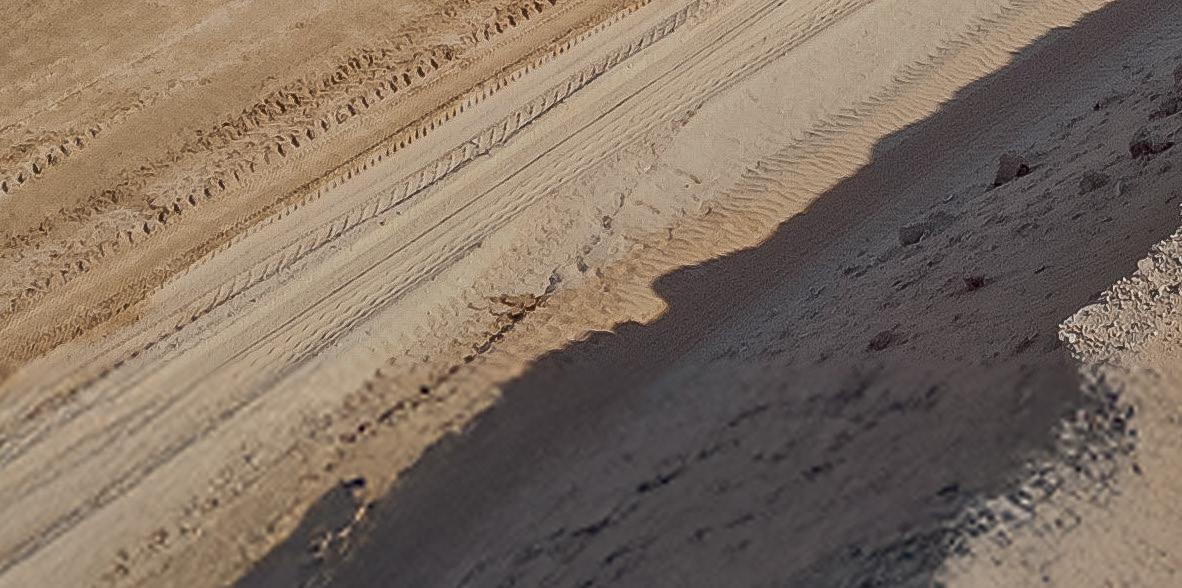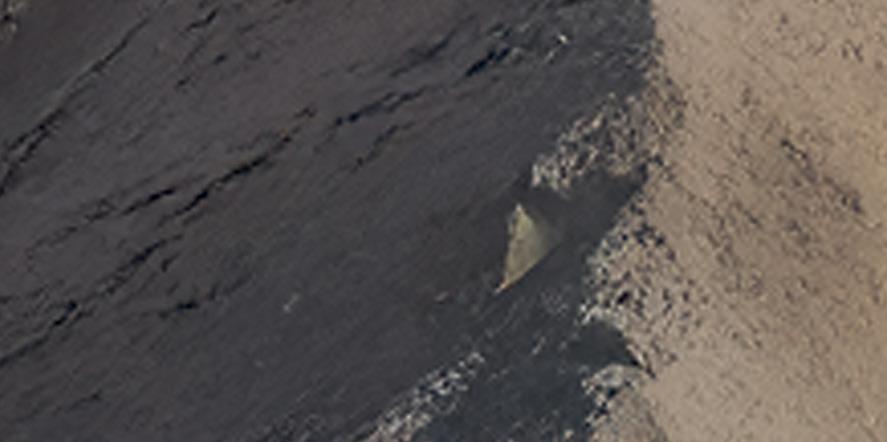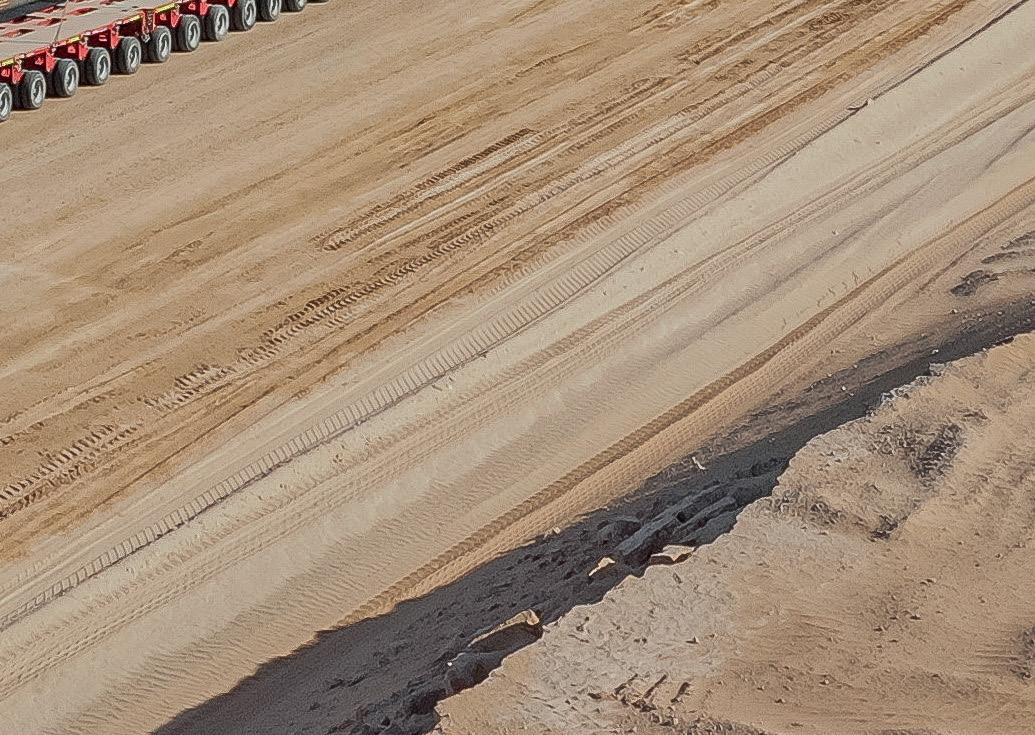129/JANUARY-FEBRUARY 2O25

MIDDLE

129/JANUARY-FEBRUARY 2O25

MIDDLE
Al Shirawi and Scania combine to keep pace with the UAE’s construction boom
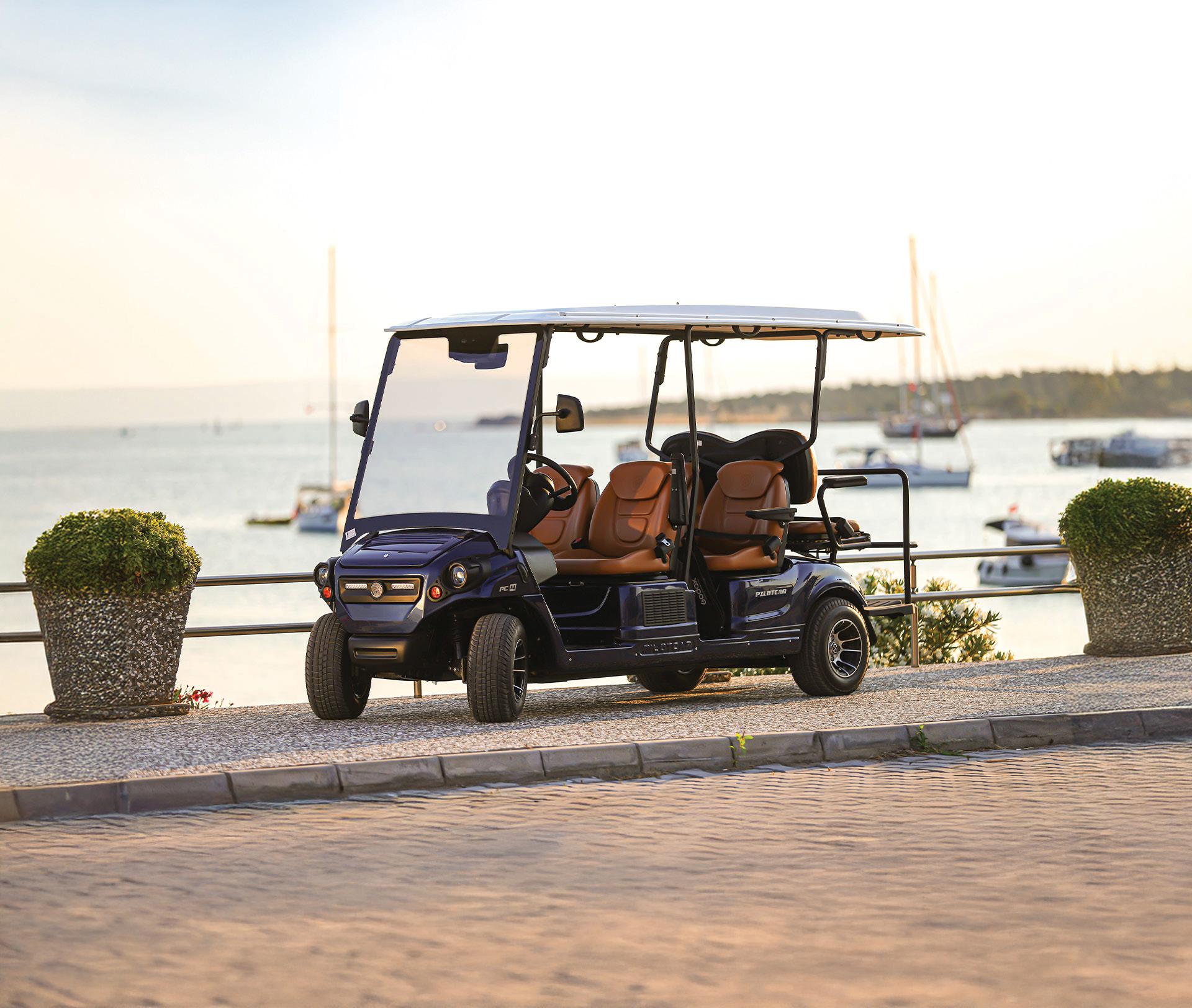
FEATURE 18 / FLEET
How Scania’s transit mixers are ready to cement their place in the market.
NEWS
06 / NEWS FROM THE MONTH
Dubai’s RTA reaches out to the industry to help it to reach its decarbonisation goals.
LAUNCHES 10 / MG AIMS FOR THE MIDSIZED SUV MARKET
The new MG HS is the Sino-British brand’s attempt to attract mid-sized SUV buyers.
LAUNCH SPECIAL 12 / UNITED BUT NOT-DIESEL
T&FME is at the launch of United Diesel and Yutong’s electric truck lauch in the UAE.
FEATURE 24 / PRE-EMPTIVE STRATEGY
Autorola talks to T&FME about its Al Futtaim JV and the digitalisation of the pre-owned market.
FEATURE 28 / CONNECTING THE SLOTS Where does EV charging go from here?
INTERVIEW
34 / WE ARE HERE TO STAY

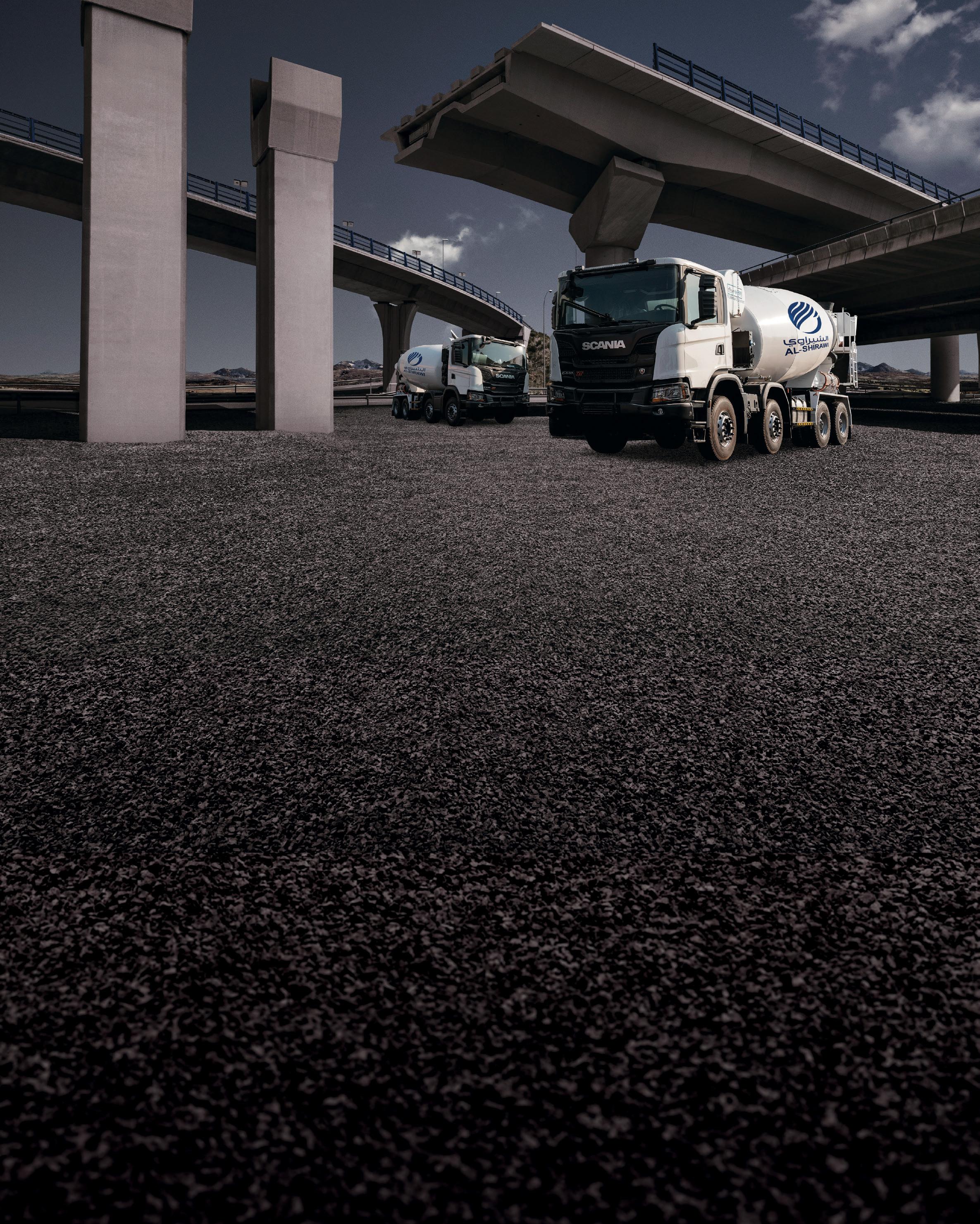
T&FME talks to Automechanika about how it is adapting to stay relevant to the aftermarket.
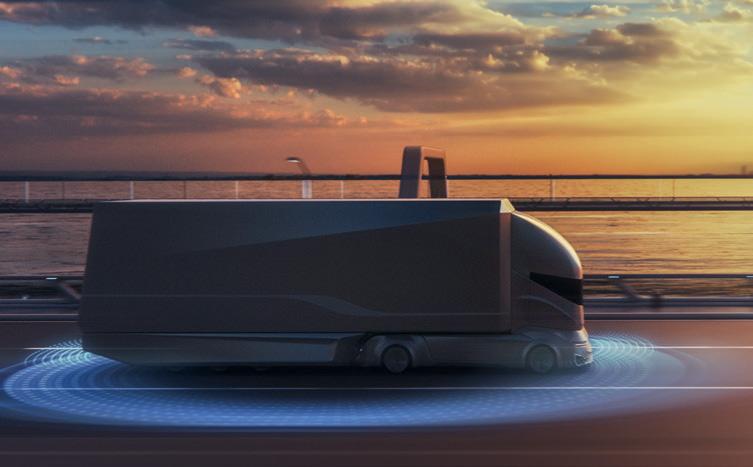
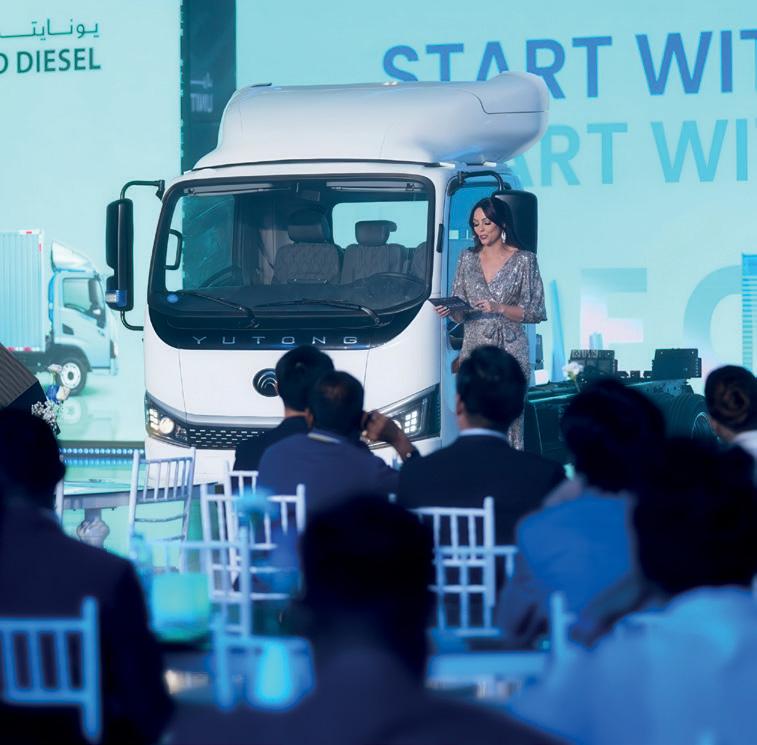
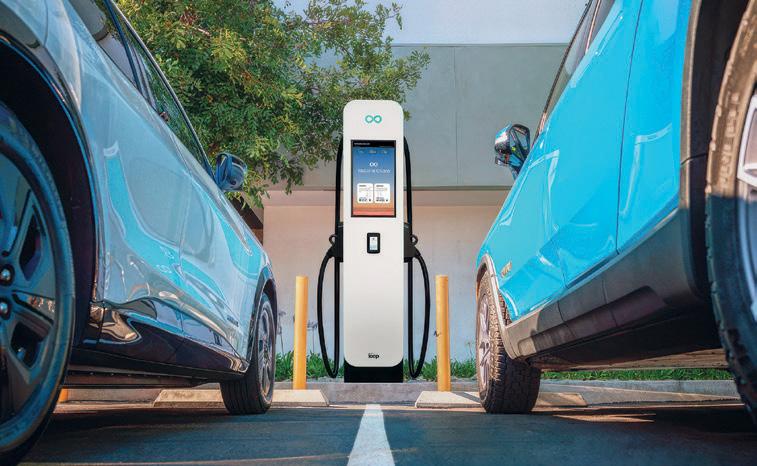
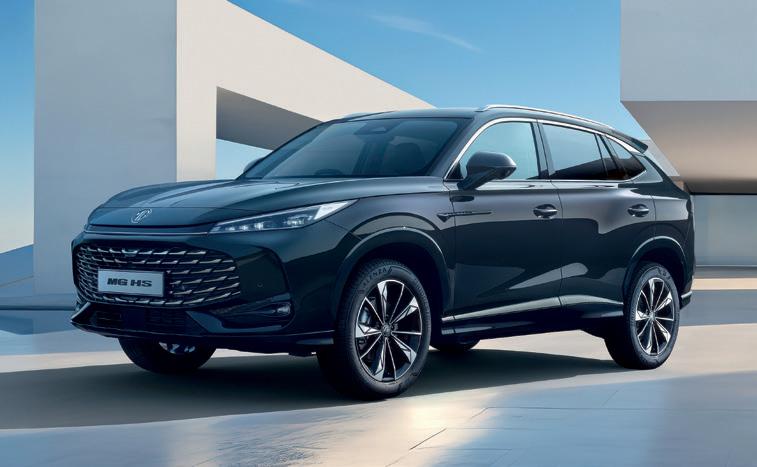
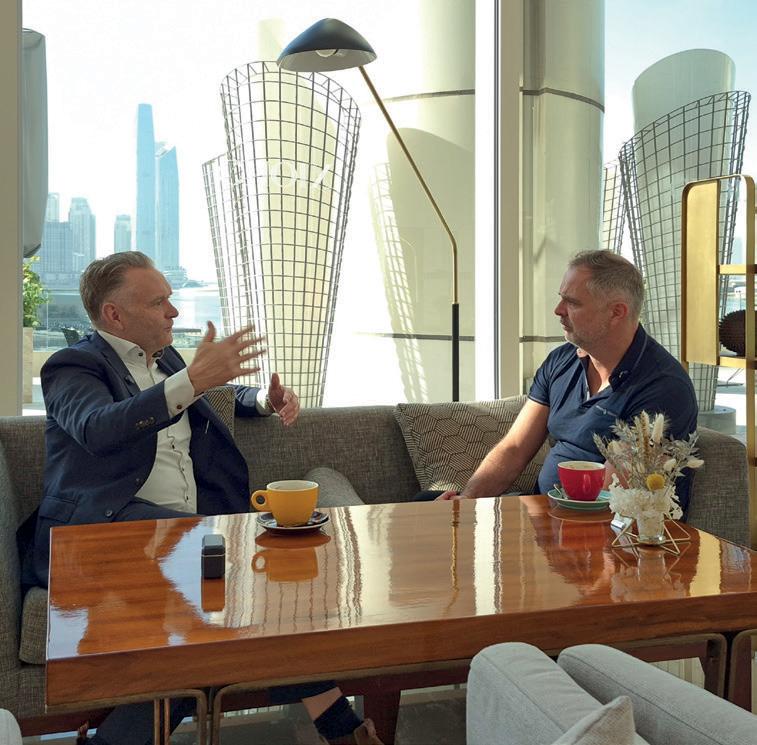
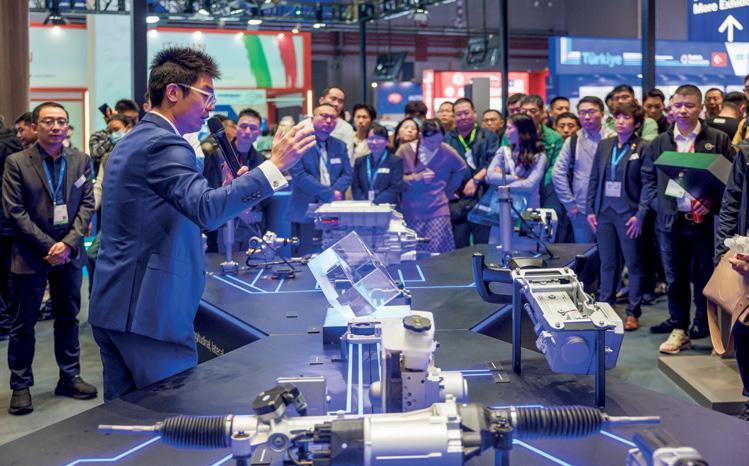

For fleet managers overseeing dozens or even hundreds of vehicles, the threat posed by counterfeit spare parts is not just a concernit’s a liability with far-reaching consequences. As Al-Futtaim Automotive’s 2024 operations have demonstrated, counterfeit parts are not only pervasive but also potentially disastrous for fleet operations. The seizure of over AED 7.46 million (approximately $2,031,358) worth of fake components highlights the magnitude of this issue and its implications for fleets striving to maintain efficiency, safety, and cost control.
Fleet reliability hinges on consistent performance, and counterfeit spare parts directly jeopardise this. Fake components such as oil and air filters may visually resemble genuine ones, but their substandard quality can lead to catastrophic failures. For fleets, the stakes are even higher. Counterfeit air filters allow contaminants to damage engines, increasing maintenance costs and vehicle downtime. Similarly, fake cabin A/C filters fail to protect passengers from pollutants, posing health risks to drivers and passengers - a significant liability for fleet operators responsible for employee safety. Yet, some fleet operators may be tempted by the promise of the cheaper parts that are all over online marketplaces. My advice is to check that the parts are OEM/OE certified as the operational risks posed by counterfeit parts are – ironically - compounded by the financial impact. Your fleet’s reputation is built on reliability, and unexpected
breakdowns due to substandard components can tarnish that reputation, leading to customer dissatisfaction and potential loss of business. Moreover, the costs of frequent repairs and unplanned downtime can quickly escalate, eroding profit margins in industries where every dirham counts.
The UAE’s proactive measures against counterfeit goods, including Dubai Police’s seizures worth AED 8.7 billion ($2,369,010) since 2019, reflect the seriousness of this issue. For fleet operators, these efforts underscore the importance of adopting stringent procurement policies. Purchasing from authorized dealers and retaining VAT invoices as proof of authenticity are not just best practices; they are essential safeguards against the infiltration of counterfeit parts. Fleet managers also have a critical role to play in raising awareness within their teams. Drivers and maintenance personnel should be trained to recognise signs of counterfeit parts and encouraged to report any concerns. Regular maintenance at authorised service centres further ensures that vehicles are fitted with genuine parts, minimising the risk of counterfeit-related failures. The integrity of a fleet’s operations depends on more than just well-maintained vehicles — it requires trust in the components that keep them running. Counterfeit spare parts undermine that trust, posing risks to safety, financial stability, and operational efficiency. In an industry driven by precision and accountability, there is no room for compromise.
STEPHEN
WHITE HEAD OF CONTENT, MOBILITY & CAPITAL ASSETS

STEPHEN.WHITE@CPITRADEMEDIA.COM
GROUP
MANAGING DIRECTOR RAZ ISLAM raz.islam@cpitrademedia.com
+971 4 375 5471
DIRECTOR OF FINANCE & BUSINESS OPERATIONS
SHIYAS KAREEM shiyas.kareem@cpitrademedia.com +971 4 375 5474
PUBLISHING DIRECTOR ANDY PITOIS andy.pitois@cpitrademedia.com +971 4 375 5473
EDITORIAL
HEAD OF CONTENT, MOBILITY & CAPITAL ASSETS
STEPHEN WHITE stephen.white@cpitrademedia.com +971 58 584 5818
ASSOCIATE EDITOR PRIYANKA RAINA priyanka.raina@cpitrademedia.com +971 4 375 5478
ADVERTISING
SALES MANAGER BRIAN FERNANDES brian.fernandes@cpitrademedia.com +971 4 375 5479
STUDIO
ART DIRECTOR SIMON COBON simon.cobon@cpitrademedia.com
DESIGNER PERCIVAL MANALAYSAY percival.manalaysay@cpitrademedia.com
PHOTOGRAPHER MAKSYM PORIECHKIN maksym.poriechkin@cpitrademedia.com
CIRCULATION & PRODUCTION
DIRECTOR OF MARKETING & MEDIA OPERATIONS
PHINSON MATHEW GEORGE phinson.george@cpitrademedia.com
PRODUCTION & IT SPECIALIST JARRIS PEDROSO jarris.pedroso@cpitrademedia.com
MARKETING
MARKETING & EVENTS EXECUTIVE LAKSHMY MANOJ lakshmy.manoj@cpitrademedia.com
SOCIAL MEDIA EXECUTIVE FRANZIL DIAS franzil.dias@cpitrademedia.com
WEB DEVELOPMENT
SENIOR DIGITAL MANAGER ABDUL BAEIS abdul.baeis@cpitrademedia.com
WEB DEVELOPER UMAIR KHAN umair.khan@cpitrademedia.com
FINANCE
CREDIT CONTROL EXECUTIVE CAMERON CARDOZO cameron.cardozo@cpitrademedia.com +971 4 375 5499
FOUNDER DOMINIC DE SOUSA (1959-2015)
PO Box 13700, Dubai, UAE. +971 4 375 5470 cpitrademedia.com
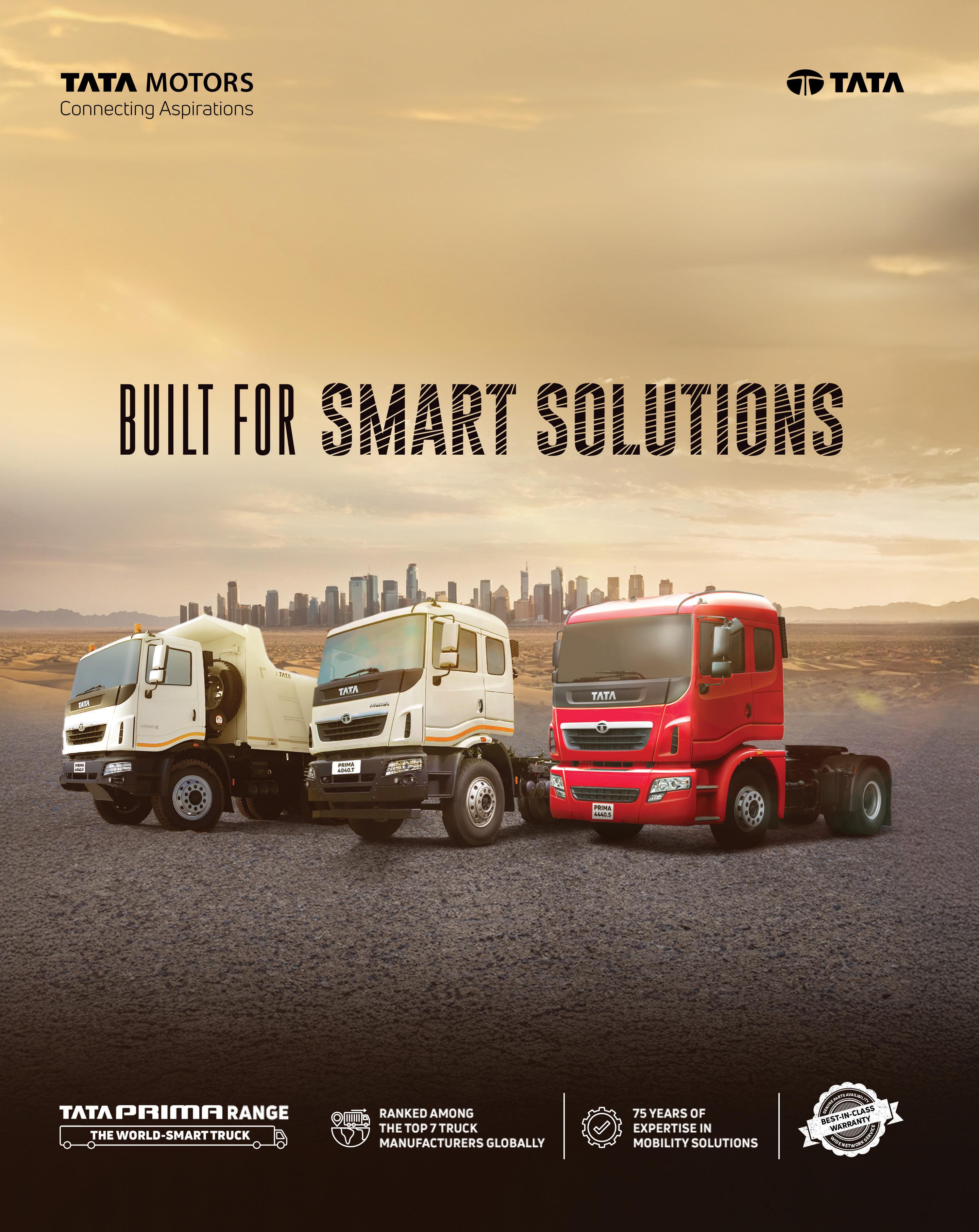
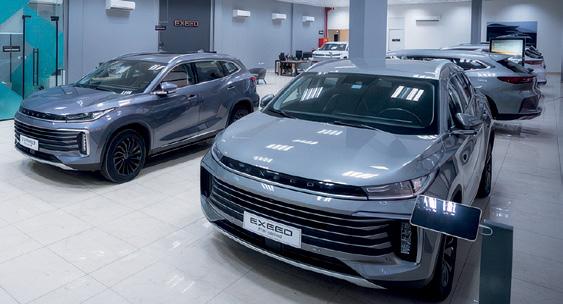
DISTRIBUTORS
EXEED and Al Ghurair Motors enter the preowned luxury market
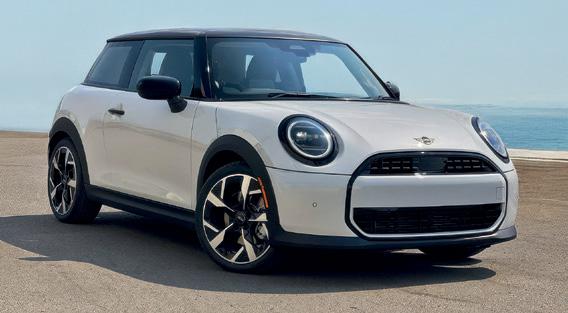
FLEET
BMW and MINI Cooper models bolster SelfDrive fleet
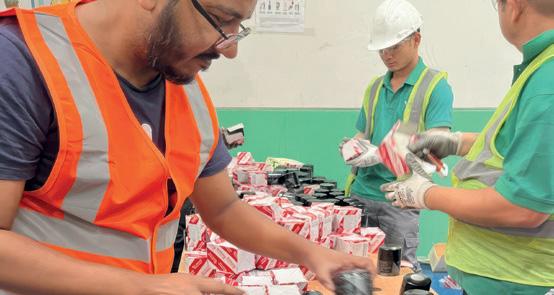
PARTS
Al-Futtaim Automotive seized $2mn of counterfeit spare parts in 2024
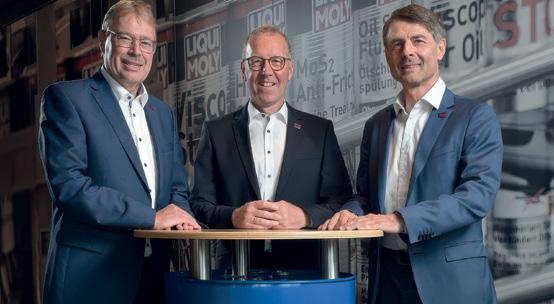
LIQUI MOLY achieves record Sales of €1 Billion in 2024
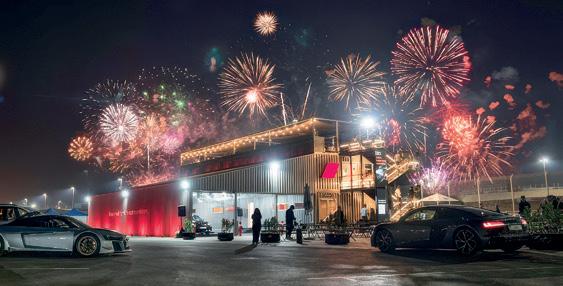
Audi showcases three new ‘icons’ at the 20th Michelin 24H Dubai Race 2025
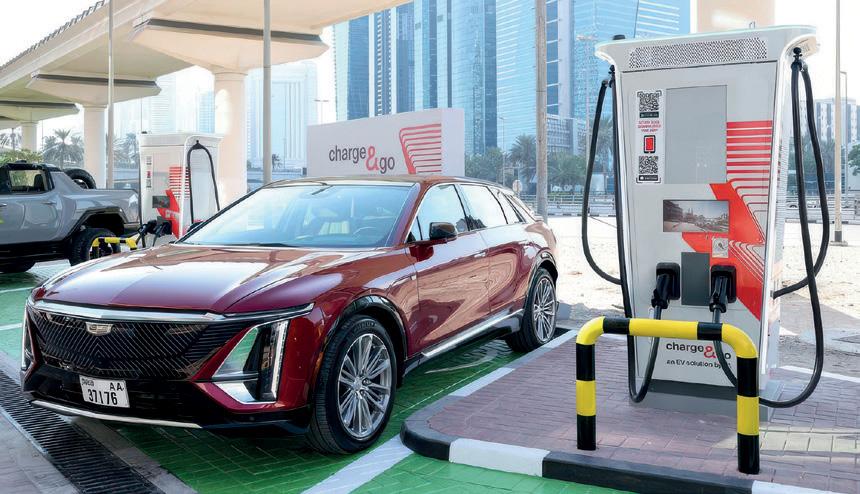
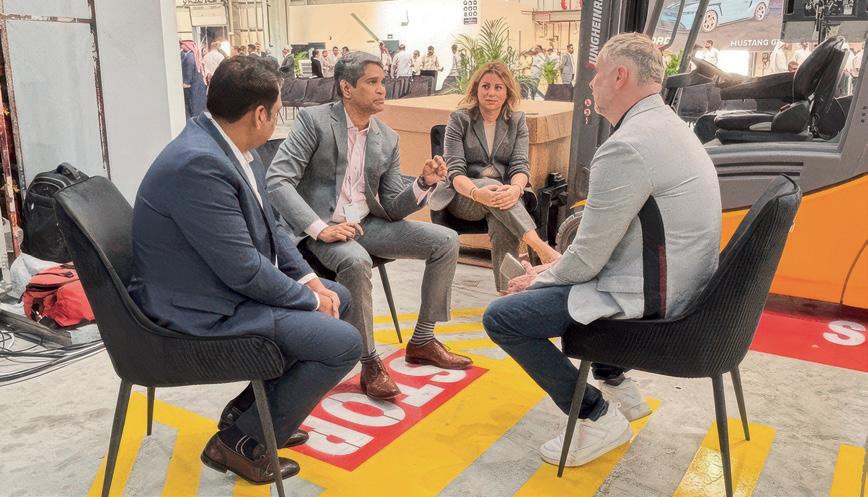

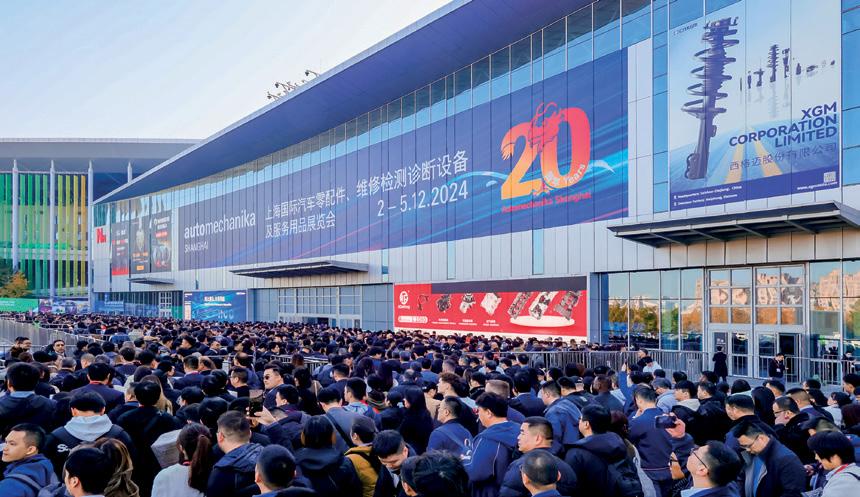
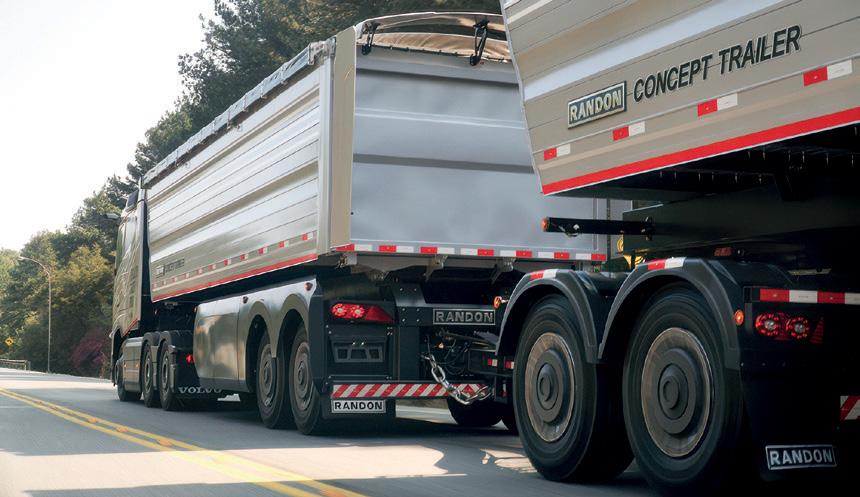
EXPERTS
The Top 5 Electric Vehicle trends to watch for in 2025
According to Chintan Sareen, CEO & Founder of PlusX, he opportunities for growth, efficiency, and environmental impact reduction are immense
FLEET
Ford explains why it is opening a state-of-the-art PDC in Dubai
T&FME reports from today's event held at Ford's advanced new parts distribution centre in Dubai
FLEET
Allison Plant visit: Automatic for the people
T&FME visits Allison Transmission’s Customer Experience Centre for a behind the wheel showcase of its automatic technology
CARS
Automechanika Shanghai: Showcasing China at its best
Automechanika Shanghai’s 20th-anniversary edition underscored its role as a transformative platform for the automotive industry
ANALYSIS
West European heavy trailer market sales weaken but should rebound While production levels recovered significantly after COVID-19, the sector has been hit by declining exports
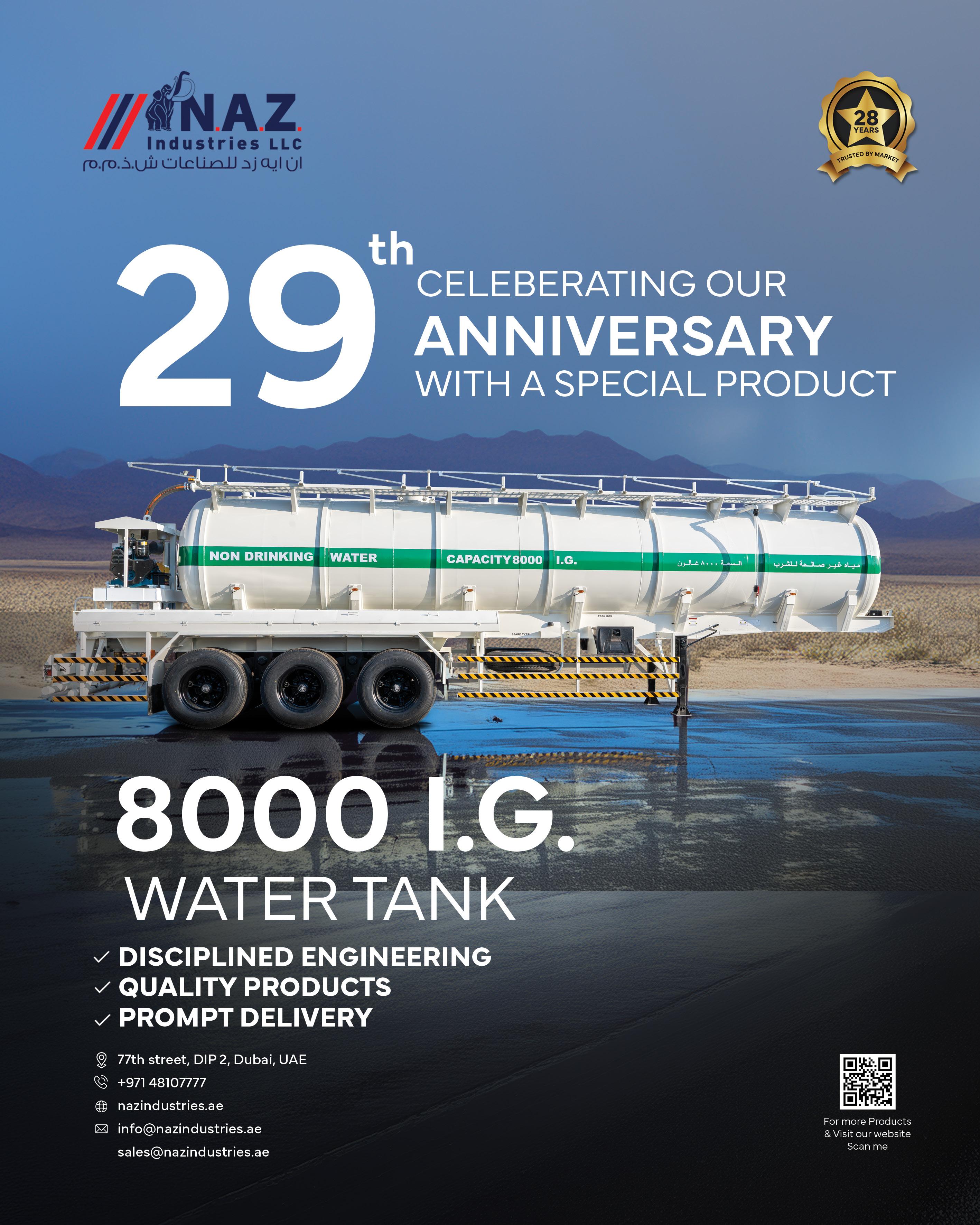
RTA ISSUES PLEA TO MOBILITY SECTOR / DRIVERS FEELING AT RISK / E-ACTROS ON THE ROAD IN RIYADH / TALABAT SHARE TURBULENCE
RTA EMPHASISES THE IMPORTANCE OF PUBLIC-PRIVATE COLLABORATION TO REACH 25% SMART AND DRIVERLESS TRANSPORT IN DUBAI BY 2030
Under Dubai’s Self-Driving Strategy, the city aims for 25% of all transportation trips to be smart and driverless by 2030. This ambitious plan is expected to deliver transformative benefits, including improved safety by 12%, reduced emissions by 12%, and a 20% increase in mobility efficiency. The annual economic impact of these advancements is estimated at over AED 22 billion.
Khaled Al Awadhi, Director of the Transportation Systems Department at RTA, highlighted the critical role of partnerships:
“The success pillars for Dubai’s innovative mobility projects
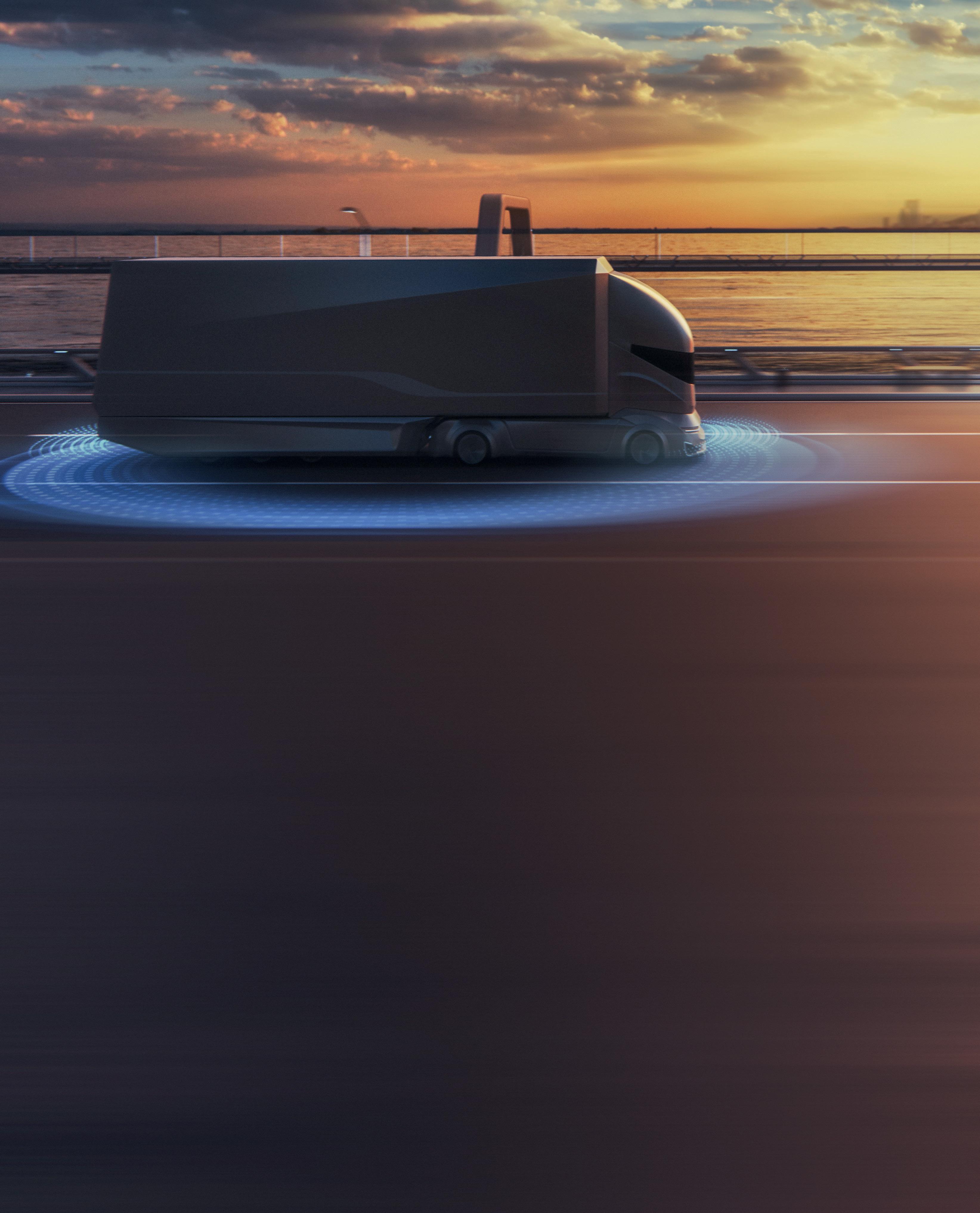
include leadership, vision, team building, and infrastructure.
Collaboration between public institutions and technology providers is essential to building an innovation ecosystem.
The private sector is vital in testing, certification, and R&D for autonomous solutions.”
Khaled Al Awadhi added:
“The private sector plays a vital role in testing, certification, and research and development for autonomous transport solutions in Dubai.”
The discussions at Innovation4Mobility showcased Dubai’s forward-thinking approach, featuring robot taxis, self-driving buses, driverless
metros, marine services, and cutting-edge technologies like Hyperloop, vertical take-off and landing systems, and AI-driven guidance tools.
Sustainable solutions such as electric, hybrid, and hydrogen-fuelled vehicles further underscored the city’s commitment to climate-neutral mobility.
Keynote speakers also addressed global trends in electrification, connected mobility, and Mobility-asa-Service (MaaS), marking the event as a milestone in the journey towards smarter, more efficient transport systems by 2030.
Mahmut Gazi Bilikozen, Portfolio Director of Mobility & Logistics at Messe Frankfurt Middle East, remarked: “The Innovation4Mobility feature highlights the UAE’s dedication to redefining transportation. By bringing together stakeholders, the platform fosters collaboration to address challenges and unlock opportunities in the rapidly evolving mobility ecosystem.
It’s inspiring to witness the partnerships that will shape the future of the industry.”
Automechanika Dubai 2024 also celebrated the return of AfriConnections, a platform bridging African buyers with global suppliers.
TRUMP’S AUTOMOTIVE 25% TARIFFS WOULD IMPACT NEARLY ALL OEMS, WARNS NEW REPORT BY S&P GLOBAL MOBILITY
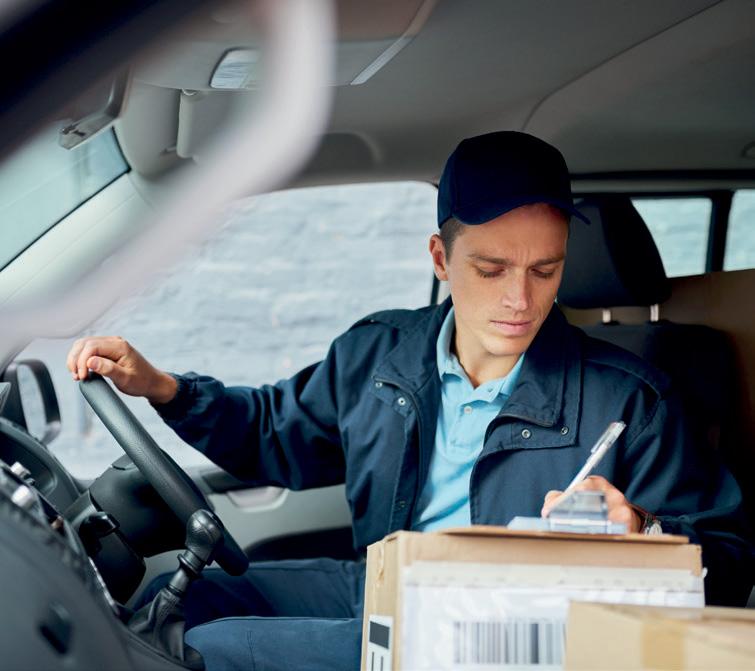
A recent survey by vehicle telematics provider Geotab highlights the growing pressures on UK lorry and van drivers, with 90% of respondents reporting that work-related stress negatively impacts their driving. Alarmingly, nearly all of the 500 drivers surveyed (97%) believe the risk of accidents has increased over the past five years, with real-world data from Geotab supporting this perception.
Geotab’s vehicle analysis shows that commercial drivers in the UK are traveling fewer miles before a collision occurs, with the average distance per collision falling by 19.12% from 2022 to 2023. For large fleets, this decline in safety could equate to a notable rise in collisions annually, impacting both drivers and fleet operations. Half of the drivers surveyed reported that they’ve considered leaving the profession due to these mounting pressures.
Mental health support appears to be lacking, with half of the surveyed drivers expressing discomfort in approaching their employers for assistance with stress and other mental health issues. Additionally, 39% feel their employer provides minimal or inadequate support for managing mental health concerns.
To address these pressing issues, Geotab is hosted a special webinar titled ‘Road Ready: Mind & Body,’ with the aim to explore the mental health challenges commercial drivers face and discuss strategies employers can implement to improve fleet safety. Peter Milchard, AFP Board Director, emphasised the importance of this dialogue, noting, “Road safety is a key focus for AFP, and this webinar is an opportunity to foster a safer, more supportive work environment for drivers.”
SADAFCO has taken a significant step in its fleet decarbonisation journey by testing the Mercedes-Benz eActros 300, delivering Saudia Milk to top retailers in Riyadh throughout October. The fully electric truck demonstrated impressive energy efficiency, consuming just 0.70 KW per kilometre while maintaining zero emissions during daily operations.
Saudia Dairy and Foodstuff Company (SADAFCO) is a leading food manufacturer, seller, and distributor based in Saudi Arabia, with operations across the Middle East. Established on April 21, 1976, SADAFCO has become a market leader in Saudi Arabia in Long Life Milk, Tomato Paste, and Ice Cream, marketing its core products under its flagship brand, Saudia.
With ambitions to be a leader in the region’s food and beverage
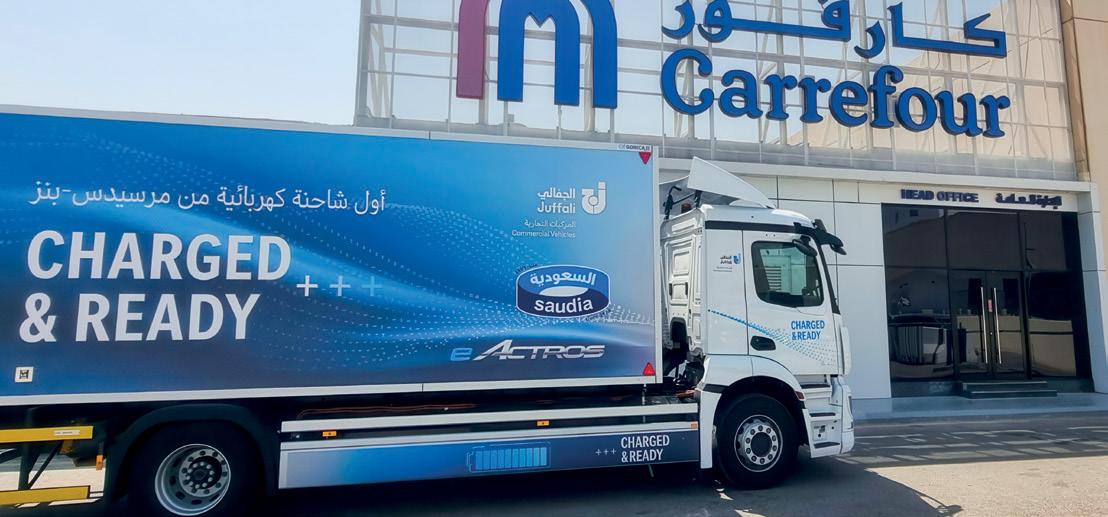
sector, SADAFCO is committed to advancing sustainable logistics solutions. The company plans to continue expanding its Commercial Electric Vehicle (CEV) testing in Riyadh, sharing results to support the city’s decarbonization goals.
Brian Strong, SADAFCO’s Head of Transformation, shared his firsthand experience of the trial on LinkedIn, commenting, “Had the pleasure this morning to make deliveries of Saudia Milk to customers
in Riyadh with the new MercedesBenz eActros 300, currently being tested for the first time in Saudi Arabia on an actual SADAFCO key account ambient route.”
He emphasised the importance of these trials, noting that SADAFCO’s ambitious Fleet Decarbonization Roadmap aims for 90% of its fleet to be powered by clean energy, with a target to phase out internal combustion engine (ICE) vehicles by 2035.
FLEET
Talabat Holding plc, the leading on-demand food delivery and convenience retail marketplace in the MENA region, completed its highly anticipated initial public offering (IPO) on the Dubai Financial Market (DFM). Initially met with overwhelming international and regional investor demand, the offering size was increased by nearly 33% during the book-building
period. However, despite the strong debut, Talabat’s shares closed down by 6.87% on their first trading day.
Talabat’s IPO, which concluded on 28 November 2024, marked one of the most significant listings on the DFM this year. The offering size was increased to 4.66 billion shares, representing 20% of the company’s total issued share capital, up from the originally planned 15%.
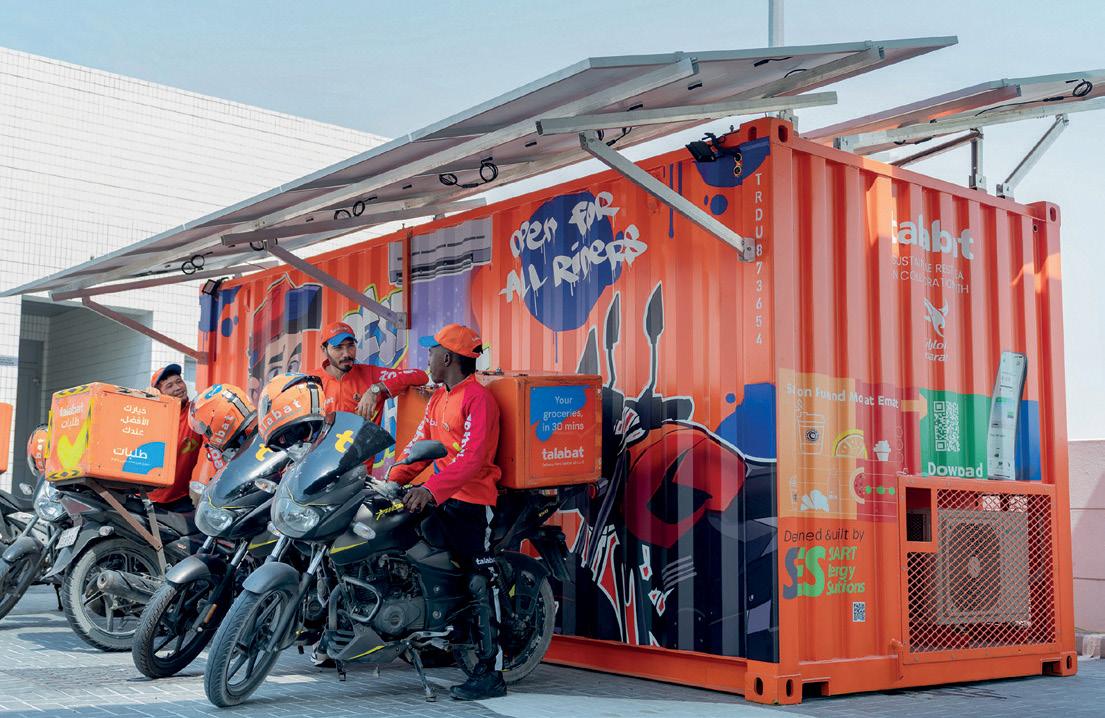
This adjustment was made to cater to strong demand from global long-only and technology investors, many of whom were investing on the DFM for the first time.
Redseer Strategy Consultants noted that Talabat serves over six million active monthly customers across eight countries, addressing a population of more than 71 million. “Talabat’s IPO represents a significant moment in the region’s technological evolution,” the consultancy stated.
Speaking with Khaleej Times, Vijay Valecha, Chief Investment Officer at Century Financial, highlighted the strong initial demand for Talabat’s IPO, noting that it reflected high investor interest. “However, like other private company IPOs this year, such as Lulu, and Spinneys, Talabat’s listing saw more muted movements compared to statebacked companies,” he said.
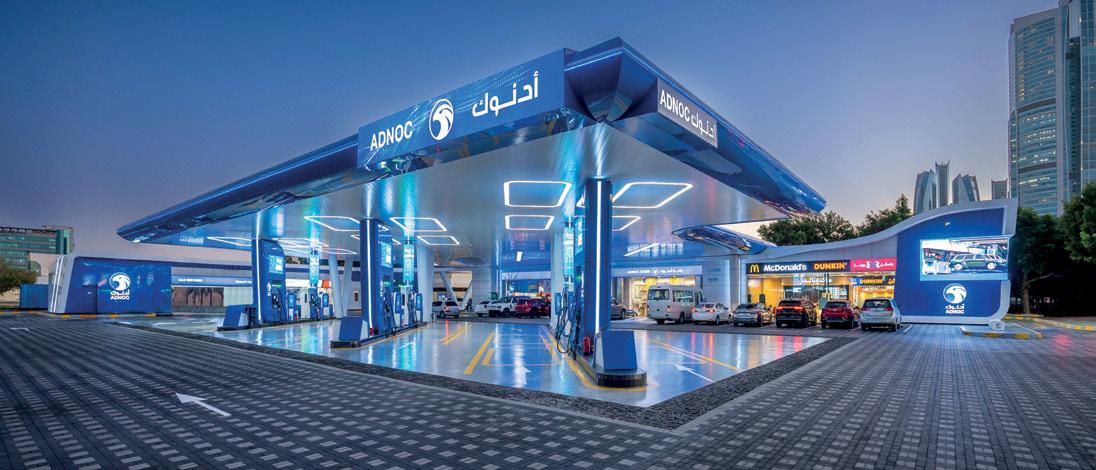
ADNOC Distribution has launched ARIF, a state-of-the-art AI-powered chatbot designed to revolutionise investor relations. Unveiled during Abu Dhabi Finance Week, ARIF underscores ADNOC Distribution’s commitment to technologydriven innovation, enhancing transparency and engagement with its investor community.
Named after the Arabic word meaning “knowing” or “informed,” ARIF offers 24/7 access to accurate financial insights and strategic information. It supports natural language queries in both English and Arabic,
enabling seamless communication for a diverse investor base. ARIF’s capabilities extend far beyond traditional chatbots. Leveraging conversational AI, ARIF provides: Dynamic responses to investor queries; Custom financial ratio computations synthesised from real-time performance metrics; and instant analysis of growth indicators and updates on ADNOC Distribution’s strategy, equity story, and sustainability initiatives. The chatbot utilises verified company data, ensuring reliability and accuracy. ARIF is part of ADNOC Distribution’s strategy to integrate advanced digital technologies across its operations.
RETAIL
NIO Inc. notched up a recordbreaking month in December 2024, delivering 31,138 vehicles and surpassing the 30,000-unit mark for the first time. This represents a 72.9% increase year-over-year.
The deliveries included 20,610 vehicles from NIO’s premium smart electric vehicle (EV) lineup and 10,528 vehicles from its family-oriented sub-brand, ONVO. For the entirety of 2024, NIO Inc. delivered 221,970
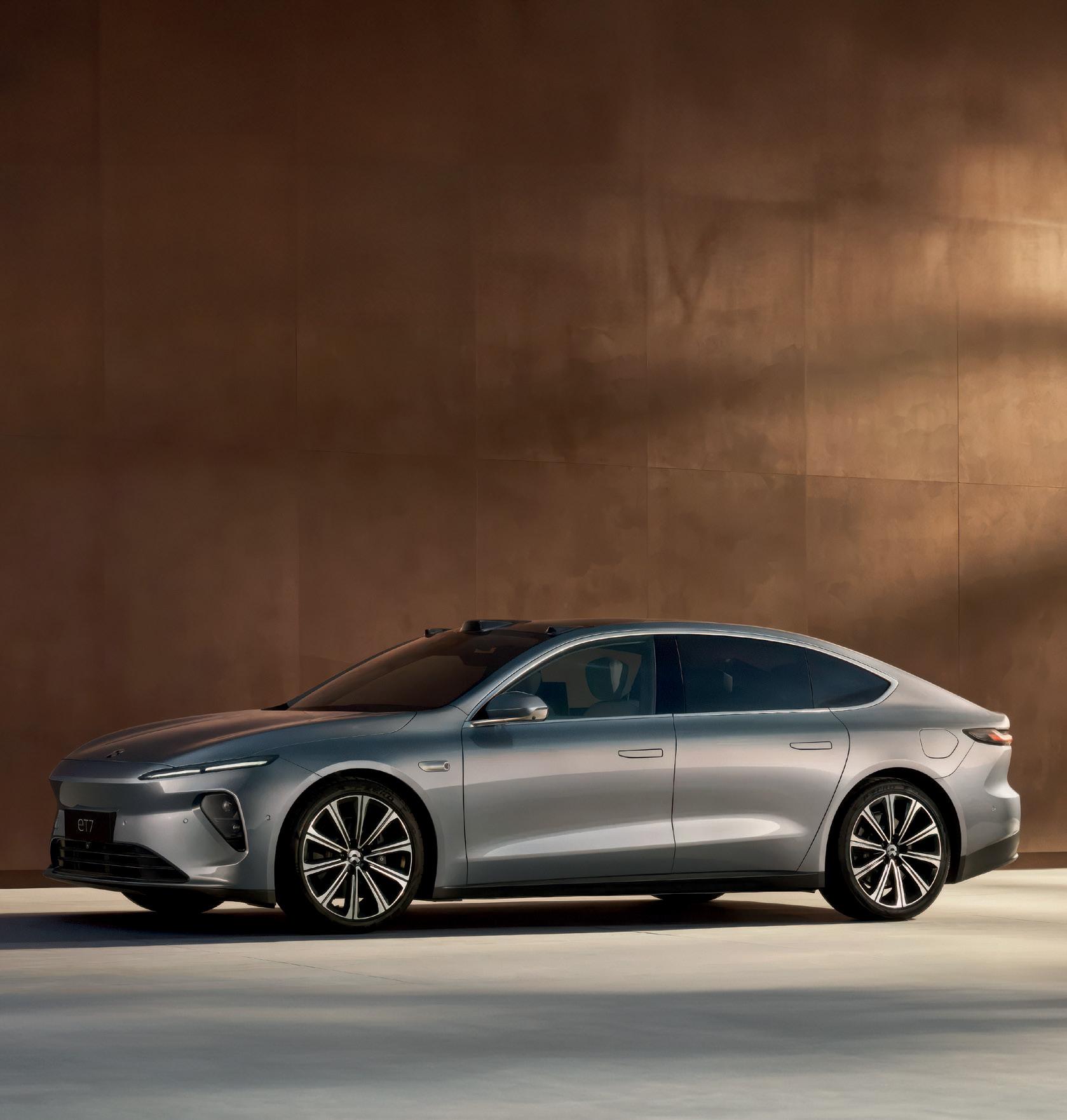
vehicles, marking a 38.7% growth compared to 2023. Of these, the NIO brand contributed 201,209 units, a 25.7% yearover-year increase, while ONVO accounted for 20,761 units. The company’s cumulative deliveries have now reached 671,564 as of December 31, 2024.
The ONVO L60, the flagship model of NIO’s sub-brand, has quickly gained traction in the market. In just its third month of sales since its launch on September 28,
2024, the L60 surpassed 10,000 monthly deliveries.
Within 100 days, cumulative deliveries of the L60 have exceeded 20,000 units, setting an industry benchmark for delivery speed.
Since September, the brand has established 300 ONVO stores across 82 cities, supported by 317 authorised service centers spanning 172 cities in China.
Additionally, over 1,000 NIO Power Swap Stations are now compatible with the ONVO L60.
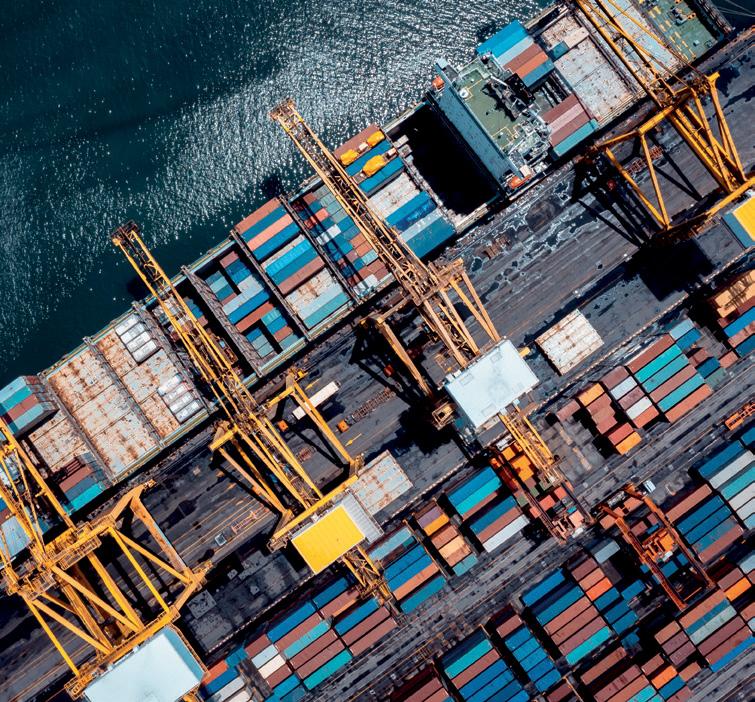
Arcapita Capital Company has reached an agreement with Flow Progressive Logistics (Flow) to develop a modern, Class A logistics complex in Riyadh. An end-to-end supply chain management company, Flow is a part of Saudi-based Alsulaiman Group. The deal will see Arcapita develop an 80,000sqm mixed-use storage complex. The facility will feature various storage options, including cold storage, dry storage, temperature-controlled facilities, as well as specialised spaces for pharmaceutical and hazardous goods. Flow, which provides international shipping, customs clearance, warehousing, transportation, delivery, and reverse logistics, will operate the facility under a long-term lease agreement.
This collaboration will expand Arcapita’s logistics real estate portfolio in Saudi Arabia and support the government’s efforts to diversify its economy and improve market infrastructure, in line with Saudi Arabia’s Vision 2030. The Ministry of Transport and Logistics Services has been instrumental in driving growth in this sector, and its support continues to encourage private sector participation.
The industrial and logistics sectors are key components of the Kingdom’s Global Supply Chain Resilience Initiative, which aims to attract $10.6bn in investments. Isa Al Khalifa, Director of Real Estate Investments at Arcapita said: “We are extremely pleased to expand our partnership.”


Experience unparalleled power and performance with the new Scania Truck equipped with concrete mixer. Engineered for durability and safety, it prioritizes driver well-being, minimizes operating costs, and maximizes e ciency. With 24/7 service support, Scania ensures your business operates seamlessly
marketing.ase@alshirawi.ae
THE NEW MG HS BUILDS ON THE SUCCESS OF ITS PREDECESSOR / ALL ELECTRIC BUSES FROM ANKAI ENTER UAE MARKET
$21,600 STARTING PRICE IN UAE
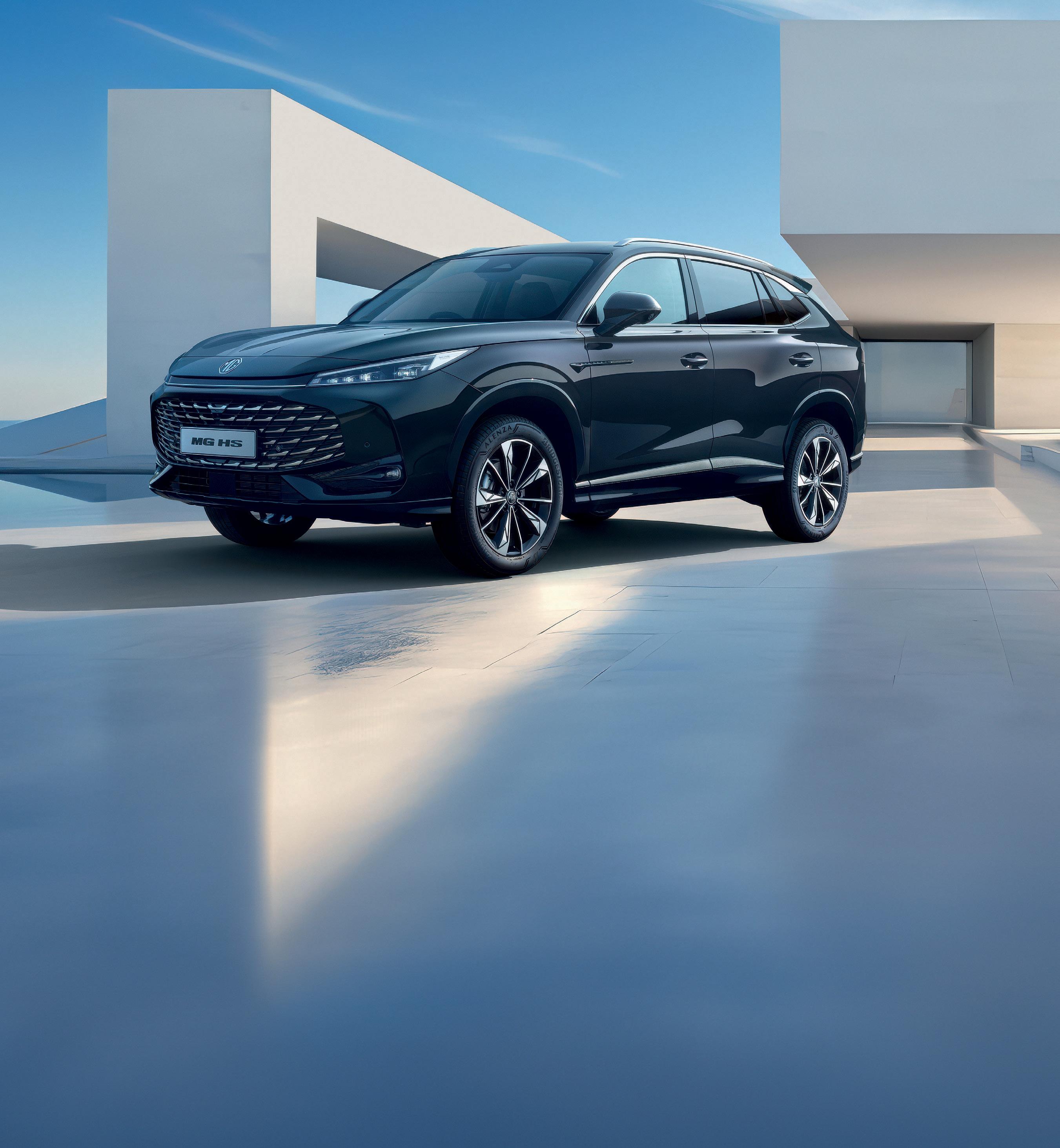
CHINESE FIRM TAKES A BOLD STEP IN TAKING ON THE MIDDLE EAST’S MID-SIZE SUV SEGMENT
MG Motor has unveiled the allnew MG HS, redefining its offering for the mid-size SUV segment with an improved combination of style, performance, and technology.
Available now across the GCC, Iraq, and Jordan, the new MG HS builds on the success of its predecessor, which was awarded the prestigious Middle East Car of the Year title in 2020. With prices starting at USD 21,600 (excluding VAT), this sporty SUV offers exceptional value for young and ambitious buyers seeking a dynamic driving experience.
The new MG HS features an eye-catching design, luxurious interiors, and advanced
technology. Its ‘Hunting Eye’ LED headlights and ‘The Shard’ full-length LED taillights give the SUV a confident and sophisticated appearance.
Inside, the cabin showcases high-quality materials and cutting-edge features, including dual 12.3-inch HD screens for a fully immersive digital cockpit experience. A premium BOSE audio system with eight speakers ensures crystal-clear sound, while features like dual-zone air conditioning, rain-sensing wipers, and wireless phone charging enhance convenience.
Seamless Apple CarPlay and Android Auto integration further
elevate the driving experience.
Safety is a key focus for the new MG HS, earning it a fivestar Euro NCAP safety rating. Equipped with Level 2 Advanced Driver Assistance Systems (ADAS), the SUV includes features such as Intelligent Cruise Control, Automated Emergency Braking, Lane Departure Warning, Lane Keep Assist, Forward Collision Warning, and a Blind Spot Information System. Additional safety features include a 360-degree HD camera, front and rear parking sensors, and up to six airbags, ensuring maximum protection for occupants.
Under the bonnet, the MG
HS offers two powerful engine options. Drivers can choose between a 1.5T engine delivering 173 hp with a 7-speed dual-clutch transmission or a 2.0T engine producing 231 hp paired with a 9-speed automatic transmission. Superior handling dynamics and enhanced NVH (Noise, Vibration, and Harshness) levels make every drive smooth and exhilarating. The sporty three-spoke squaricle steering wheel adds to the engaging driving experience, perfectly complementing the SUV’s bold character.
Practicality is intended to meet elegance with features such as a power tailgate and up to 1,397

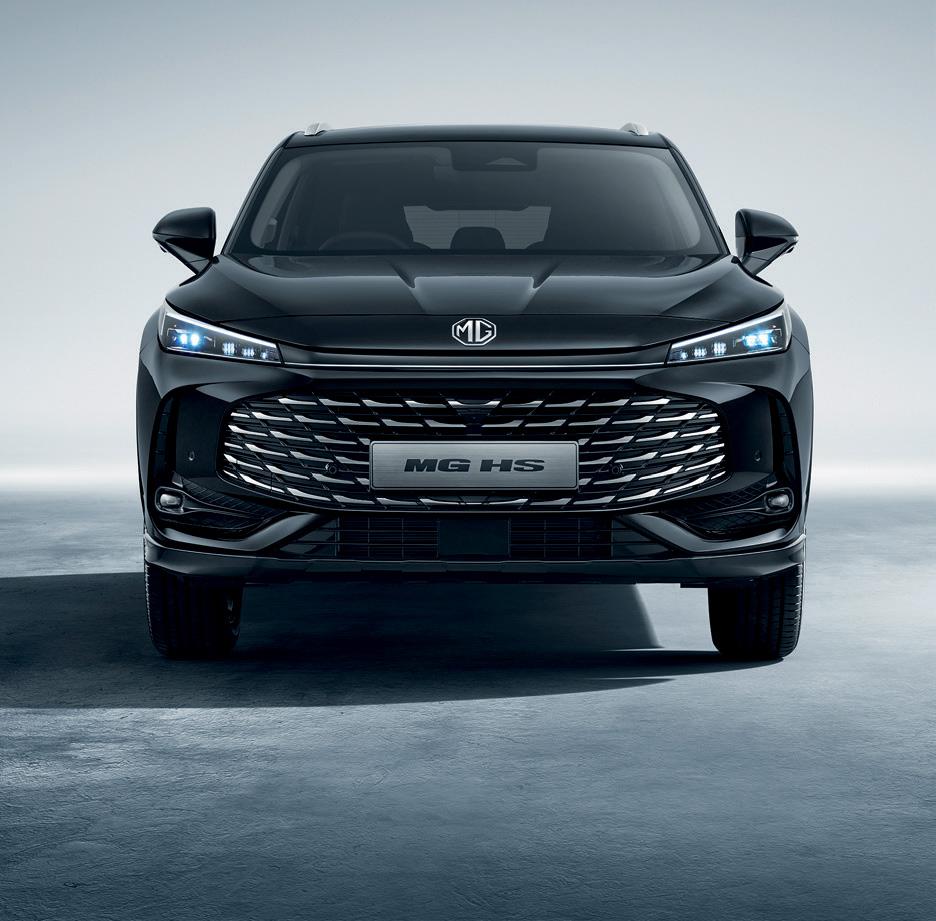

LAUNCH OF FOUR BUS MODELS, INCLUDING AN ALL-ELECTRIC BUS FOR GOVERNMENT ENTITIES AND ECO-CONSCIOUS BUSINESSES
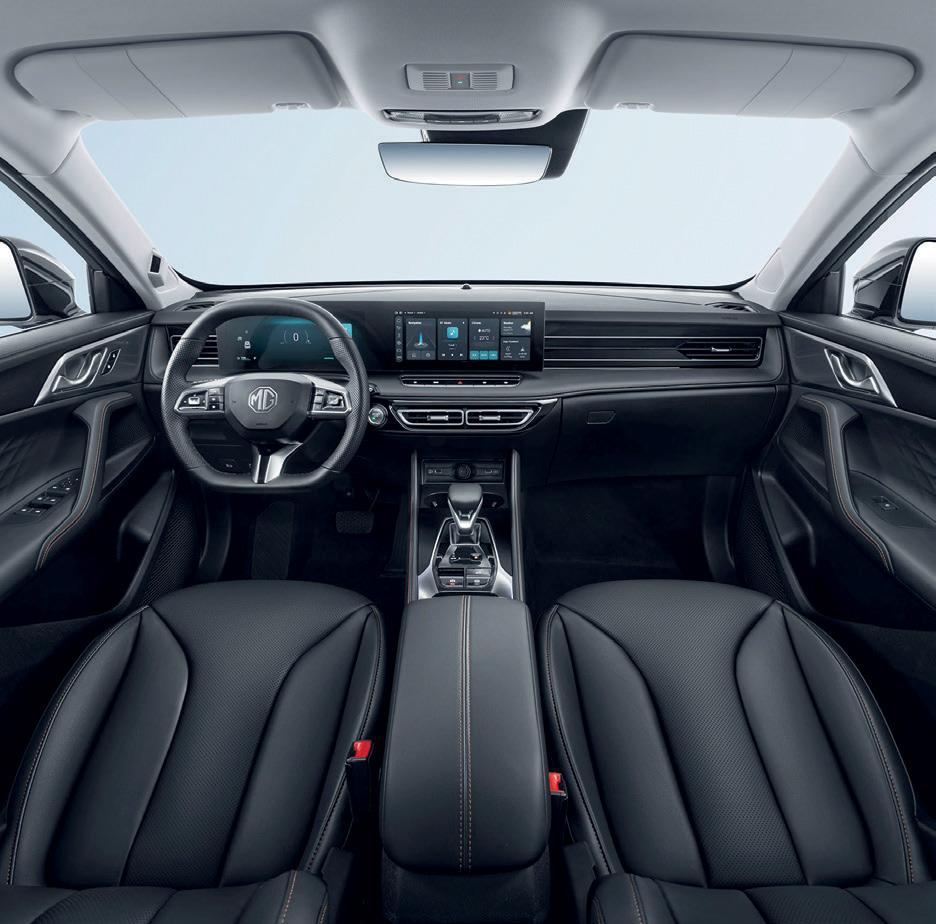
litres of cargo capacity, making the MG HS a good choice for families and weekend getaways. The electronic panoramic roof fills the cabin with natural light, creating a spacious and airy feel, while memory functions for the driver’s seat and mirrors add a personalised touch.
Tom Lee, Managing Director of MG Motor Middle East, commented, “The
SPECIFICATIONS
new MG HS represents the next step in our journey to redefine the mid-size SUV experience. Designed with the needs of young, ambitious drivers in mind, it combines passion, power, and practicality. If buyers are looking for a reliable SUV that is both sporty and stylish, the MG HS delivers on all fronts, making it a gamechanger in the segment.”
Charabanc Transportation has officially launched “Ankai,” the Chinese bus brand and four specialised Ankai bus models tailored for the UAE market. These include a luxury coach designed to elevate the travel experience for tourists with premium comfort and amenities. An allelectric bus provides a sustainable mobility solution, making it ideal for government entities and eco-conscious businesses. This electric model boasts an impressive 350 km driving range and features an eControl system that is claimed to reduce energy consumption by over 10%.
The range also includes a school bus, equipped with advanced safety systems to ensure reliable and secure transportation for children, and a staff bus, optimised for comfort and efficiency in daily commuting.
Each model is built to the highest global safety standards, incorporating rollover protection, Electronic Stability Control (ESC), and Lane Departure Warning (LDW) systems.
Holden Zhang, Vice General Manager of Ankai Group and General Manager of Ankai International, highlighted the brand’s legacy of over 50 years in the electric and commercial bus industry: “The UAE is home to a dynamic market
with exceptional growth opportunities for global brands like ours. Through this launch, we hope to capitalise on the nation’s thriving transportation sector and consolidate our position in the regional market, backed by the support of our partner Charabanc Transportation. This initiative also demonstrates our unwavering commitment to supporting the UAE’s green mobility goals by offering eco-friendly and safe transportation solutions for a greener tomorrow.”
The company plans to build strategic partnerships with government and private entities while delivering customized solutions across tourism, education, and corporate sectors.
SPECIFICATIONS
Battery
a
(equivalent to 322 hp)
Charging Time 2-3 hours (fast); 6-8 hours (standard)
Capacity Up to 90 PAX Top Speed 80-100 km/h
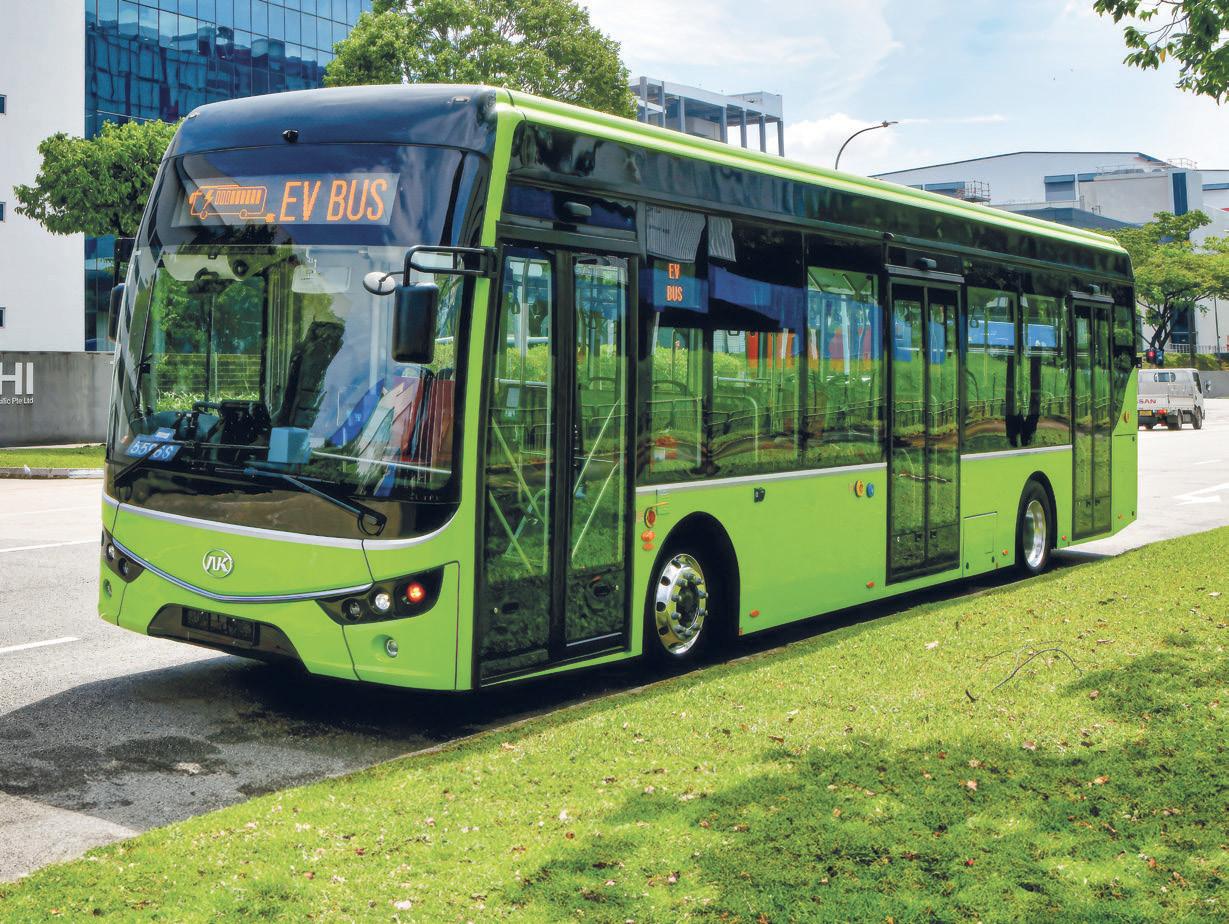
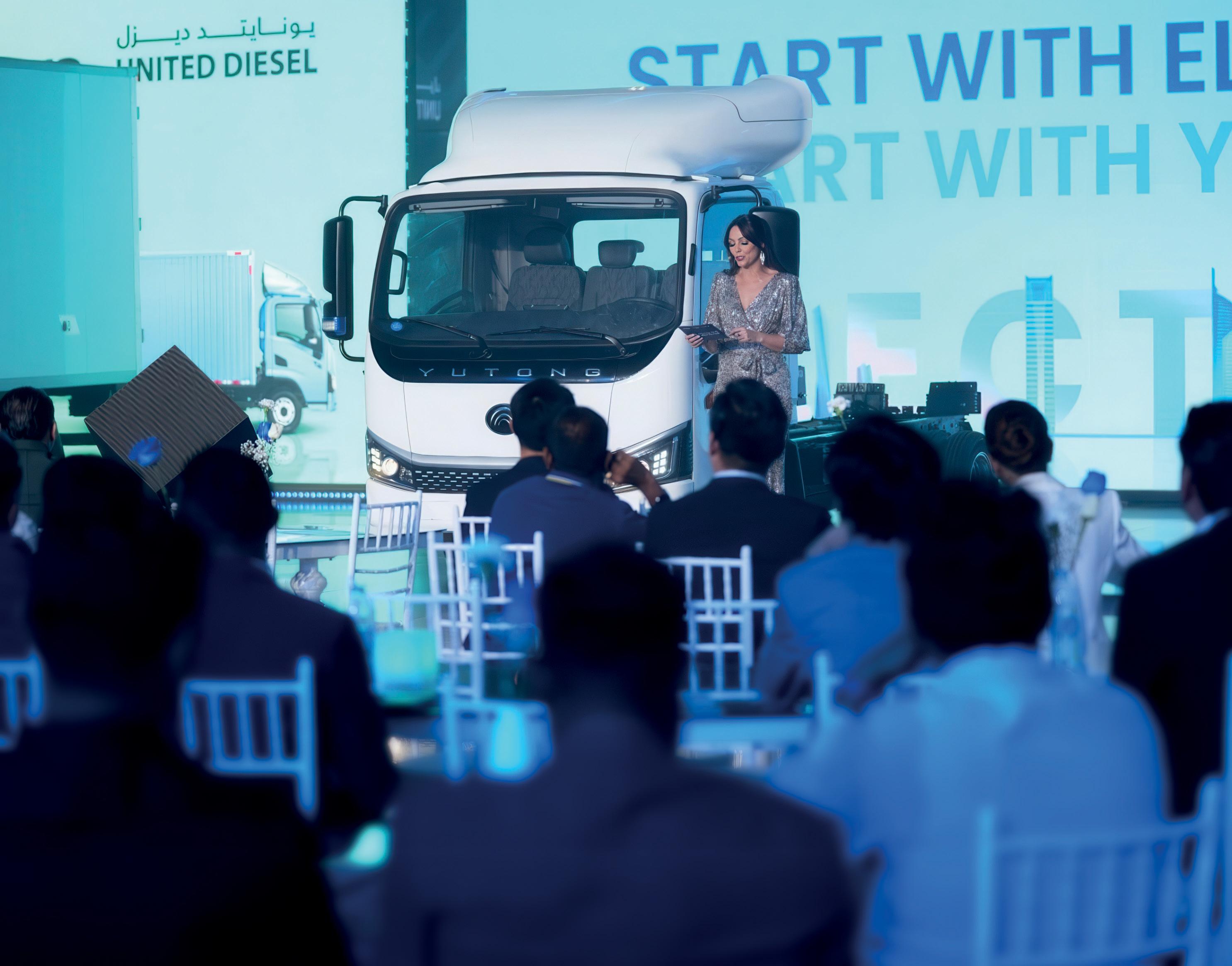
The UAE is accelerating its gradual push towards sustainable logistics, and the launch of Yutong Trucks’ TE2 and TE5 electric trucks, in collaboration with United Diesel, underscores the company’s offering for fleets taking their first steps into greener mobility. This event was also an opportunity to highlight the potential of these new energy vehicles, the transformative market dynamics they can address, and the significant role United Diesel wants to play in reshaping the logistics landscape.
During the event, Muneeb Saeed,
Marketing Manager of United Diesel, emphasised an urgent need for change.
“Transportation contributes 21% of the UAE’s greenhouse gases, with commercial vehicles responsible for 60% of those emissions despite making up only 20% of the vehicle population. This imbalance is driven by the heavy-duty nature of trucks, which operate longer hours and consume significantly more fuel,” Saeed explained.
“It’s clear that commercial vehicles must be part of the solution if we are to achieve the UAE’s ambitious net-zero goals by 2050.”
Saeed pointed out that the UAE’s world-class infrastructure, advanced road
This offer is about encouraging businesses to take the first step towards electric”
networks, and government incentives provide the perfect platform for integrating green solutions like electric trucks. These vehicles are not just about meeting sustainability goals—they’re also about transforming operational efficiency in logistics.
At the heart of this transformation are the TE2 and TE5 trucks, designed to meet the demands of UAE logistics while addressing environmental challenges.
The TE2 is optimized for last-mile delivery, offering a range of 200–220 kilometres per charge and a payload capacity of two tonnes. With its compact design and an industry-leading turning diameter of


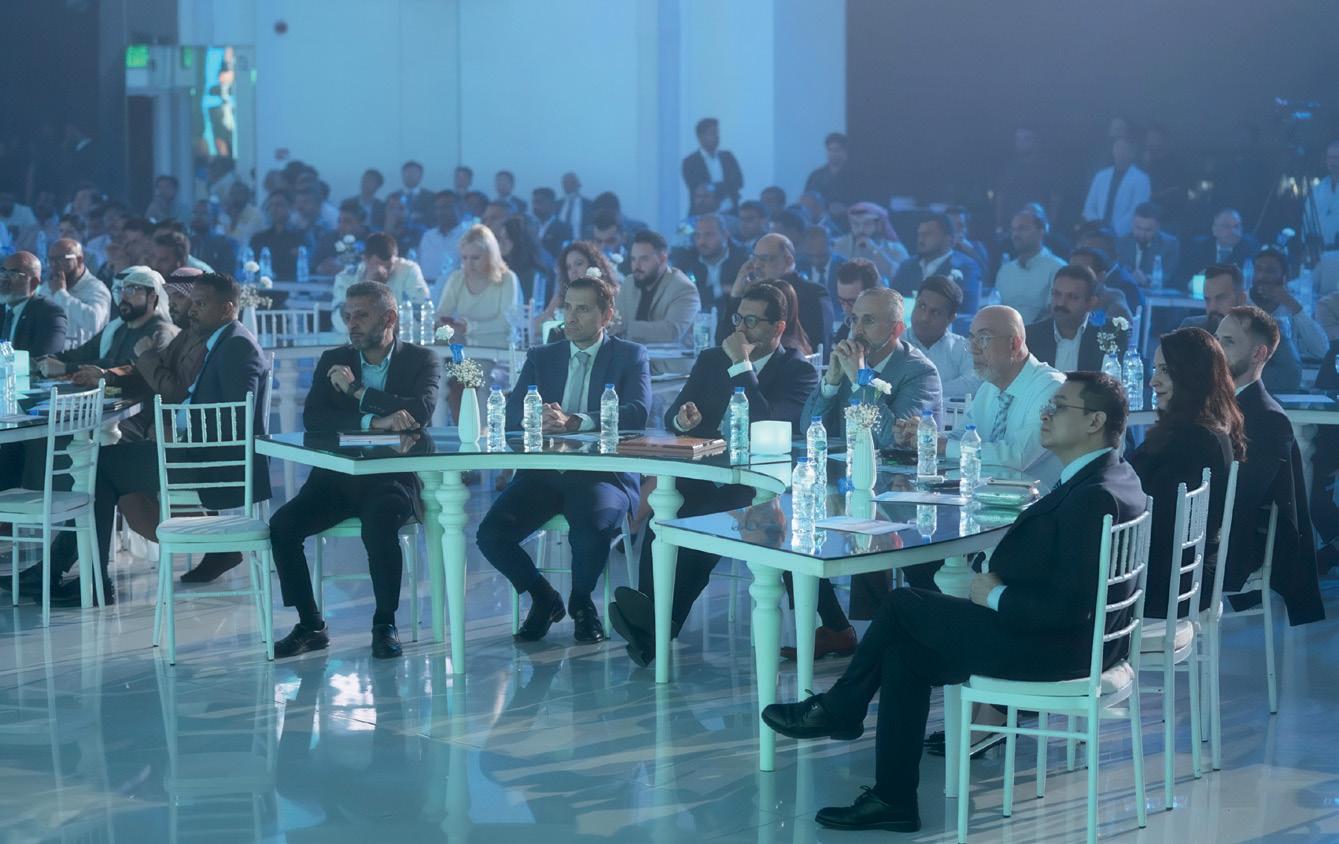
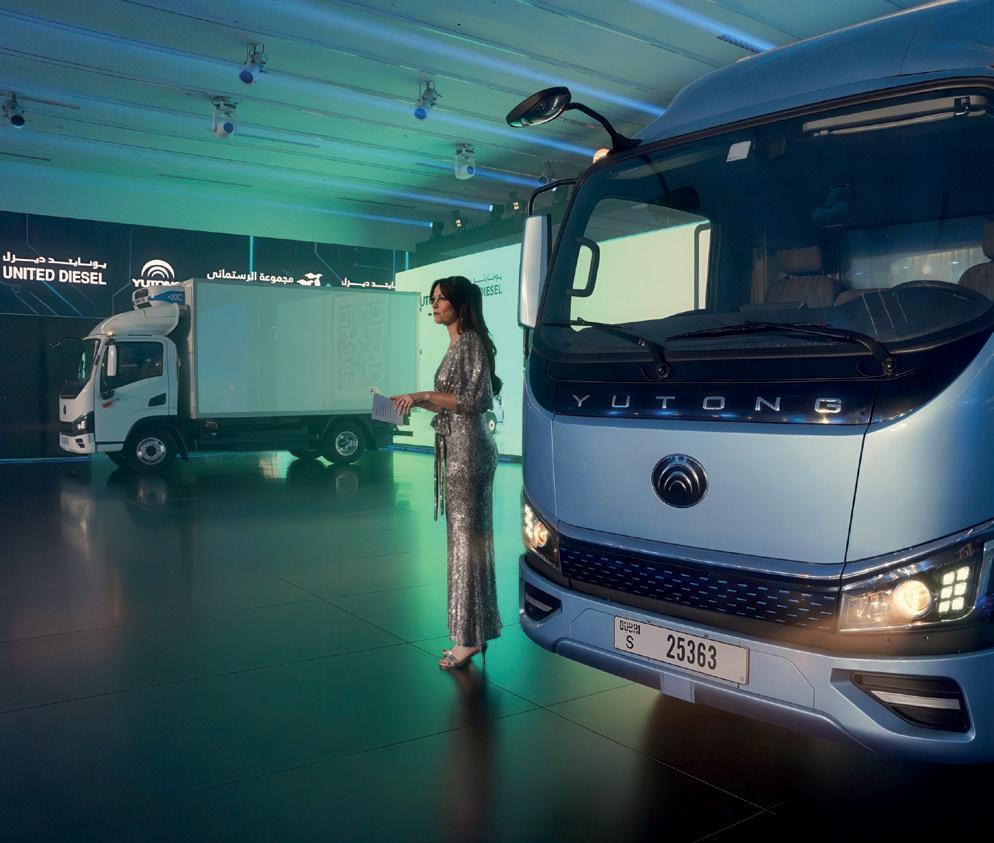
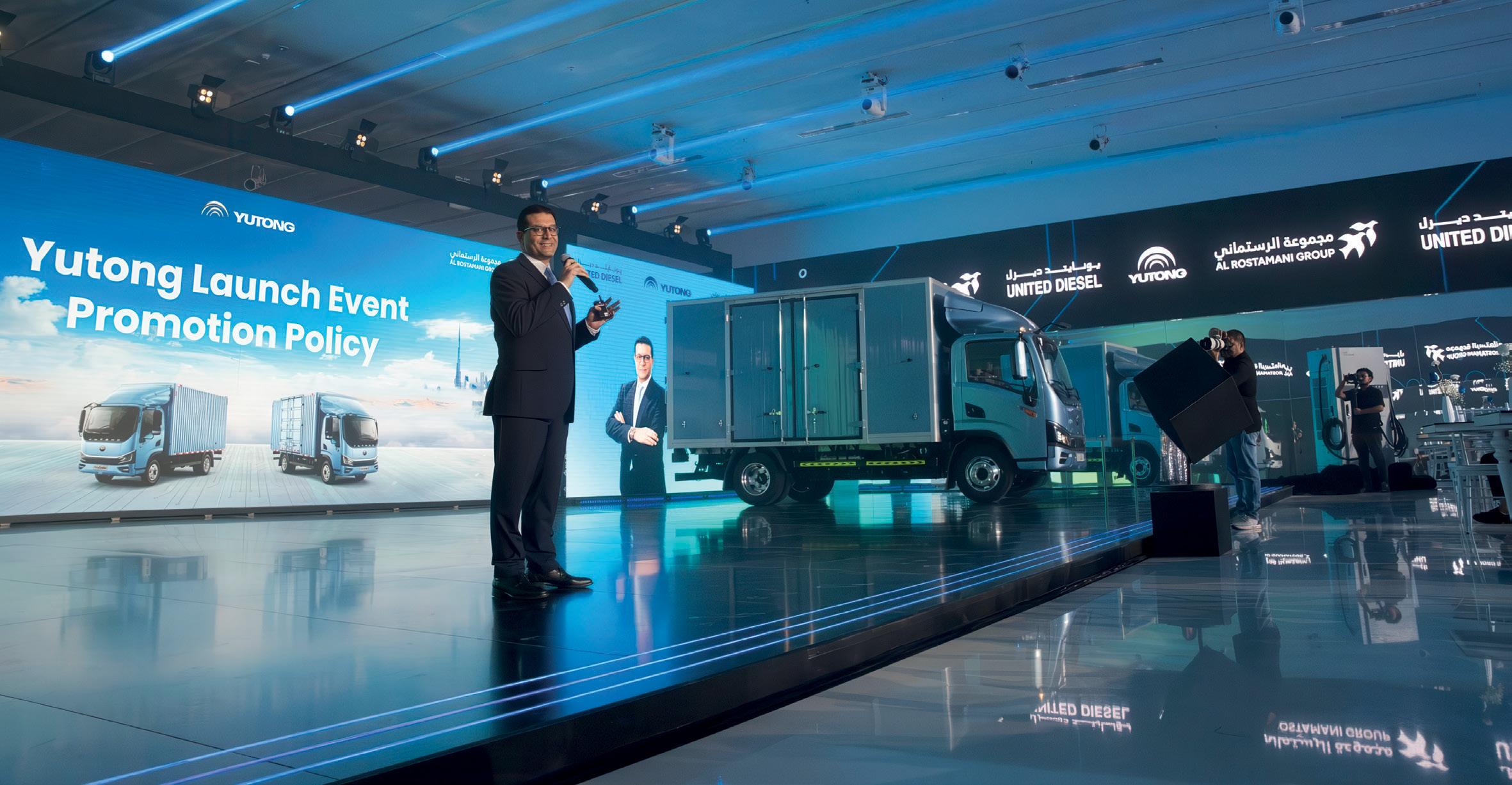
11.5 metres, it is ideal for navigating tight urban spaces. Meanwhile, the TE5 caters to heavier logistical needs, boasting a range of 270–290 kilometres and a four-tonne payload capacity. It is perfectly suited for warehouseto-warehouse transport and inter-city logistics, ensuring seamless operations on longer routes. Both models are equipped with cutting-edge lithium-ion batteries capable of fast charging from 20% to 100% in just 60 minutes. To address range anxiety and the UAE’s harsh climate, Yutong has incorporated advanced cooling systems that ensure optimal battery performance even in extreme summer conditions. In addition,
It’s a way to showcase how these trucks can transform their operations”
the trucks are supported by Yutong’s Electric Architecture (YEA), an innovative system that integrates hardware and software to constantly learn and adapt based on data collected from global operations. These vehicles also prioritise safety and energy efficiency. Features such as battery armor, anti-collision shields, and real-time monitoring ensure reliability under the most challenging conditions. The trucks also outperform industry standards in energy management, offering a 15% higher driving range thanks to lightweight components like e-axles and streamlined energy recovery systems. They even provide advanced
refrigerated storage capabilities, enabling temperatures as low as -20°C in under two hours, making them invaluable for sectors like pharmaceuticals and frozen food logistics.
To celebrate the launch, United Diesel announced a compelling offer for early adopters. Buyers of the first 30 units will receive six months of complimentary value-added services, which include maintenance and roadside assistance. Additionally, customers will benefit from a free 12-month subscription to the V-Plus fleet monitoring system, an advanced tool
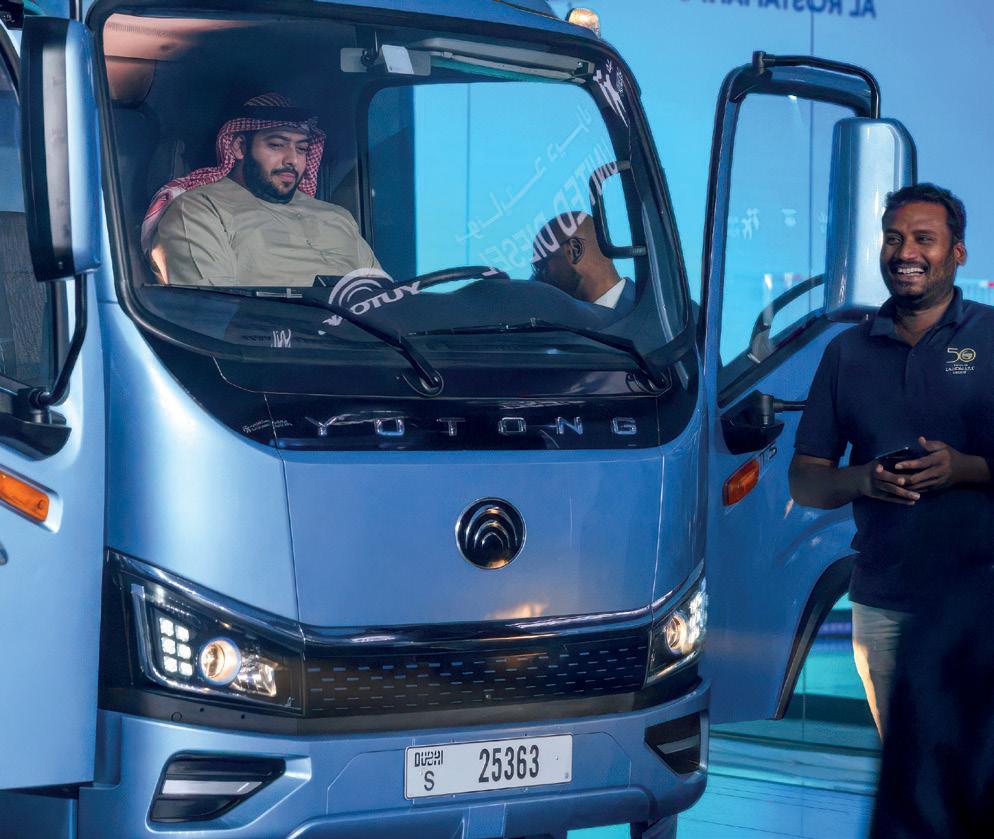
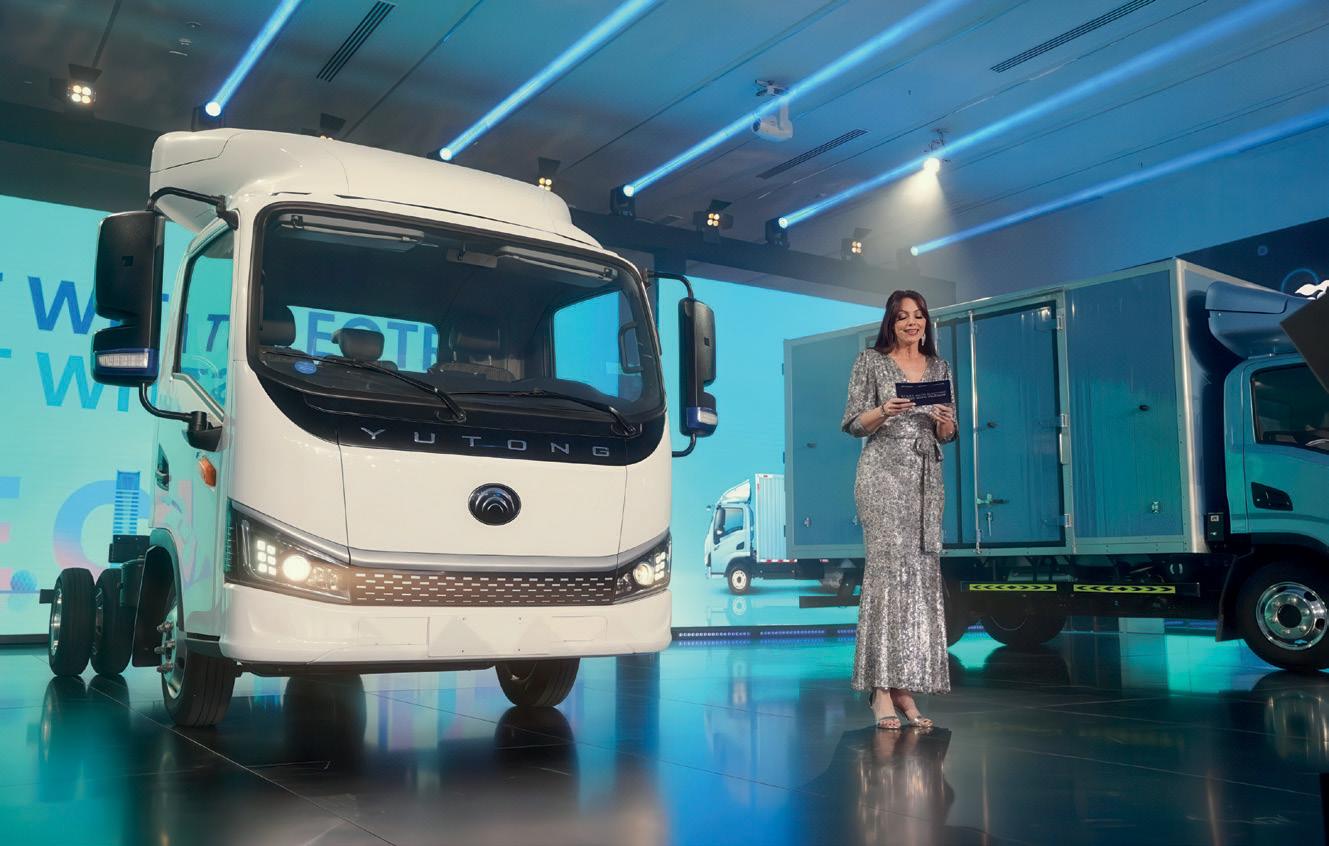
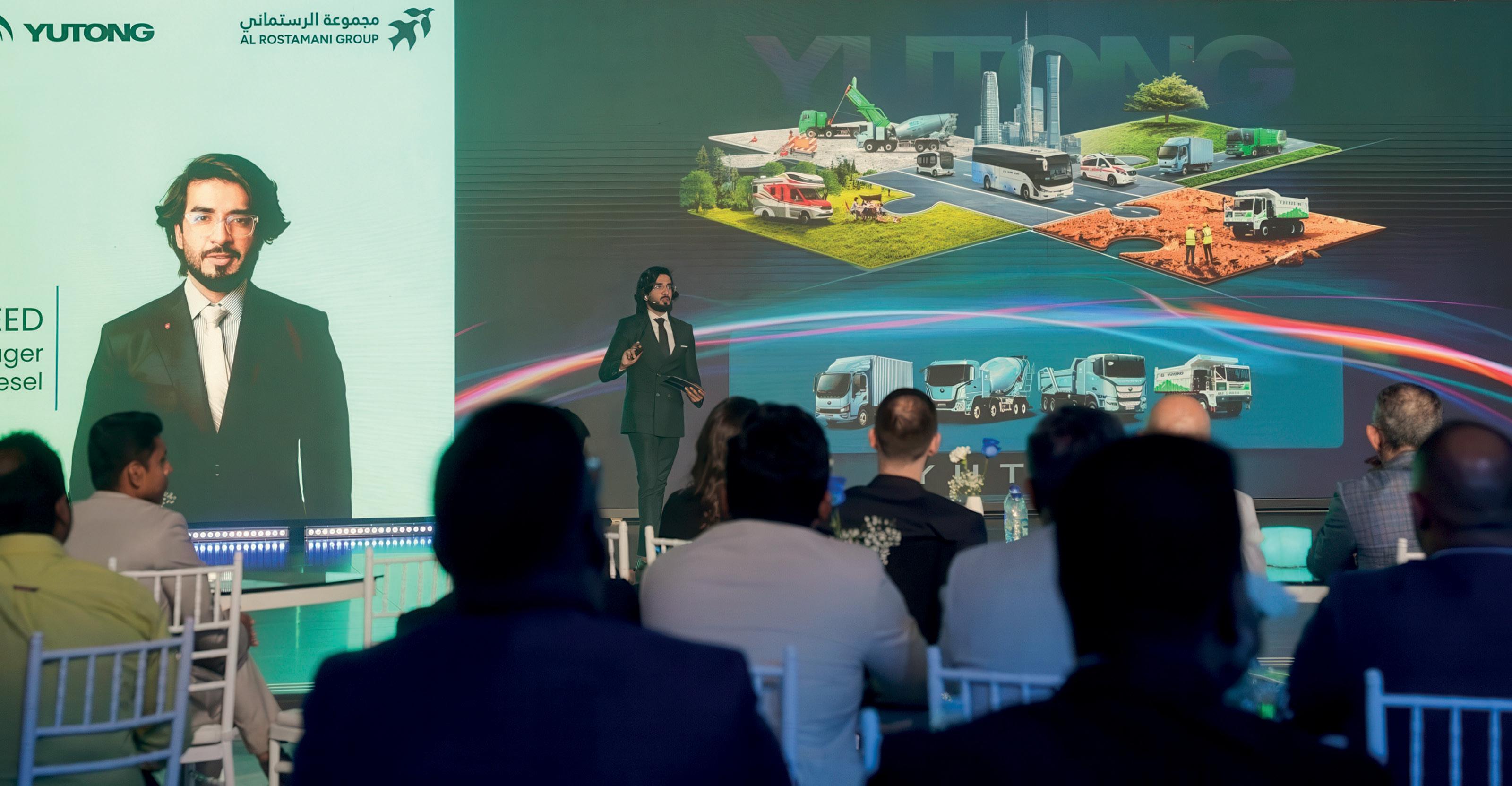
that tracks vehicle performance, optimises routes, and enhances operational safety.
The trucks are also compatible with Yutong’s proprietary 120 kW charging infrastructure, which ensures minimal downtime with onehour charging. This exclusive deal removes many of the barriers businesses might face when transitioning to electric vehicles, underscoring United Diesel’s commitment to supporting the shift to greener logistics.
David Sawiras, General Manager of United Diesel, emphasised the importance of this initiative: “This offer is about encouraging businesses to take the first step toward adopting electric vehicles. It’s a way
The Yutong trucks seamlessly integrated into our operations”
to remove barriers and showcase how these trucks can transform their operations.”
The commercial vehicle market is undergoing a seismic shift, albeit more gradually than the passenger car sector. Saeed noted that while new electric passenger cars enter the market frequently, the commercial space has lagged due to the complexity of operations, longer hauls, and higher payload requirements. However, he argued that the technology is ready and adoption is accelerating.
This optimism was echoed by early adopters like TransMed, a global FMCG supply chain leader. Gulper Küçükkömürcü,
Sustainability Manager at TransMed, highlighted how the Yutong trucks aligned with the company’s sustainability strategy. “Our sustainability strategy prioritises reducing emissions and embracing alternative energy solutions,” she said. “The Yutong trucks seamlessly integrated into our operations, proving that sustainability and efficiency can coexist.”
The TE2 and TE5 trucks were meticulously designed to address the key challenges that have traditionally hindered the adoption of electric trucks in the UAE. Range
anxiety—a common concern for electric vehicles—has been mitigated by ensuring the trucks deliver robust mileage and can be recharged quickly. The advanced batteries have been tested to withstand temperatures of up to 1,300°C, making them highly durable in the UAE’s hot climate. Sealed systems protect against dust and water ingress, further enhancing reliability.
Safety is another key focus, with features like shorter braking distances, battery thermal management systems, and liquid cooling technology ensuring stable and secure operations. The inclusion of real-time monitoring systems also provides
It’s clear that commercial vehicles must be part of the solution”
peace of mind to fleet operators, enabling proactive maintenance and reducing the risk of unexpected breakdowns.
The TE2 and TE5 are just the beginning of what United Diesel and Yutong have planned for the UAE market. The partnership is poised to expand into heavy-duty and mining trucks, aiming to address broader segments of the logistics industry. This long-term vision reflects their belief in creating an ecosystem where sustainability is seamlessly integrated into operations without compromising quality or reliability.
“This launch represents our commitment to being responsible and
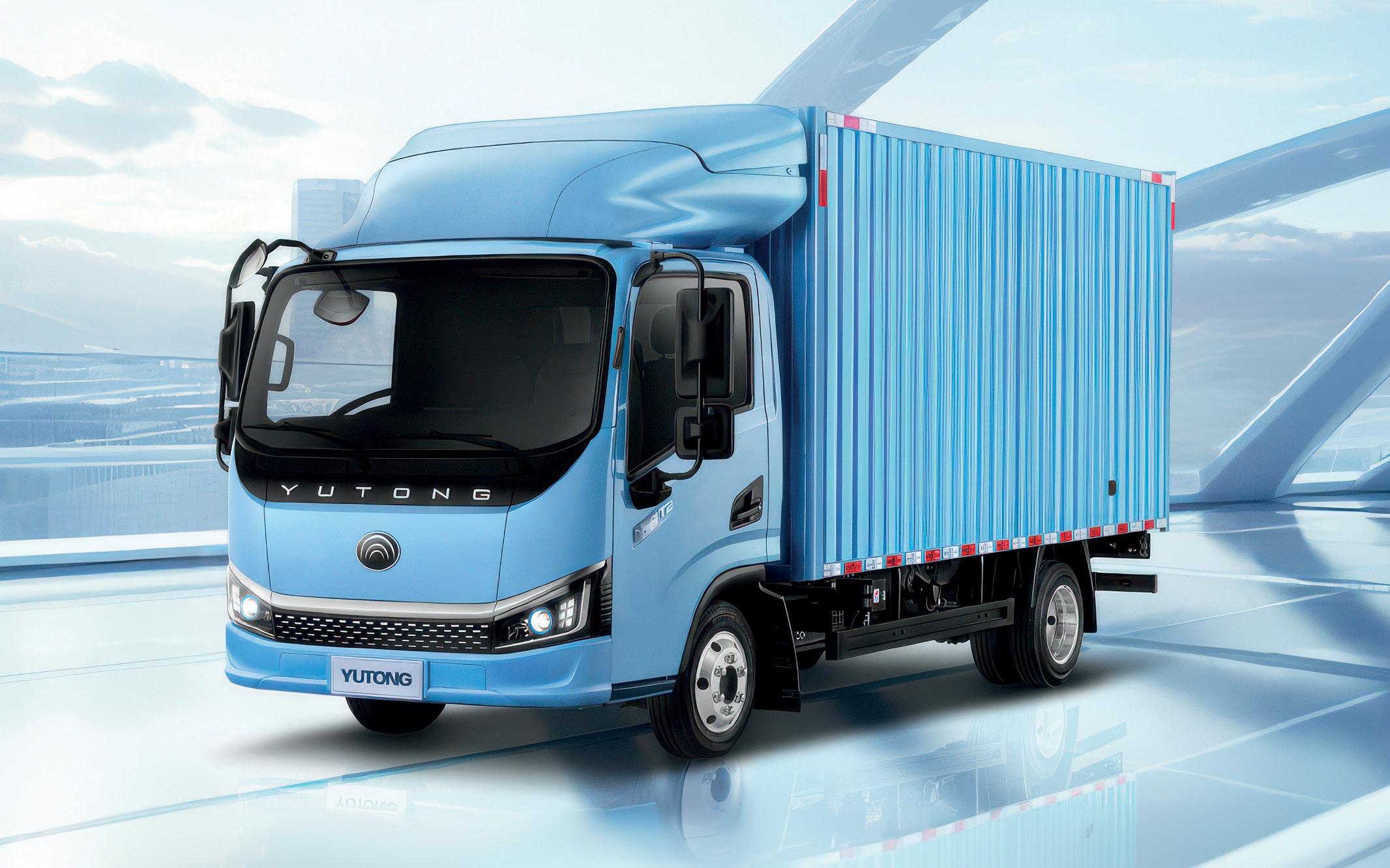
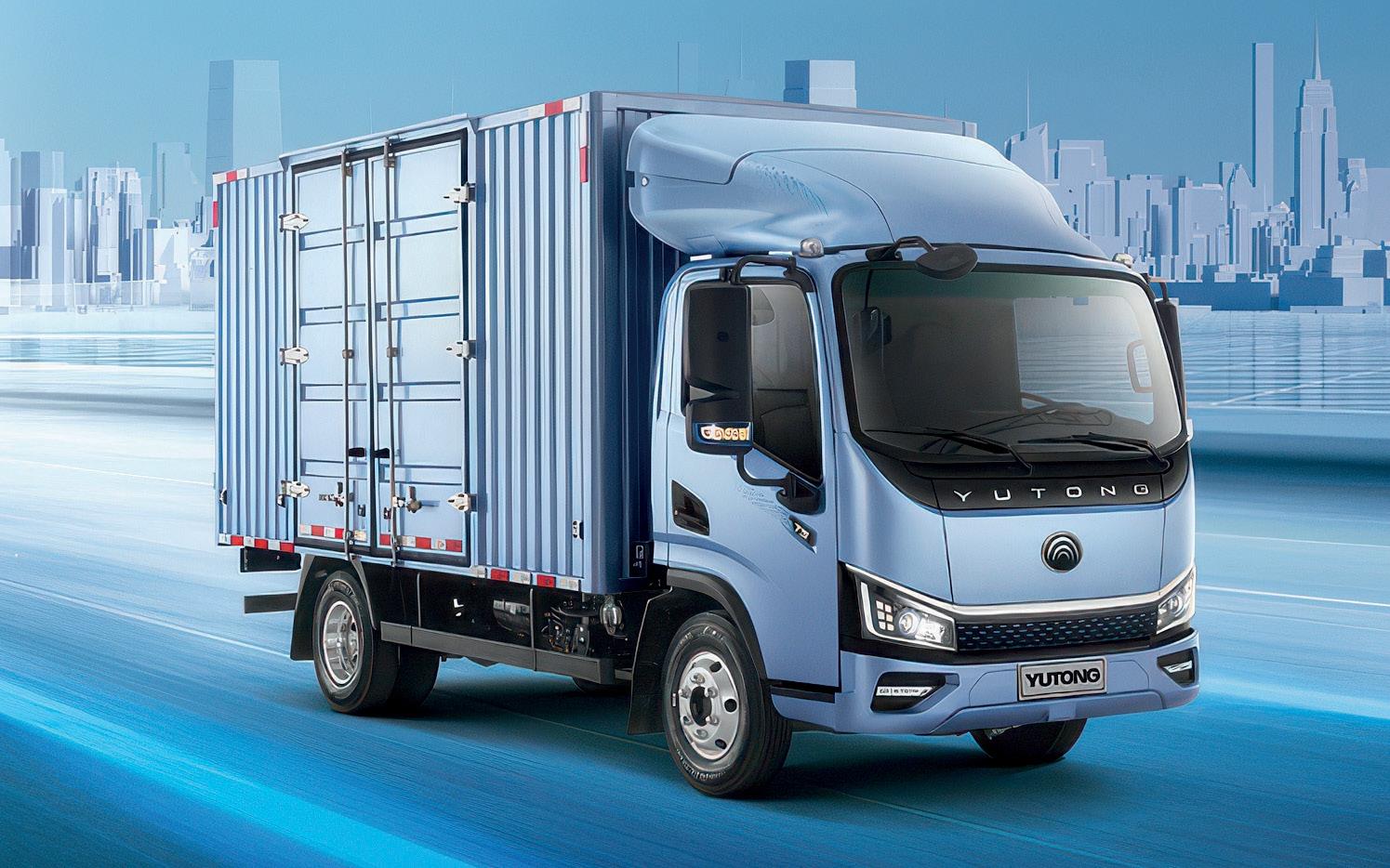
innovative,” Saeed concluded. “It’s about creating an ecosystem where green logistics is not just a goal but a reality.”
Yutong Trucks and United Diesel believe they have set a new benchmark for sustainable and affordable transportation in the UAE. With their new technology, tailored features, and compelling offers, the TE2 and TE5 are more than vehicles — they’re a statement of intent. As businesses like TransMed continue to adopt these solutions, the path toward a greener future are becoming increasingly clear for some fleets. Together, they’re placing themselves into a nascent era of greener logistics and mobility.
At the heart of this transformation are the TE2 and TE5 trucks, designed to meet the demands of UAE logistics while addressing environmental challenges. Here’s a closer look at their features:
TE2:
Range: 200–220 km per charge
Payload: 2 tonnes
Battery: A 77 kWh lithium-ion pack with fast charging capability (20%–100% in just 60 minutes)
Applications: Ideal for urban deliveries, navigating tight spaces with a leading 11.5m turning diameter
TE5: HEAVY-DUTY PERFORMER
Range: 270–290 km per charge
Payload: 4 tonnes
Battery: A robust 100 kWh lithium-ion pack with the same fast-charging technology
Applications: Suited for warehouseto-warehouse transport and intercity logistics, ensuring seamless operations on long routes
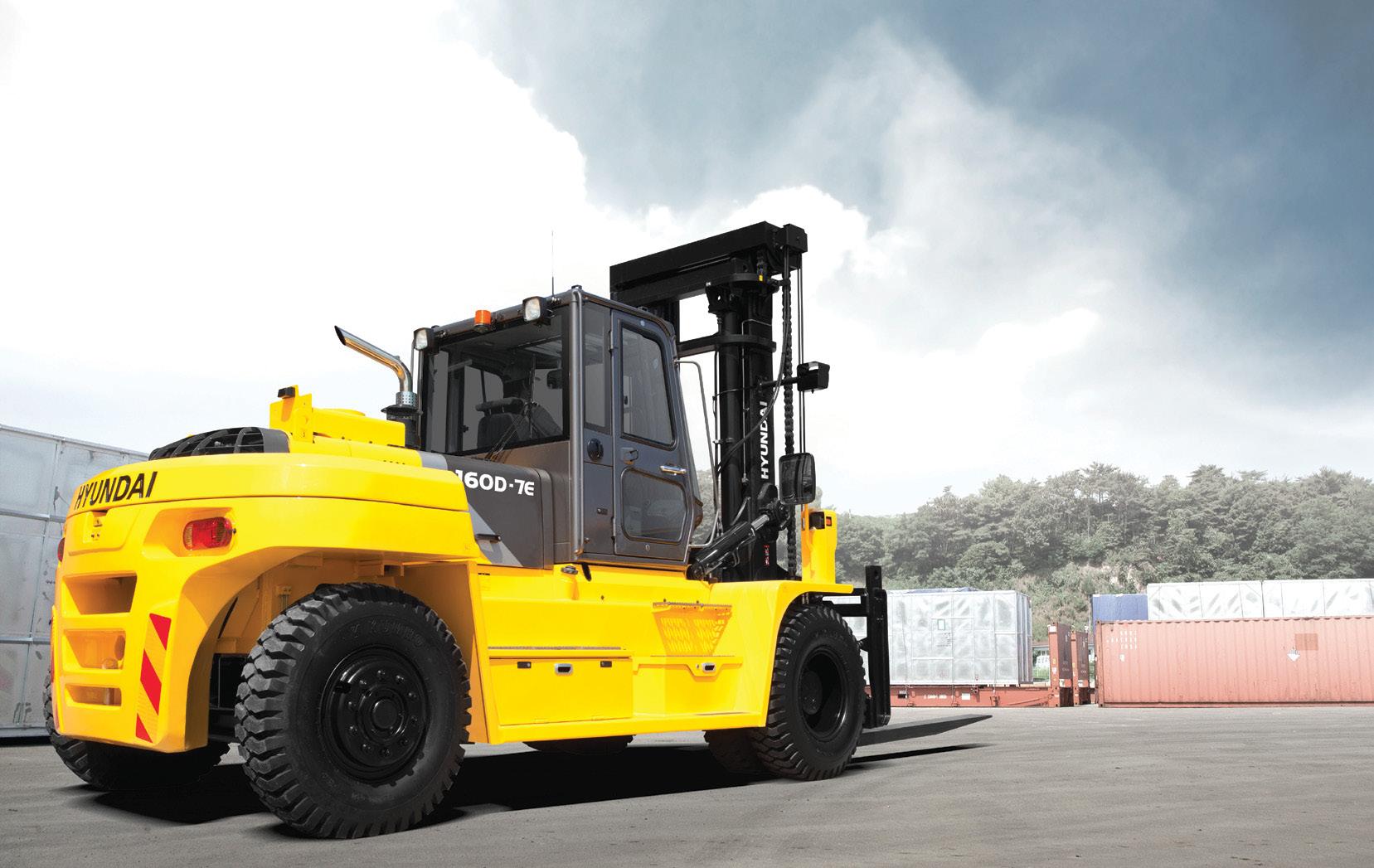
16 ton lifting capacity
Faster travel & lifting speeds
Maximum gradeability
Spacious cabin
Wider all-around visibility
High performance A/C
Low noise


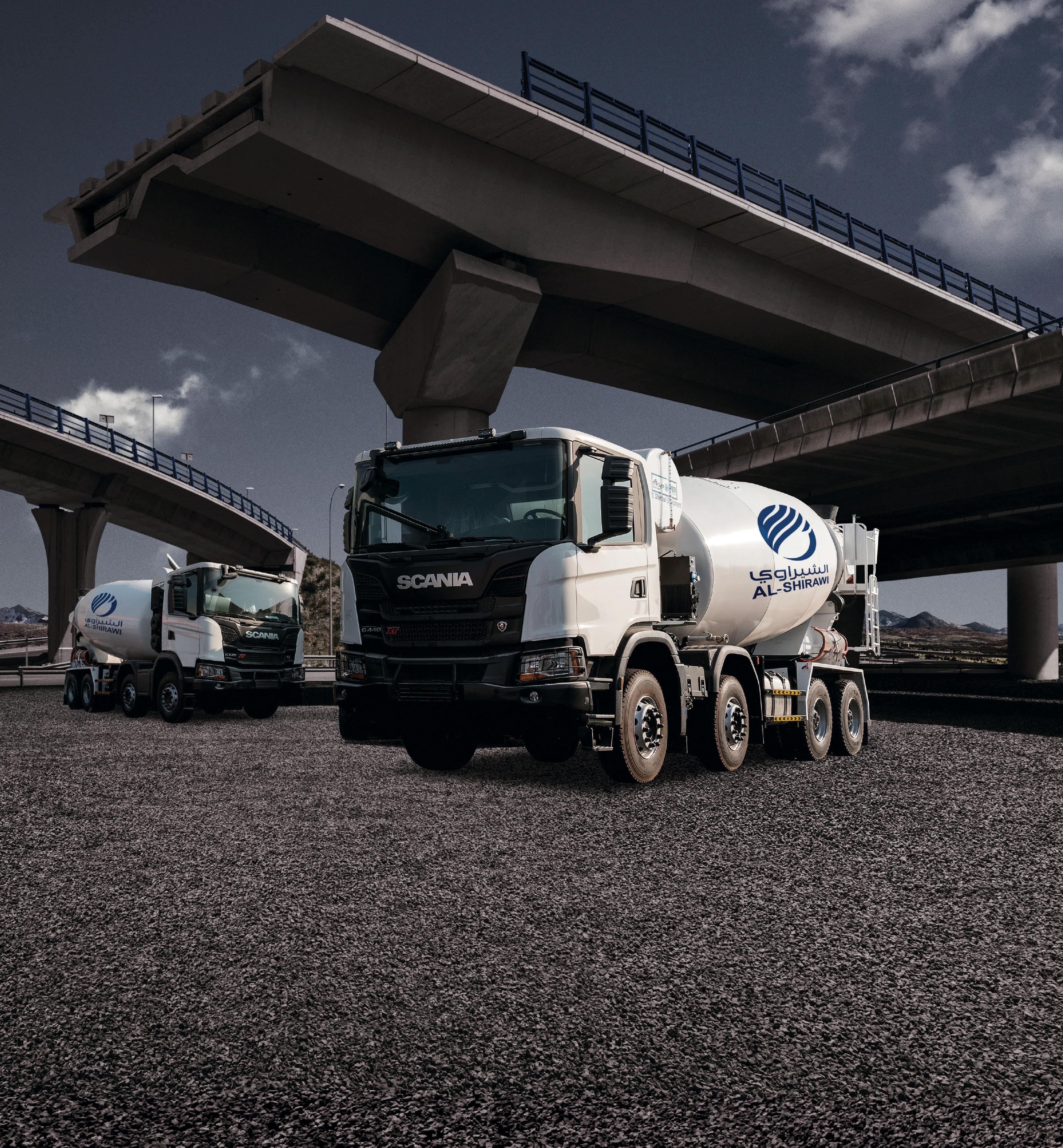
When it comes to meeting the demands of the UAE’s construction fleets, Scania Transit Mixers lead the way, says Sayed Ahbab, Deputy Director – Scania Truck Sales at Al Shirawi Enterprises

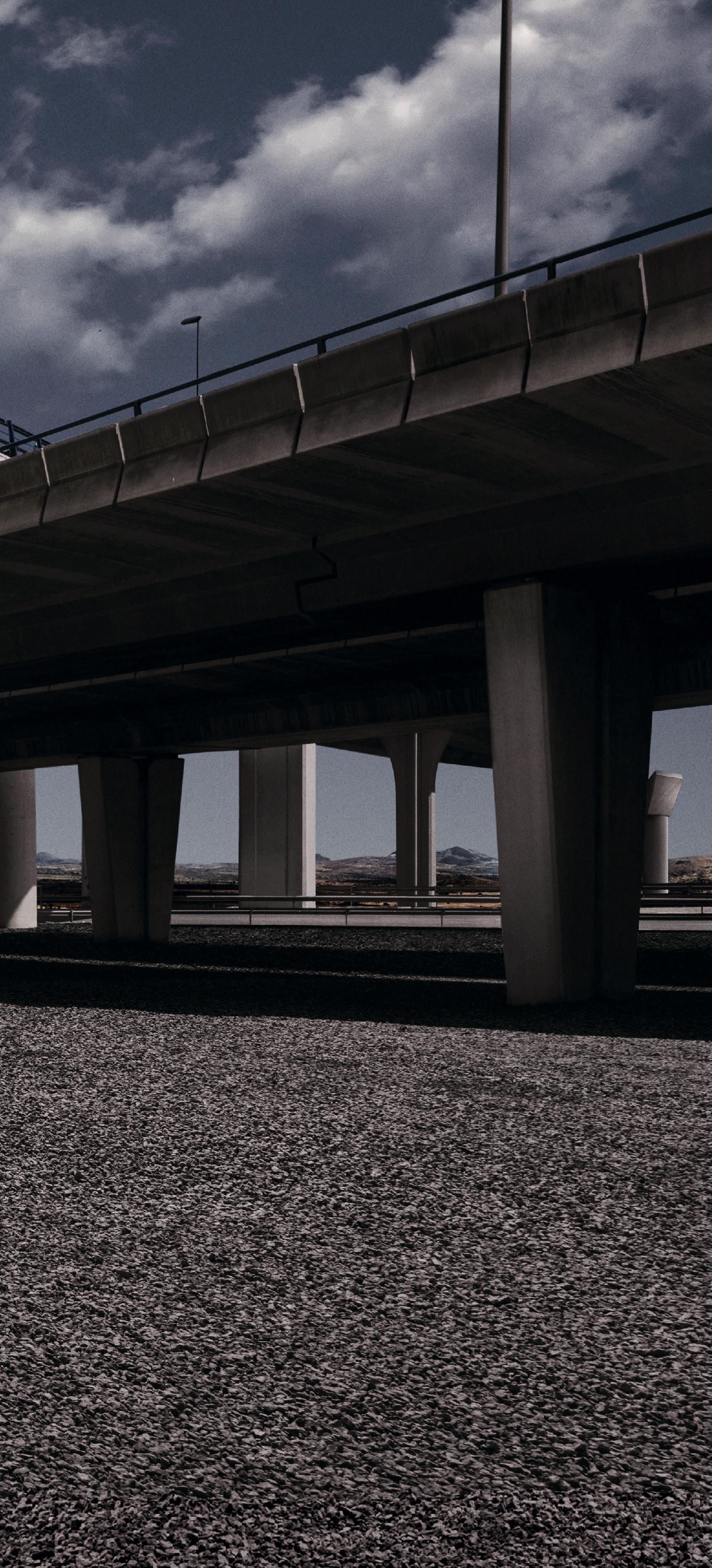
The UAE’s construction industry continues to defy expectations, maintaining consistent growth even as other markets remain sluggish. This growth has translated into a marked increase in truck sales across construction, logistics, and waste management sectors, underscoring the market’s expansion.
Sitting down with T&FME, Sayed Ahbab, Deputy Director – Scania Truck Sales at Al Shirawi Enterprises, explains how the UAE’s post-EXPO 2020 surge has been driven by a combination of investor confidence and government spending.
“This has led to a boom in real estate and tourism, attracting international investors, Government investments in major infrastructure projects, such as drainage systems, road networks, and bridges, have further fuelled this growth,” he begins. “Consequently, there’s been a significant rise in demand for commercial vehicles, with overall truck sales doubling from 2021 to 2024, particularly in sectors like construction, logistics, and waste management.”
The rapid urban development, fuelled by population growth and government-led infrastructure projects, has created supply chain bottlenecks for concrete, he explains.
“The rapid pace of development, driven by government investment, population growth, and the need for modern infrastructure, has placed a strain on traditional concrete suppliers, leading to supply bottlenecks and delays,” he says. “As a result, large construction companies are increasingly adopting a strategy of backward integration, investing in their own fleets of transit mixers and batching plants to ensure a more reliable and timely supply of concrete. This shift allows them to control quality, scheduling, and costs more effectively.”
While this is a big positive for Al Shirawi, the evolving emissions regulations in the UAE mean that the company has also had to continually evolve its transit mixer offering to keep pace.
“Al Shirawi, in partnership with Scania, recognises the UAE’s pioneering role in vehicular emission regulations and its commitment to carbon reduction. While the UAE has adopted Euro 4 standards, our transit mixer offerings, utilising Scania chassis, are built to Euro 5 standards.
This ensures that our mixers operate with significantly reduced emissions, supporting a more sustainable environment.”
He continues: “Sustainability and fuel efficiency have always been the cornerstone of our vehicles, which is why our loyal customers continue to choose Scania. Many new customers come to us through referrals from existing clients, who share how Scania has significantly improved their company’s operational efficiency by reducing their costs. We understand that awareness and tangible results are crucial to our customers, and we are committed to showcasing the real-world benefits Scania delivers.”
While the strong growth in the UAE construction industry is creating high demand for transit mixers, Ahbab tells T&FME that Al Shirawi recognises potential supply chain challenges, “particularly concerning the timely delivery of chassis and mixer drums. To ensure uninterrupted service for our customers, we have taken proactive steps, including securing advance orders and production slots with key suppliers.”
Many fleet owners are drawn to Scania because of its reputation for low fuel consumption and reliable performance. According to Ahbab, existing customers often recommend Scania to others, emphasising the operational efficiencies and cost savings they’ve experienced.
“Scania transit mixers are renowned for their exceptional fuel efficiency, durability, driver comfort, safety, and reliable service support. The Scania G440 stands out as a top choice for heavy-duty applications, specifically designed to excel in continuous mixer operations under the challenging dusty environments and extreme climate of the UAE. Equipped with a 440 HP Euro 5 diesel engine, it delivers high torque at low RPMs, ensuring superior performance and reliability in demanding conditions.”
Driver feedback plays a vital role in shaping the Scania’s products available through Al Shirawi. “Insights from drivers help us refine features like cabin ergonomics, visibility, and control systems,” he says. Market trends, such as the growing demand for larger mixers—like the 12 cbm model on an 8x4 chassis — also inform Scania’s development efforts. “Driver comfort and safety have become primary considerations for our customers, and we remain committed to meeting these expectations.”
The technological edge of Scania’s offerings is another standout feature.
The new Scania SUPER powertrain introduces groundbreaking innovations, including an 8% improvement in fuel economy, thanks to its efficient 13-litre engine and Twin SCR system for superior emissions control:
“The Scania SUPER powertrain is designed to meet both current and future emissions standards, ensuring long-term sustainability. The powertrain also supports low-emission fuels like HVO and biodiesel, contributing to decarbonisation efforts,” Ahbab adds. “Advanced features like the Scania Opticruise gearbox also allow for smooth and efficient gear shifts. The powertrain’s industry-leading emissions control and fuel efficiency not only benefit business operations but also play a crucial role in reducing greenhouse gas emissions.
“Overall, the Scania SUPER powertrain integrates advanced features and technologies that enhance fuel efficiency,
emissions control, performance, and sustainability, making it a leading choice for heavy-duty operations in the Middle East.”
At Al Shirawi, customer feedback is also crucial in refining products and has played its part in influencing Scania’s transit mixer design.
“Customer feedback is the cornerstone of our truck design process. It provides valuable insights from drivers on key aspects like cabin ergonomics, visibility, and control systems, enabling us to enhance comfort and safety features for an improved driving experience,” he explains.
Feedback also helps Al Shirawi understand operational challenges, such as navigating extreme climates, handling rough terrains, or meeting specific load requirements, “ensuring our mixers are customised to address these needs,” he says.
“Additionally, customer feedback keeps us aligned with market trends.
For instance, while 9 cbm mixers on 6x4 chassis were popular a few years ago,
Scania transit mixers are renowned for their exceptional fuel efficiency, durability, driver comfort, safety, and reliable service support”
the demand has now shifted to 12 cbm mixers on 8x4 chassis. Today, driver comfort and safety have become primary considerations for our customers, and we remain committed to meeting these evolving expectations through innovative and customer-focused designs.”
According to Ahbab, the Scania Transit Mixer offering at Al Shirawi leads the market with the combination of efficient and durable trucks aligned with comprehensive after-sales support.
“Scania Transit Mixers offer a significant advantage over competitors regarding efficiency, performance, and total cost of ownership (TCO). Scania has long been known for fuel efficiency, and the new Scania Super powertrain takes this even further with an impressive 8%, and this, combined with Al Shirawi’s strategically located workshops throughout the UAE and 24-hour service support, minimises downtime and further enhances the TCO for customers.”
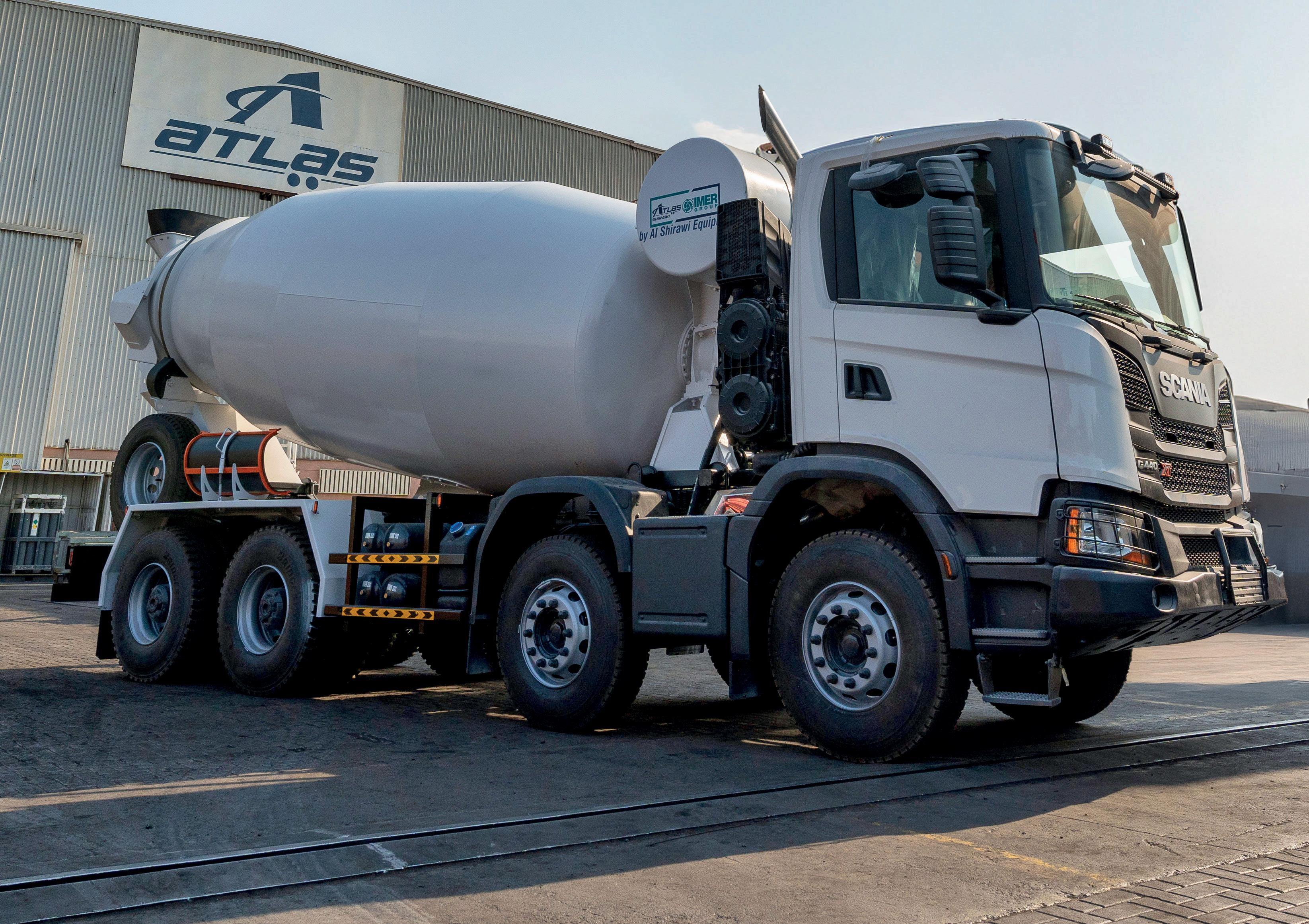
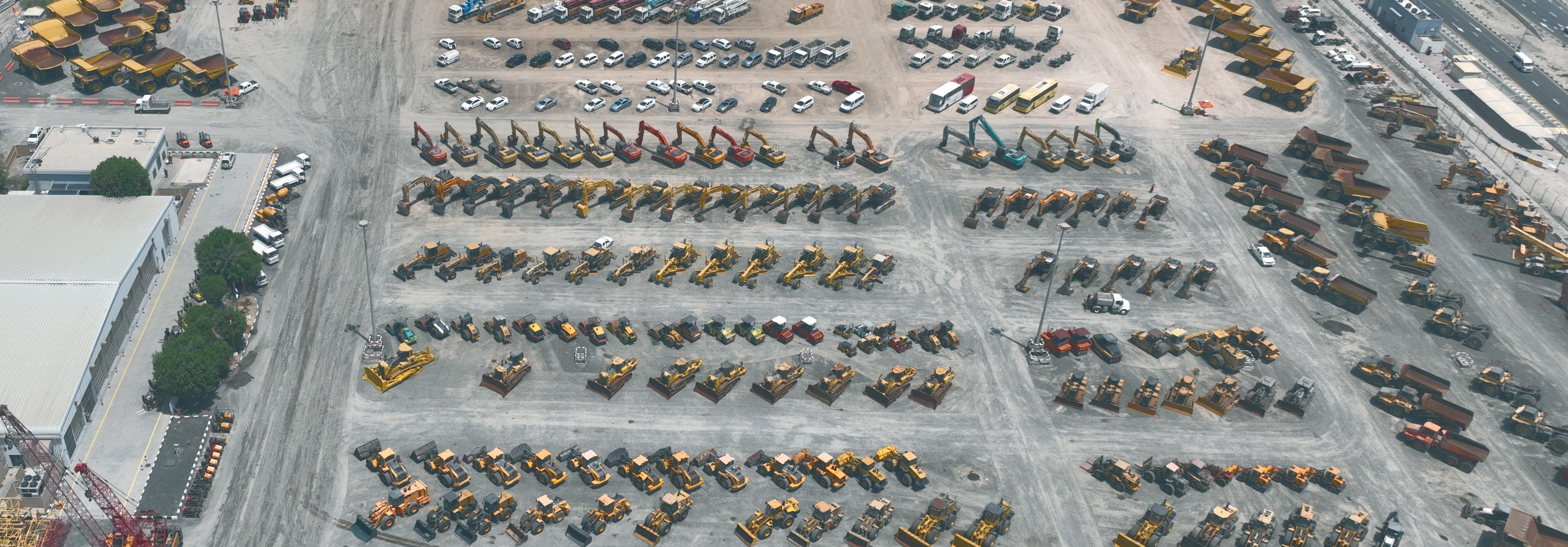
Dubai Unreserved Auction24-25 February 2025
Online bidding starts: 18 February at 2pm Viewing Days: 19-23 February 8am-5pm Address: Junction 9 - Gate 8 - Jebel Ali Free zoneDubai - UAE Register to bid online
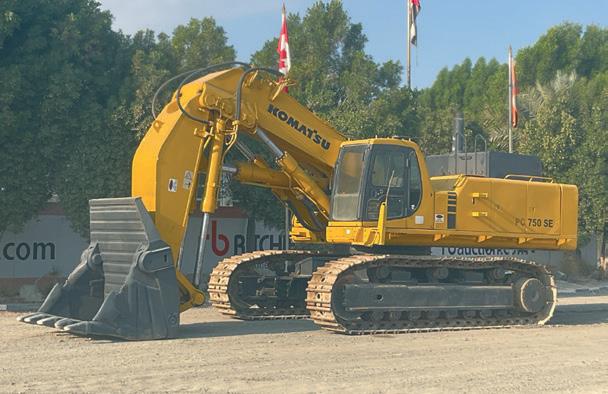
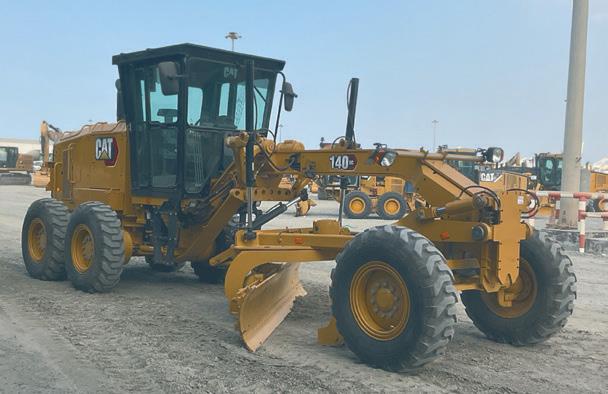
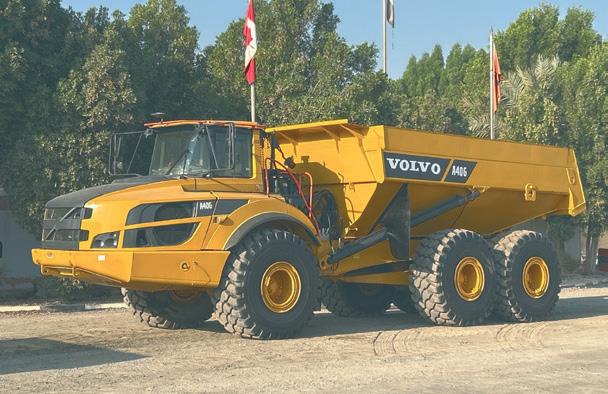
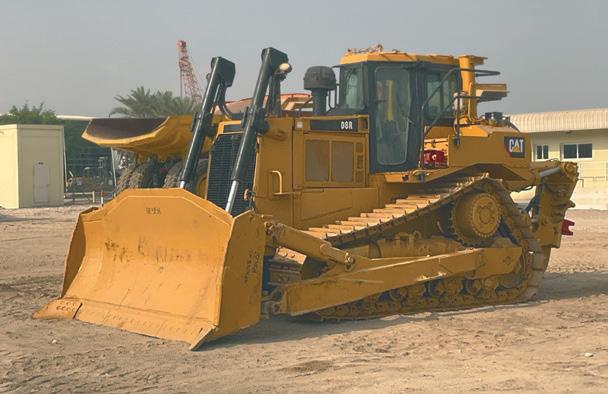

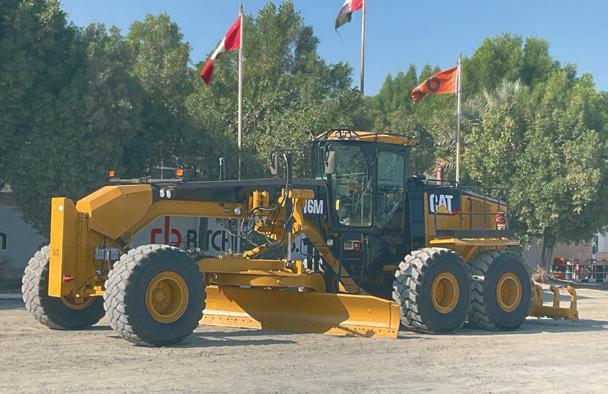
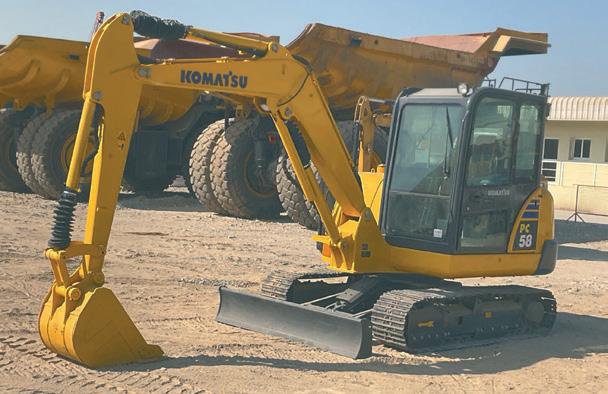
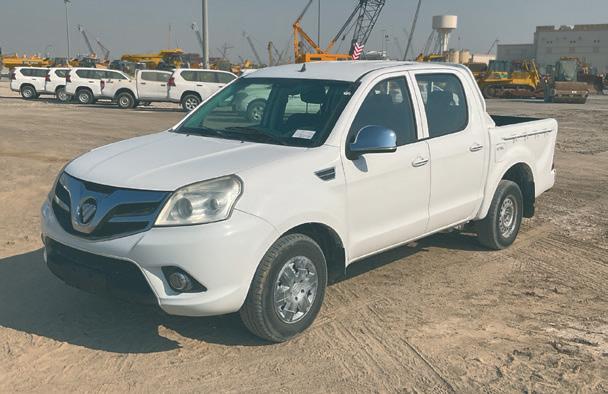
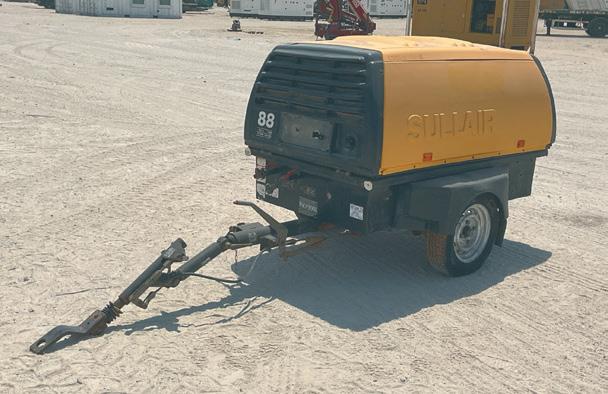
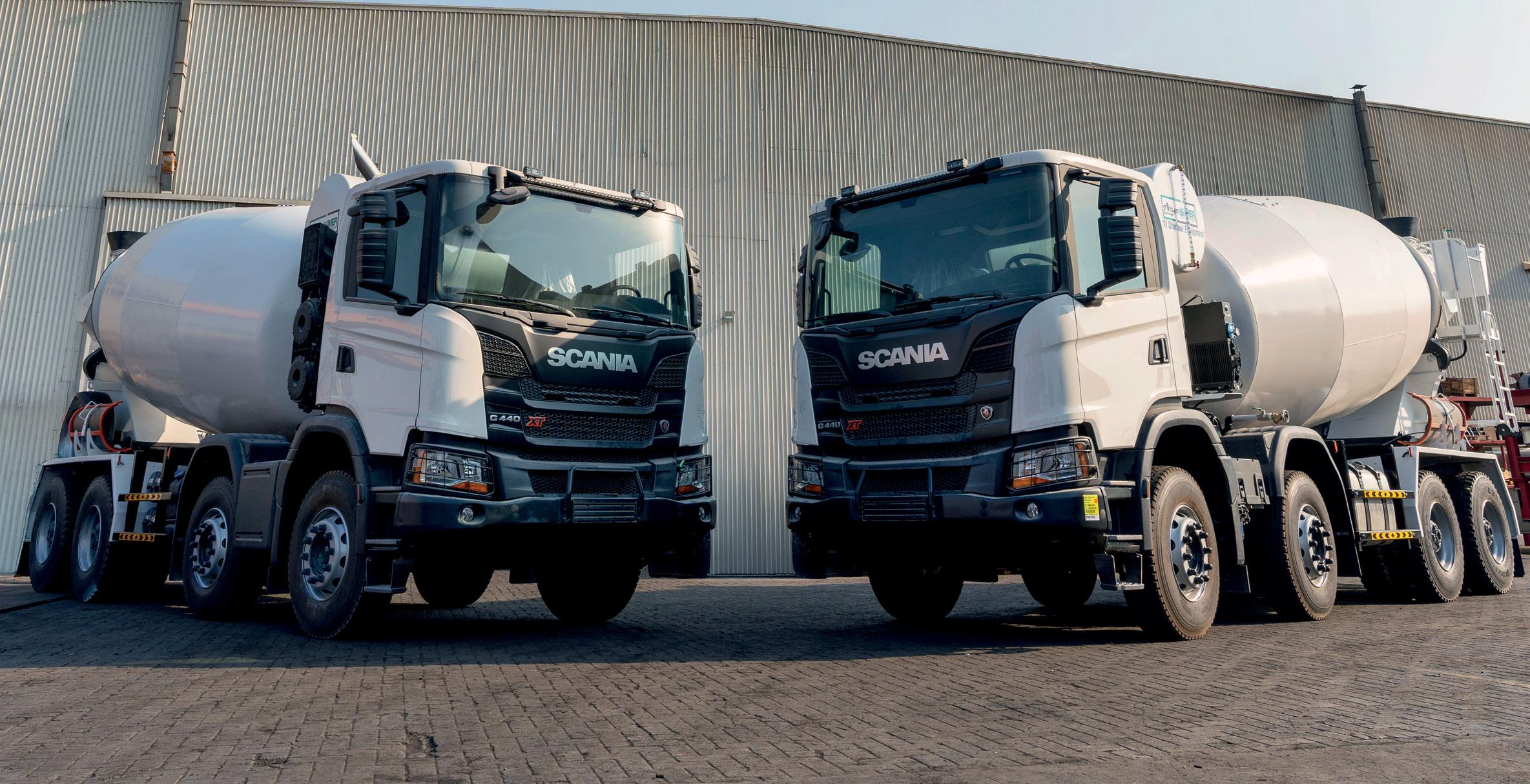
To ensure that its customers get the most from their Scania Transit Mixers, Al Shirawi has implemented a comprehensive after-sales support strategy. This approach is designed to minimize downtime and optimise fleet performance, a crucial factor in the demanding construction market.
“We offer tailored after-sales support packages, encompassing comprehensive repair and maintenance contracts and extended warranties to meet specific customer needs,” explains Ahbab. Leveraging the SCANIA Fleet Management System, Al Shirawi enables customers to plan vehicle maintenance proactively, ensuring uptime and minimizing disruptions.
The company also emphasizes the importance of skilled operation.
“Our dedicated Driver Coaching and Follow-up programme provides continuous training for SCANIA drivers, promoting efficient driving practices and preventative maintenance,” Ahbab adds.
To further reduce downtime, Al Shirawi maintains one of the highest spare parts availabilities in the industry. This is complemented by a network of strategically located service outlets and ful-ly equipped mobile service units, providing on-site assistance and further maximizing customer uptime.
Beyond its standard Scania Transit
We understand that awareness and tangible results are crucial to our customers, and we are committed to showcasing the real-world benefits Scania delivers”
Mixer offerings, Al Shirawi provides a range of chassis and mixer configurations to suit diverse fleet requirements. “We offer chassis suitable for concrete mixer configurations ranging from 9 to 14 cubic meters. Additionally, we partner with leading mixer manufacturers to provide complete truck and mixer solutions,” says Ahbab.
The company is also pushing innovation forward, currently developing a combined transit mixer and concrete pump on a single chassis. This solution is designed to offer even greater versatility, catering to customers involved in complex and large-scale construction projects.
With the launch of the Scania SUPER powertrain, Al Shirawi is introducing even greater customization to its transit mixers. This expanded range includes new engines, gearboxes, and PTOs (Power Take-Offs) to tailor solutions more precisely to individual customer needs.
“The new SCANIA SUPER PTOs deliver higher torque, which is crucial for operating heavier mixers,” explains Ahbab. This advancement is expected to enhance performance in the challenging environments where Scania transit mixers excel.
Global supply chain disruptions have presented challenges for the heavy equipment sector, but Al Shirawi has taken a proactive approach to maintain
consistent availability of products and parts.
“By leveraging advanced technology, we forecast demand for spare parts, enabling us to maintain higher availability and mitigate potential delays caused by global supply chain issues,” Ahbab says. This forwardthinking inventory management ensures that products are readily available to meet local demand, despite external challenges.
Looking ahead, Ahbab sees significant growth opportunities for transit mixers, particularly in the UAE and Saudi Arabia, where large-scale construction projects are fuelling demand.
“The transit mixer market is poised for significant growth, especially in the 12 cubic meter mixer segment, which is projected to grow by more than 15%. This segment offers the versatility and efficiency required for a wide range of construction applications,” he notes.
Ahbab concludes, “At Al Shirawi, we are committed to providing our customers with the best possible transit mixer solutions. By partnering with Scania, a global leader in heavy-duty vehicles, we offer transit mixers renowned for their fuel efficiency, durability, and performance. With our comprehensive after-sales service and a strong focus on innovation and customer satisfaction, Al Shirawi is well-positioned to continue leading the transit mixer market in the UAE.”
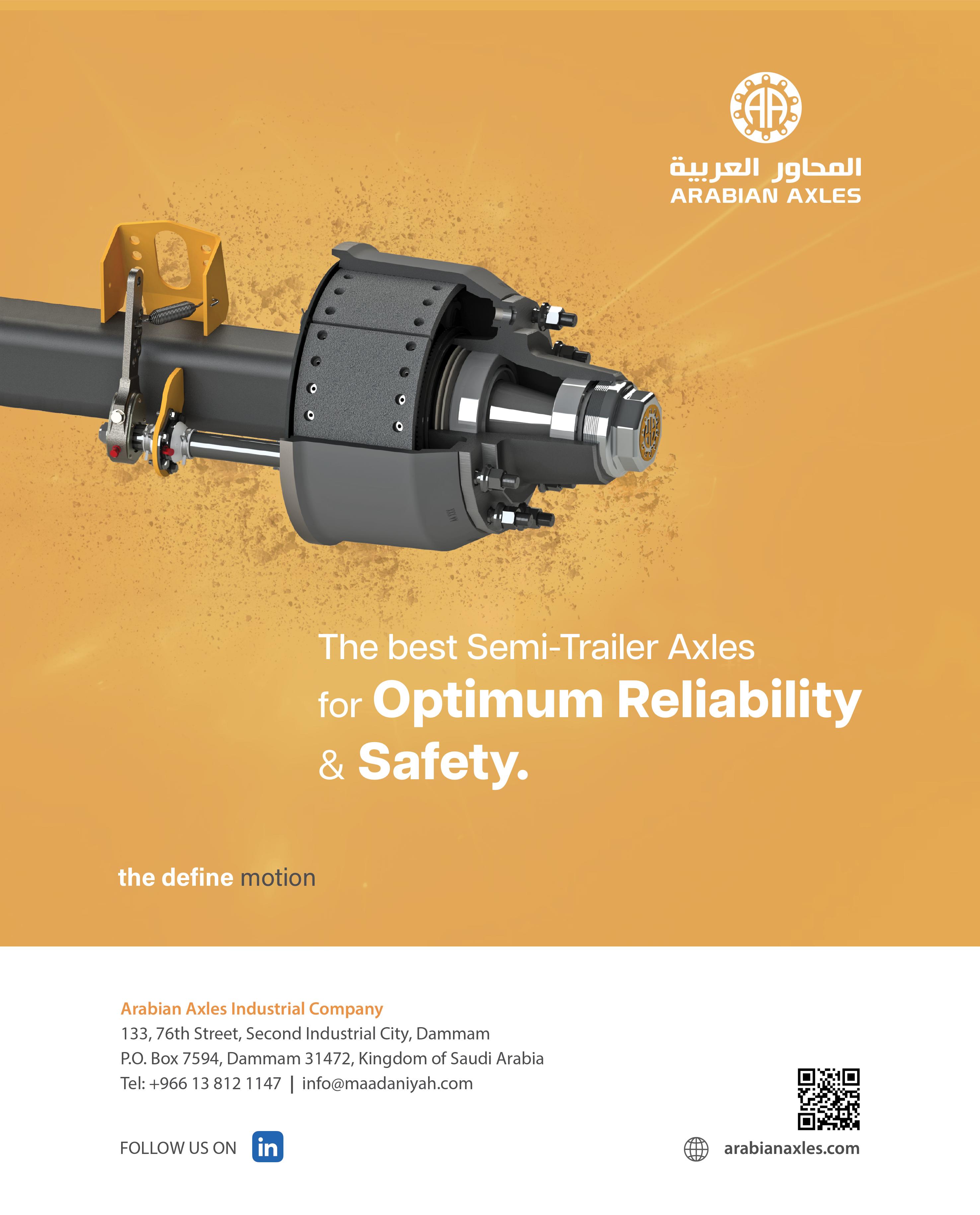

Stephen White sits down with Peter Grøftehauge, CEO of Autorola Group, to delve deep into the transformative shifts reshaping the global automotive pre-owned market
From the surge of electric vehicles (EVs) and the disruptive entrance of Chinese OEMs to the burgeoning opportunities in the used car sector, especially in the Gulf region, Peter Grøftehauge, CEO of Autorola Group, offers a wealth of insights. Drawing from Autorola’s extensive data analytics and his vast experience, he sheds light on the challenges and opportunities that lie ahead for fleet owners, dealers, and the broader automotive industry.
At the heart of Autorola’s success is its robust use of data analytics. The company processes data from over 15 million cars daily, providing actionable insights into pre-owned market demand, pricing trends, and regional preferences. Grøftehauge emphasises the critical role of data in today’s automotive landscape.
“Data is the foundation of modern automotive decision-making,” he remarks. “In transparent markets like the UK or Germany, we can predict which dealer is most likely to buy a specific car based on historical sales. This precision helps our clients calibrate their pricing and inventory strategies effectively.”
However, not all markets offer the same level of transparency. “In regions like the Middle East, there’s less data availability online, making it more challenging. But the trend is clear —transparency is a megatrend, and markets will continue moving toward openness,” Grøftehauge adds.
Autorola recently achieved a significant milestone: selling over 27,000 used cars through its digital platform in a single month. This record-breaking growth underscores the increasing acceptance of
Data is the foundation of modern automotive decisionmaking”
digital platforms in a sector traditionally dominated by manual processes.
“Historically, car auctions were conducted in a very traditional way,” Grøftehauge notes. “With our digital platform, we’re seeing a significant shift toward more organized and data-driven processes. This change reflects broader trends in how people buy and sell vehicles, particularly in mature markets.”
The Middle East presents unique opportunities. With high vehicle turnover and a growing population of longterm residents, the region is ripe for transformation. Autorola’s partnership with Al-Futtaim Automotive has been instrumental in tapping into this potential
In 2022, Autorola and Al-Futtaim Automotive announced a joint venture aiming


to modernise the region’s used-car market. This collaboration introduced an integrated, endto-end digital platform designed to digitise and simplify every step of the remarketing process.
Paul Willis, President of Al-Futtaim Automotive, summarised on the joint-venture at the time: “This venture is a vital component of our growth strategy and a historic first for our company to enter into the software business. Autorola is a leader in this field, and its complete end-to-end digital solutions allow us to serve a wider B2B customer base through a modern and digitised customer journey.”
Two years down the line, Grøftehauge offers insight into how the JV is offering a decisive vision for growing the used market.
“This collaboration is both strategic and synergistic,” Grøftehauge says. “Al-Futtaim brings credibility, knowledge of the local market and regulations, as well as proof of concept and operations. We bring the end-to-end digital solution, technological expertise, a wider pool of buyers with higher bid volumes, convenience for sellers, and transparency and traceability.”
The Autorola MENA digital platform is customisable and customer-focused. It offers modules for fleet monitoring, running fleet operations, ordering and repairs, booking, appraisals, and every step of the remarketing process. Features like transfer, storage, insurance, cleaning and inspection, pricing, a digital showroom, auction selection and management, and payment are all integrated.
“It also offers document sharing and collaboration tools, as well as an integrated ‘Fleet Chat’ platform,” Grøftehauge adds. “This makes emails, SMS messages, and phone calls with vendors and other partners unnecessary.”
A front-row seat to change Electric vehicles are reshaping the automotive landscape, and Autorola’s data provides a front-row seat to this evolution. In regions like Scandinavia, EV adoption is well advanced.
“EVs are now mainstream in markets like Denmark, often cheaper than traditional vehicles due to tax incentives,” Grøftehauge explains. “We’re exporting EVs from countries like Italy and Spain to meet demand in the Nordics.”
In the Gulf, EV adoption is gaining momentum, especially in cities like Dubai. However, challenges remain.
“Extreme heat poses significant issues for battery performance and air conditioning loads, leading to range anxiety during the summer months,” he notes. “But with government support, infrastructure development, and technological advancements, we
With our digital platform, we’re seeing a significant shift toward more organized and datadriven processes”
can expect to see a steady increase in EV adoption over the next five to ten years.”
Chinese automakers are rapidly gaining traction in global markets, offering highquality vehicles at competitive prices.
“I’m very impressed with what Chinese brands are doing,” Grøftehauge remarks. “They’ve overcome early scepticism and are now delivering vehicles that meet international standards. Their rapid growth is creating significant competition for traditional OEMs, particularly in Europe.”
This competition affects both new and used car markets. “As Chinese vehicles enter the market, they’re putting pressure on prices. Fleet owners and dealers need to adapt quickly to this new reality, and data-driven decision-making will be more critical than ever,” he emphasises.
Fleet owners face a complex landscape, balancing overcapacity issues with the transition to EVs.
“Fleet managers are under pressure to optimize operations while preparing for the shift to elec-tric fleets,” Grøftehauge says. “Our platform provides insights into residual values, maintenance costs, and market demand, enabling fleet owners to make informed decisions.”
Autorola sees immense potential in the Middle East and plans to expand beyond the UAE into other countries, notably Saudi Arabia.
He highlighted the importance of understanding market trends, especially in the post-COVID-19 era where volatility is the new norm.
“During the pandemic, there was huge demand and limited supply, pushing prices to record highs,” he notes. “Now, as production capacity returns, we’re seeing significant downward pressure on prices. This volatility makes access to real-time data more important than ever.”
Autorola sees immense potential in the Middle East and plans to expand beyond the UAE into other countries, notably Saudi Arabia.
However, the Gulf region presents unique challenges and opportunities. While the used car market in the UAE is valued at $14 billion and expected to grow to $20.5 billion by 2025, it remains a market in transition. Grøftehauge pointed to the high turnover of vehicles and the grow-ing demand for reliable, affordable options among longterm residents as key drivers of growth.
“The Gulf’s used car market is at a tipping point. With increasing digitalisation and consumer trust in online platforms, we’re
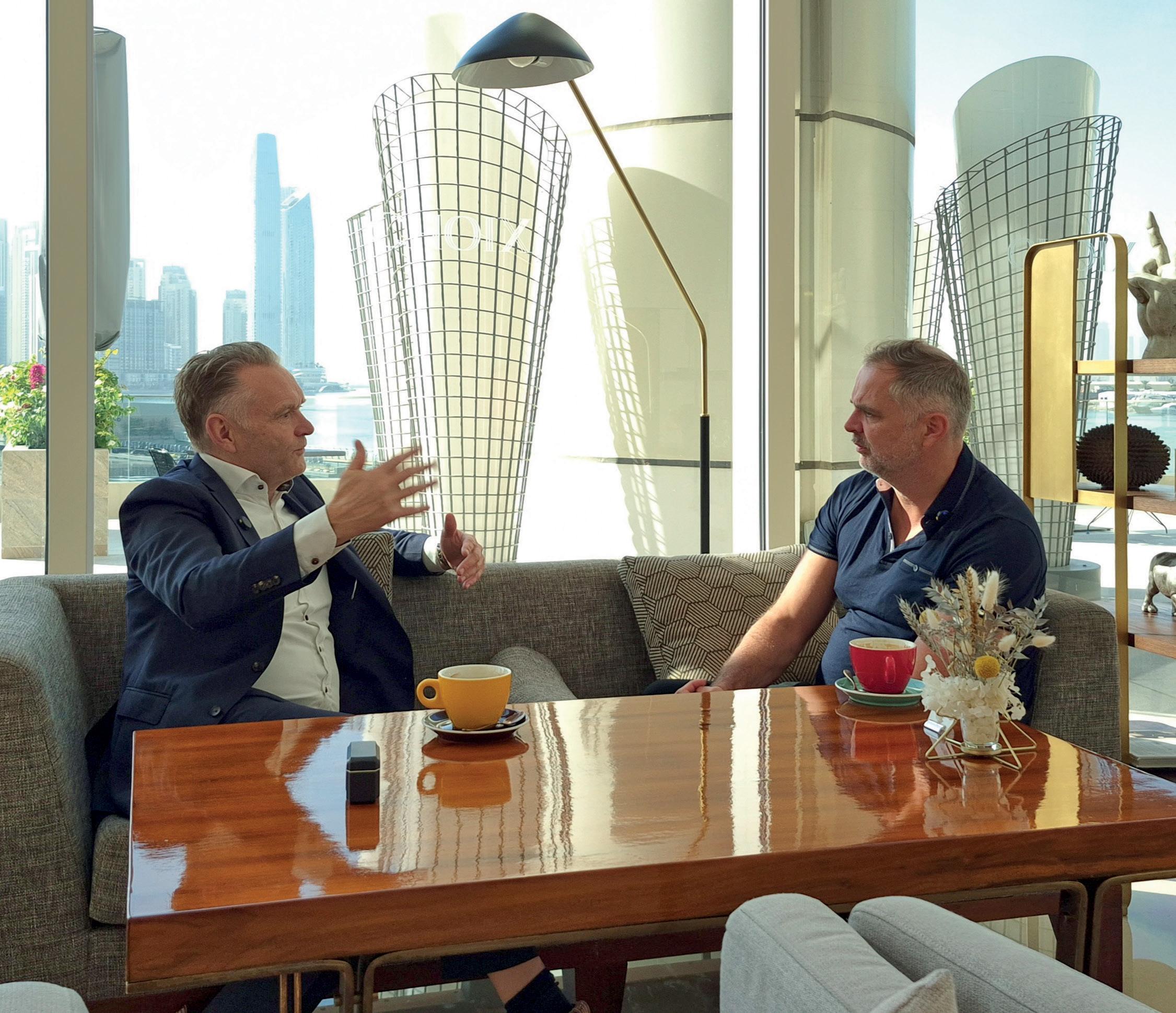
seeing a shift toward a more structured and transparent ecosystem,” he says.
Autorola’s platform is designed to address the region’s specific needs, offering features such as fleet monitoring, appraisals, and a “Fleet Chat” function that eliminates the need for emails and phone calls. This seamless integration is helping to modernise the market: “KSA is a large and diverse market, and its Vision 2030 initiatives are driving significant economic and societal change. With the rise of digitalisation and increasing consumer trust in online platforms, the time is ripe for Autorola to establish a presence there.”
The platform is built to cater to all car brands and corporations, with client data kept secure on AWS servers and treated as highly confidential: “Our goal is to create a more organized, progressive, and worldclass business ecosystem, es-pecially within the context of the used-car market which currently seems very unorganised,” he adds.
While technology and data analytics are crucial, Grøftehauge emphasises the irreplaceable value of human insight: “AI and data can provide us with incredible tools, but they can’t replace the nuanced understanding that comes from human experience,” he says. “For instance, AI might predict trends based on historical data, but it can’t account for sudden market shifts caused by geopolitical events or unexpected economic changes.”
He cautions against over-reliance on technology without human oversight: “If
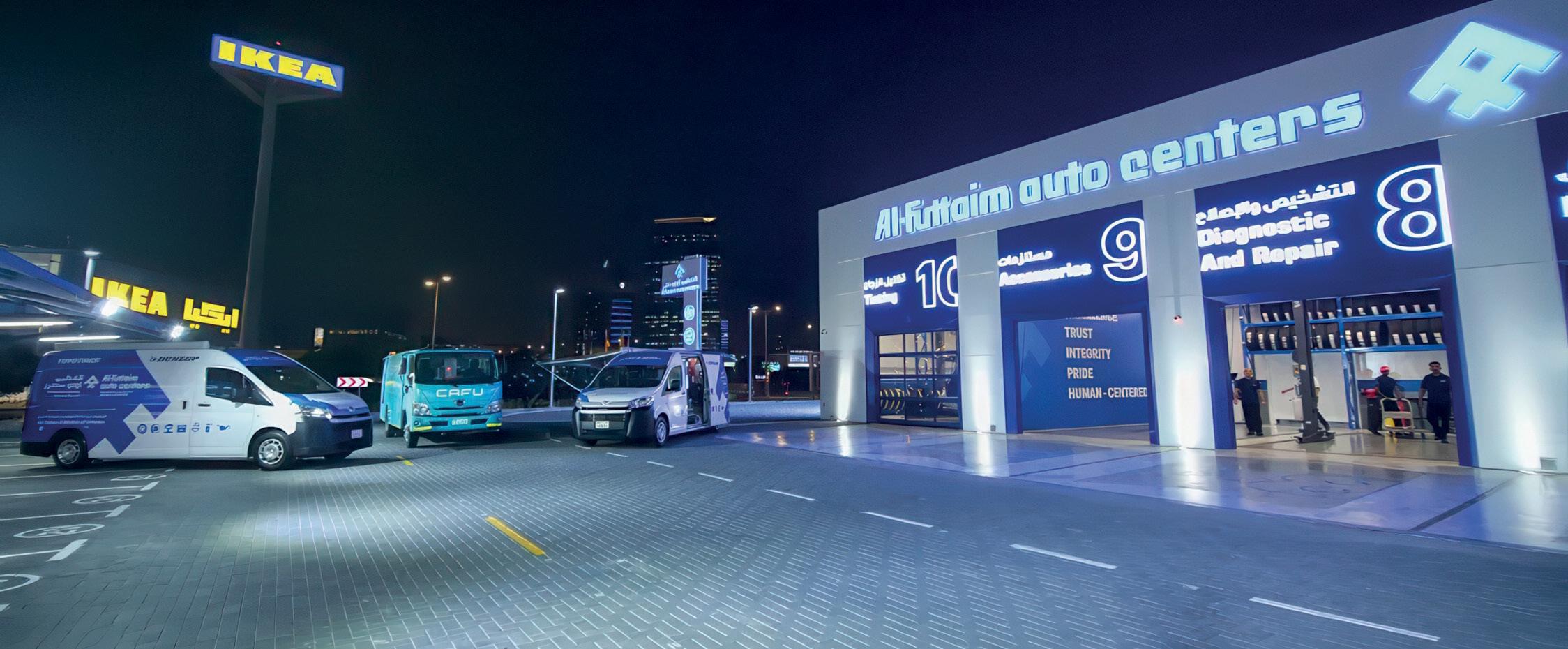
While the used car market in the UAE is valued at $14 billion and expected to grow to $20.5 billion by 2025, it remains a market in transition.
70% of AI predictions are accurate but 30% are not, relying solely on AI can lead to significant business risks,” he notes.
“The combination of data analytics with human expertise is where real value lies.”
The COVID-19 pandemic brought unprecedented challenges but also accelerated certain trends in the automotive industry.
“During the pandemic, there was a huge supply shortage, and prices soared,” Grøftehauge recalls. “Now, we’re witnessing a market correction. Understanding these dynamics is crucial for businesses to navigate successfully.”
He believes that the next five years will be turbulent but also filled with opportunities.
“The market is not big enough for everyone’s growth ambitions,” he says. “Some players will need to merge, shift strategies, or risk exiting the market. Data-driven strategies
Al-Futtaim brings credibility, knowledge of the local market and regulations, as well as proof of concept and operations”
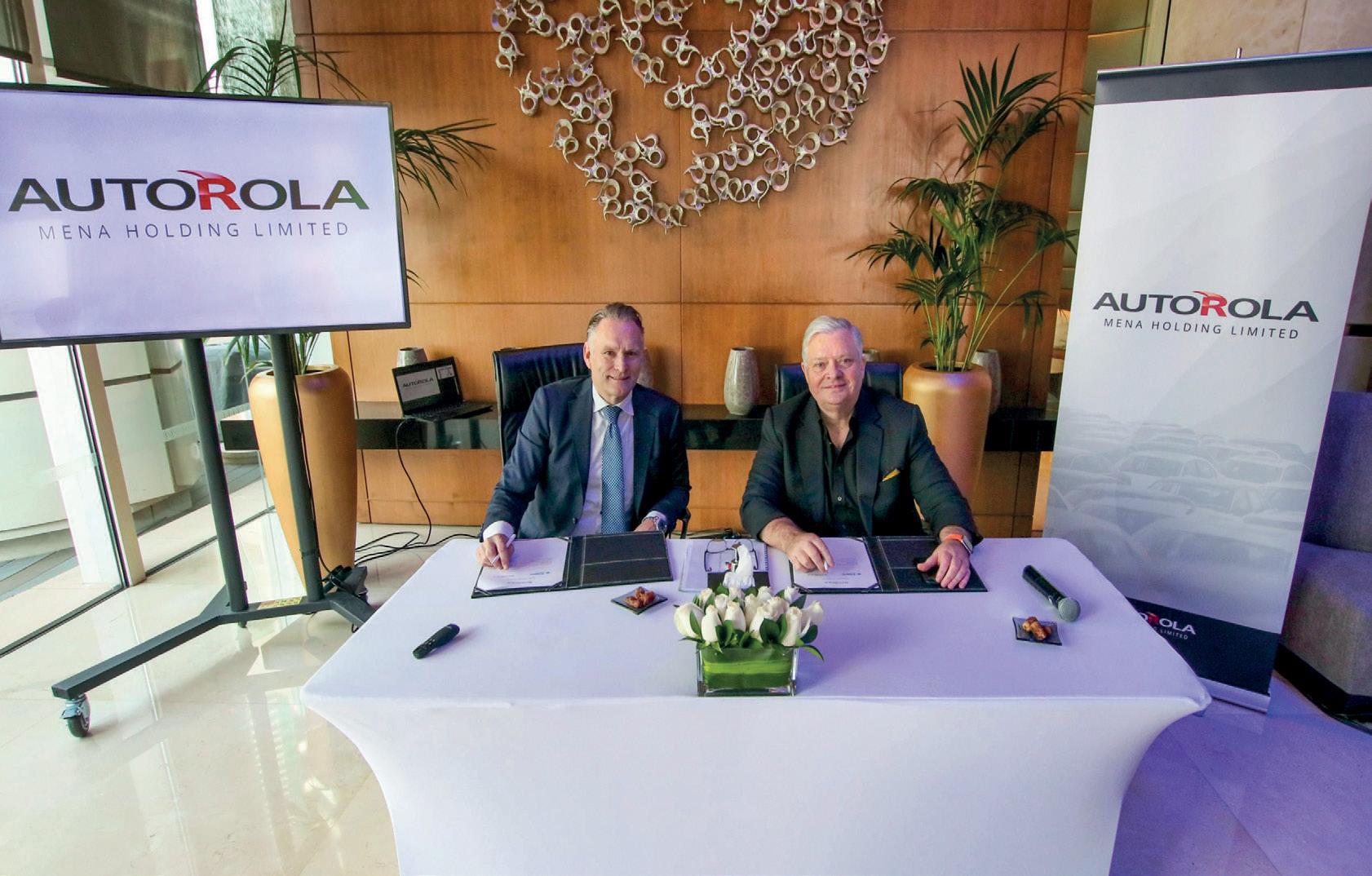
CUSTOMISABLE AND FOCUSED
The Autorola MENA digital platform is customisable and customer-focused. It offers modules for fleet monitoring, running fleet operations, ordering and repairs, booking, appraisals, and every step of the remarketing process.
will be essential in managing risk and capitalizing on opportunities.”
Grøftehauge also believes the Gulf region is uniquely positioned to become a global hub for automotive innovation and exports. “The region has the infrastructure, strategic location, and growing population of long-term residents to drive demand for reliable, affordable vehicles,” he says.
Autorola’s focus on digital transformation, transparency, and efficiency aligns perfectly with these goals. “Our partnership with AlFuttaim is just the beginning. We’re committed to creating a world-class ecosystem that sets new standards for the used car market in the Middle East and beyond,” he says.
As the automotive industry faces unprecedented challenges, from the rise of EVs to the impact of Chinese OEMs, Grøftehauge remains optimistic about the opportunities ahead: “The industry is transforming at a rapid pace, but with the right tools and partnerships, we can navigate this complexity and emerge stronger.”
With its cutting-edge platform, extensive data capabilities, and strong regional partnerships, Autorola is well-positioned to lead the transformation of the automotive market in the Gulf and beyond. “Whether it’s through our partnership with Al-Futtaim or our plans to expand into Saudi Arabia, we’re committed to delivering solutions that drive success in this rapidly evolving market,” Grøftehauge remarks.
“The challenges we’re facing — from the rise of EVs and Chinese OEMs to postpandemic market shifts — also present immense opportunities for innovation and growth,” he says as the interview concludes. “Autorola is committed to helping our clients navigate this complex landscape. With our cutting-edge platform, extensive data capabilities, and strong regional partnerships, we’re well-positioned to lead the transformation of the automotive market in the Middle East and beyond.”






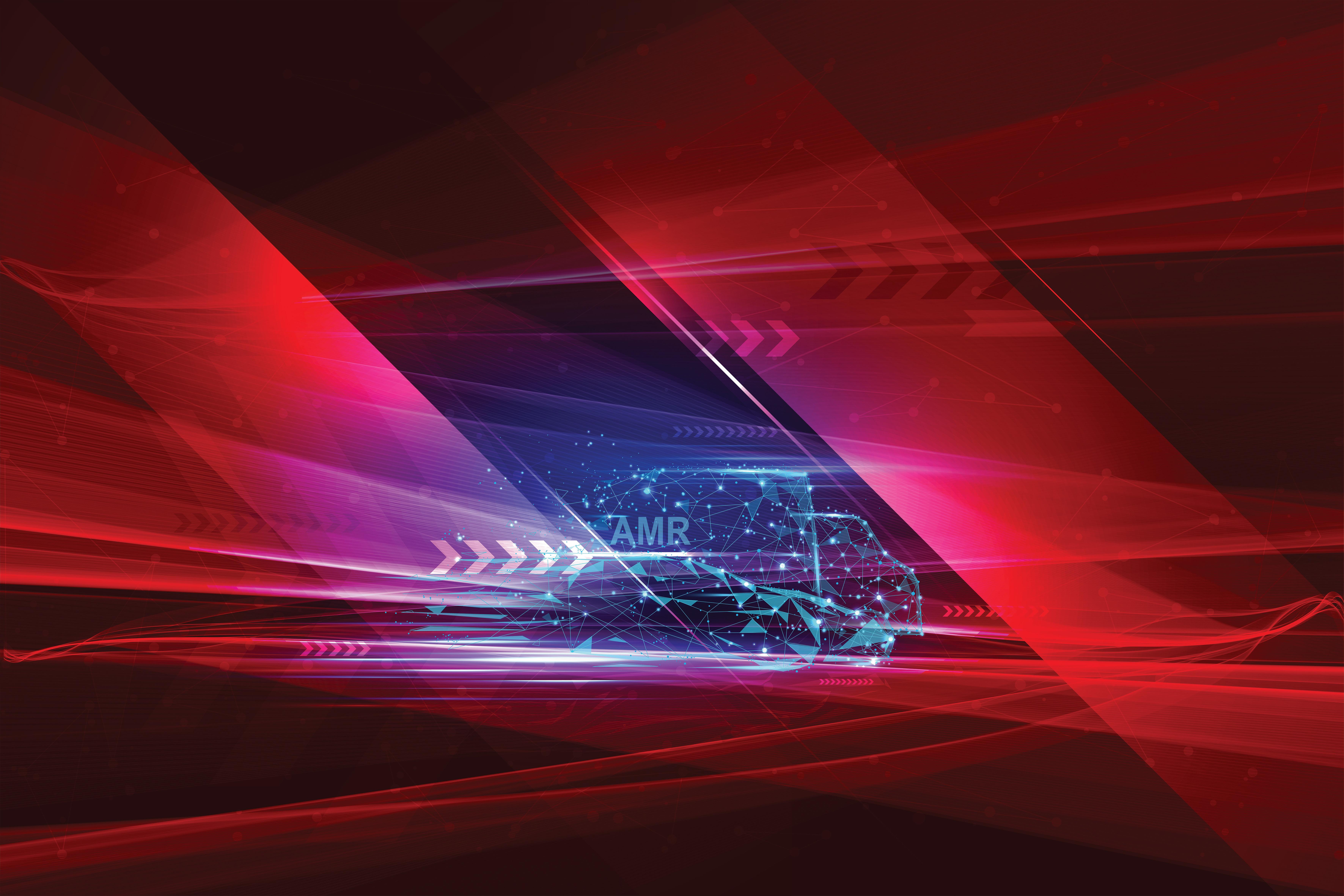
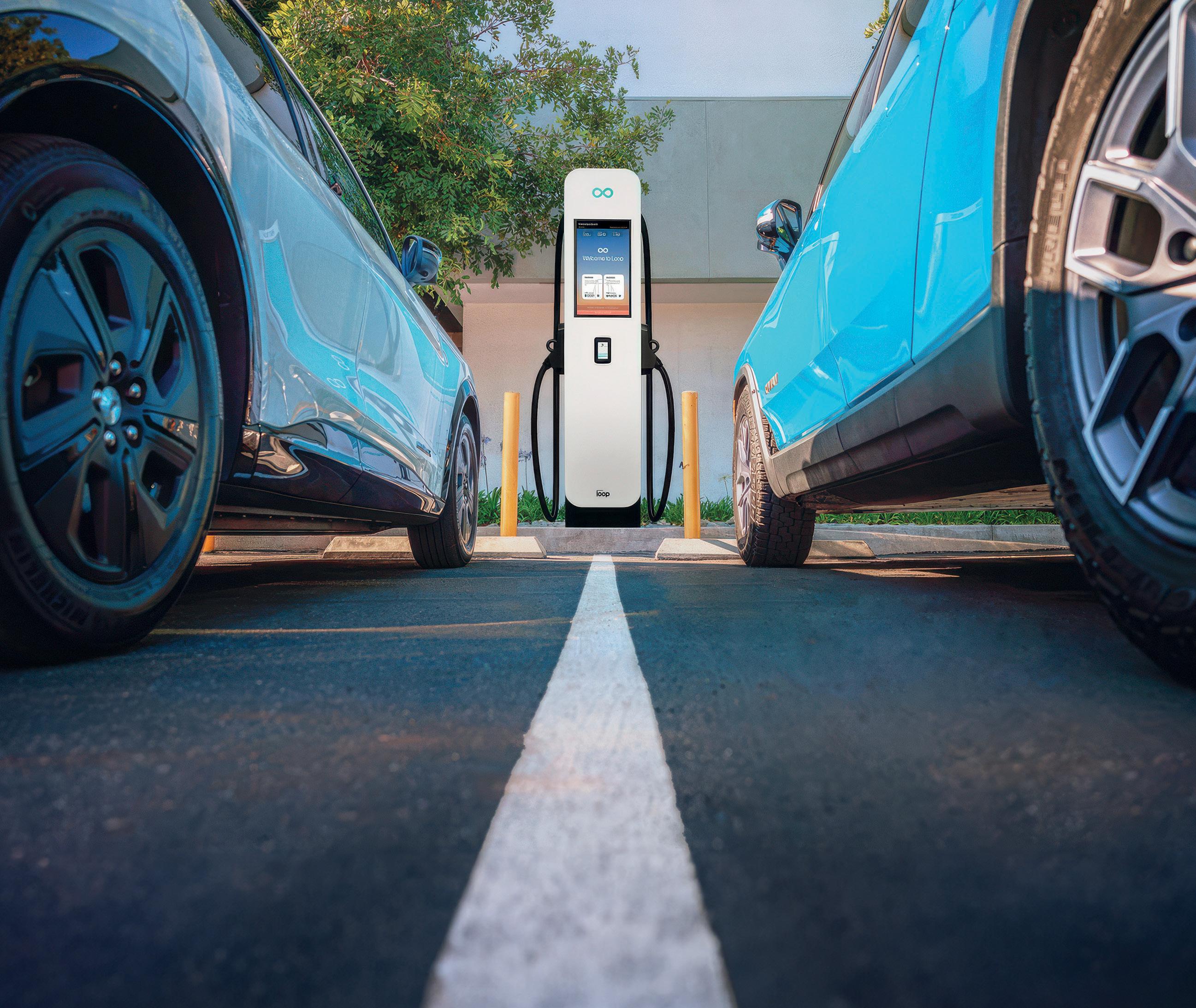
ABB’s Bassam Alshabalat shares the firm’s vision for greater access to EV charging in the market
The Middle East is experiencing a transformative moment as it shifts towards more sustainable transportation solutions. Electric vehicles (EVs) are becoming central to this vision, but their success hinges on the development of robust charging infrastructure. ABB, a global leader in e-mobility solutions, has been at the forefront of this transition, working to address the challenges and seize
the opportunities presented by the rapidly evolving market. During Automechanika Dubai, Bassam Alshabalat, ABB’s E-Mobility Solutions Lead, shared insights into the complexities of this growing sector and the company’s approach to ensuring that the region is ready for an electric future.
Alshabalat explained that the EV industry is far more complex than it appears. While the automotive sector is often the most visible part of the ecosystem, it is only one piece of a much
We’re redefining the way the world moves”
larger puzzle. The success of EVs relies heavily on the energy and charging infrastructure that supports them, as well as the digital solutions that ensure these systems operate seamlessly. “The industry is a combination of automotive, energy, and charging infrastructure,” he said. “Each segment must work together to create a functional mobility solution. Charging infrastructure, in particular, plays a pivotal role because any failure can disrupt the entire ecosystem.”

The Middle East, with its unique environmental and logistical challenges, presents a particularly compelling challenge for e-mobility. Extreme temperatures, expansive urban landscapes, and nascent consumer behaviours make scaling EV infrastructure a significant priority. However, these obstacles are also coupled with opportunities for growth and leadership. Across the region, governments have committed to ambitious sustainability goals, from Saudi Arabia’s Vision 2030 to the UAE’s Net Zero by 2050 initiative. These policies have laid the groundwork for significant investments in green energy and infrastructure, creating fertile ground for companies like ABB to make an impact.
ABB has developed a diverse range of charging solutions to meet the specific needs of the Middle East market.
Alshabalat described three primary types of chargers, each tailored to different applications. Destination chargers, which are commonly used in residential and commercial settings, are designed for locations where vehicles remain parked for extended periods, such as homes, offices, and shopping malls. These chargers operate at lower power levels, making them ideal for overnight charging or for customers spending several hours at a destination.
Fast chargers, on the other hand, cater to higher turnover locations like restaurants and retail centres, where users typically stay for about an hour. These chargers provide a balance between speed and energy efficiency, allowing vehicles to recharge quickly without overwhelming the local power grid. For high-traffic areas like highways, ABB has introduced ultra-fast chargers capable of replenishing a vehicle’s battery in as little as seven minutes. These chargers, which operate at 360 kW, are particularly well-suited to the needs of long-distance travellers and fleet operators, offering a near-instantaneous charging experience.
ABB’s innovation doesn’t stop at passenger vehicles. The company is developing one-megawatt chargers for heavy-duty vehicles such as trucks and buses. These chargers, which can deliver enough energy to power a small village, represent a significant leap forward in e-mobility technology. According to Alshabalat, these chargers can fully charge a heavy-duty vehicle in under three minutes, making them a game-changer for industries
Each segment must work together to create a functional mobility solution”
like logistics and public transport. ABB’s work in this area reflects its commitment to future-proofing its solutions and ensuring they remain relevant as the market evolves.
While the Middle East has made significant strides in adopting EV technology, scaling infrastructure remains a formidable challenge. One of the most pressing issues is the need for universal charging standards that work seamlessly across different vehicle brands and models. ABB’s chargers are designed to address this by incorporating smart technologies that automatically adjust to the specific requirements of each vehicle. This adaptability ensures a consistent and reliable charging experience for all users, regardless of the type of EV they drive.
Another critical challenge is ensuring
the reliability of charging infrastructure. Alshabalat emphasised that charging stations must be built with redundancy to minimise the impact of component failures. “A charging station must be built redundantly so that the failure of one component doesn’t bring down the entire system,” he explained. ABB’s chargers are equipped with fail-safes that allow them to continue delivering power even at reduced capacity, ensuring uninterrupted service for users. This level of reliability is particularly important in a region where EV adoption is still in its early stages and consumer confidence must be nurtured.
Digital connectivity also plays a crucial role in ABB’s approach to e-mobility. All of the company’s chargers are integrated with Wi-Fi and cloud-based monitoring systems,
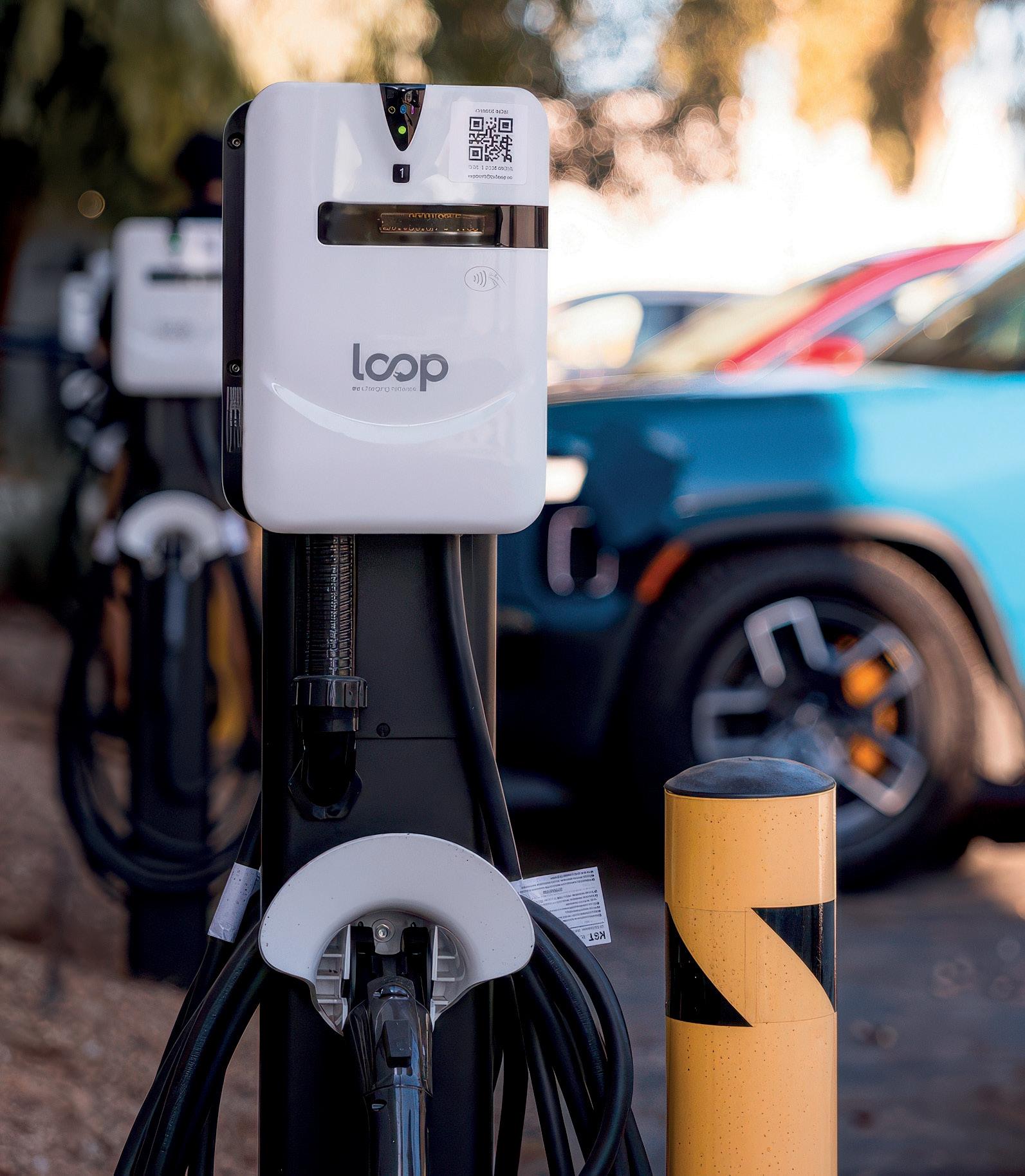
CLOUD-BASED MONITORING
All of ABB’s chargers are integrated with Wi-Fi and cloud-based monitoring systems, allowing operators to manage multiple stations remotely.
allowing operators to manage multiple stations remotely. This connectivity not only ensures operational efficiency but also enhances the user experience by providing real-time updates on charger availability and performance. Additionally, ABB offers over-the-air software updates for its chargers, ensuring they remain compatible with the latest vehicles and can adapt to evolving consumer demands.
Alshabalat also highlighted ABB’s efforts to innovate business models for
A charging station must be built redundantly”
charging infrastructure. For example, the company is exploring time-based charging solutions at high-traffic stations, where users pay for the amount of time they spend charging rather than the amount of energy they consume. This approach aligns with consumer behaviours and maximises the efficiency of charging stations, ensuring they can accommodate as many users as possible.
The opportunities for e-mobility in the Middle East extend beyond passenger
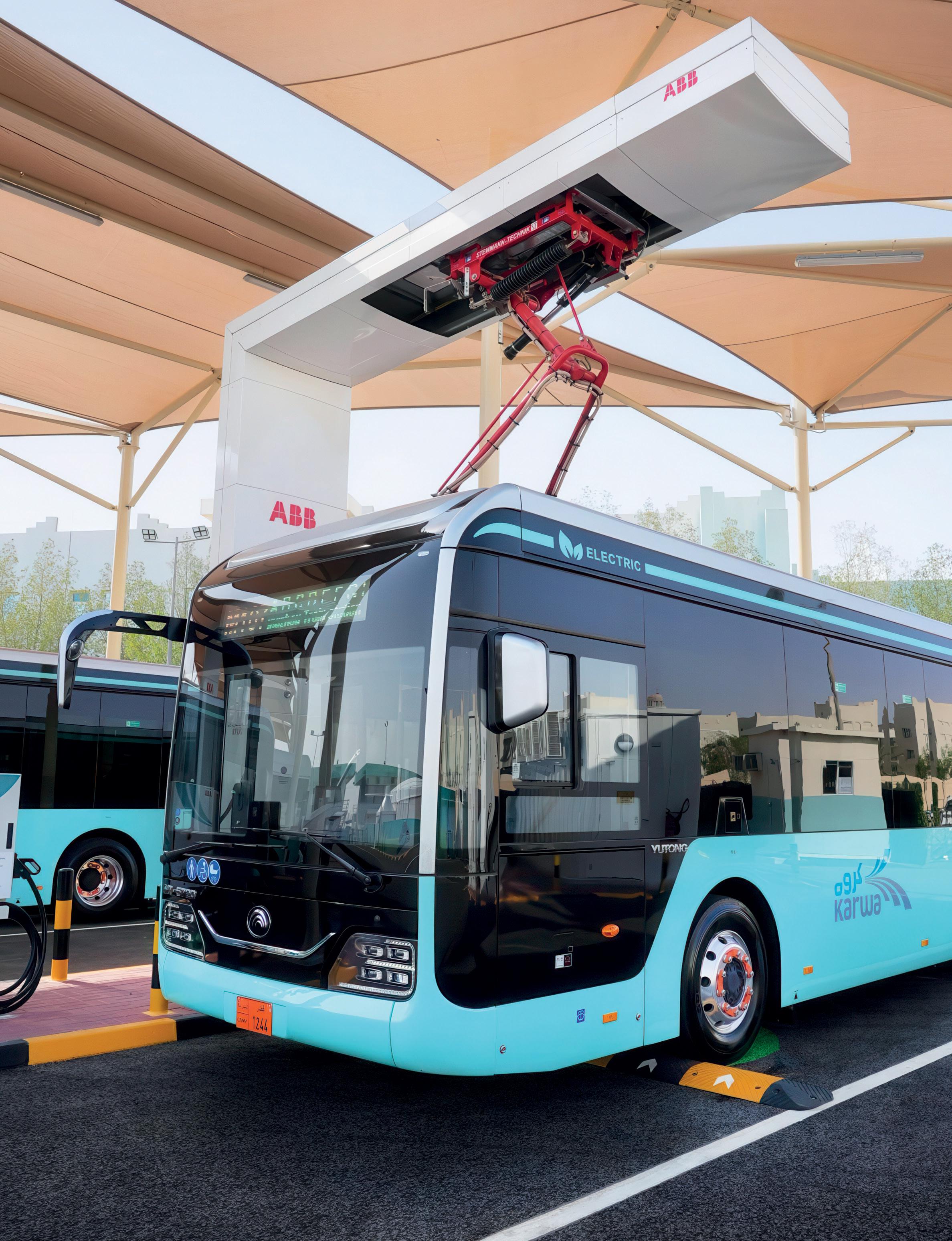
vehicles. ABB has been heavily involved in large-scale projects that showcase the versatility of its charging solutions. For instance, the company supplied chargers for Qatar’s fleet of electric buses during the FIFA World Cup, one of the largest deployments of its kind in the world. ABB has also worked on projects involving autonomous taxis in Abu Dhabi, school buses in Saudi Arabia, and even electric boats in the UAE. These initiatives demonstrate the wide range of applications for e-mobility solutions and highlight the potential for the Middle East to become a global leader in sustainable transportation.
The environmental benefits of these projects are substantial. Converting a school bus fleet to electric, for example, can significantly reduce diesel consumption and greenhouse gas emissions while also lowering operating costs. Similarly, electrifying port operations with electric loaders and cranes can dramatically cut fuel consumption and pollution, creating a cleaner and more efficient logistics sector. These examples illustrate how e-mobility solutions can drive both environmental and economic benefits, making them an attractive option for governments and businesses alike.
Looking ahead, ABB is committed to continuing its work in the Middle East and expanding its portfolio of e-mobility solutions. The company’s focus is not just on developing innovative technologies but also on creating an ecosystem that supports the widespread adoption of EVs. Alshabalat described ABB’s vision as one that prioritises collaboration between governments, businesses, and consumers to build a sustainable future.
The Middle East’s journey towards sustainable mobility is still in its early stages, but the progress made so far is promising. With companies like ABB leading the way, the region has the potential to become a global leader in e-mobility innovation. As Alshabalat put it, “We’re not just building infrastructure — we’re redefining the way the world moves.” ABB’s work in the Middle East is a testament to the transformative power of technology and the importance of collaboration in addressing the challenges of our time. By focusing on reliability, adaptability, and innovation, the company is helping to create a future where electric mobility is not just a possibility but a reality.


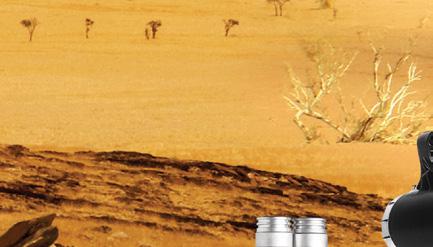
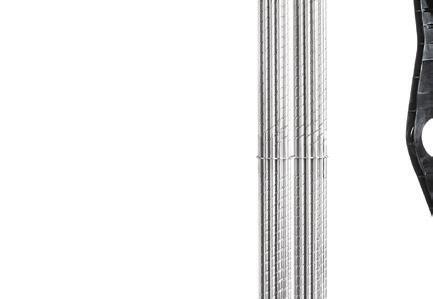
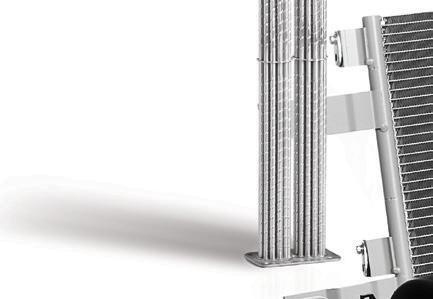
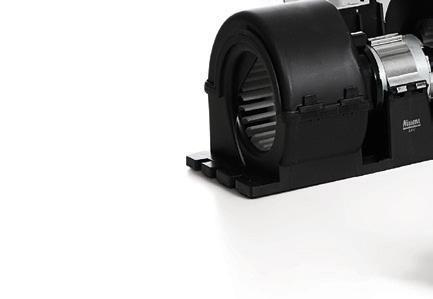


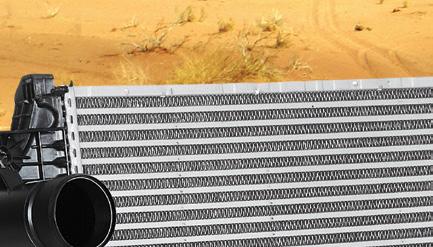
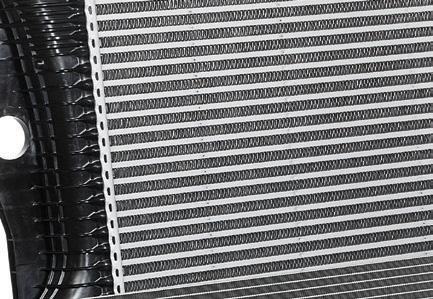

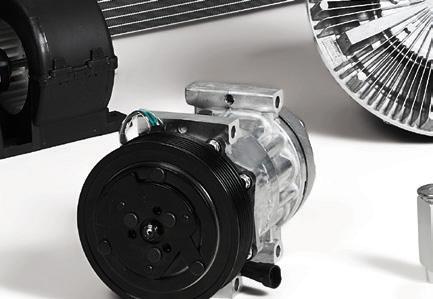


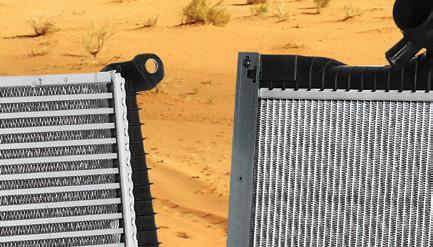
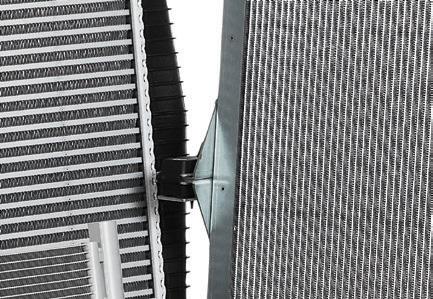
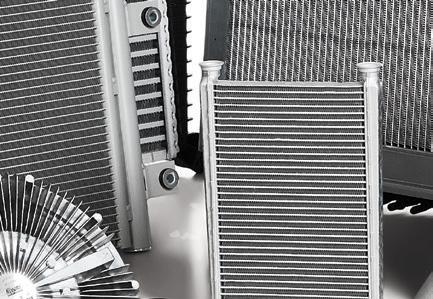
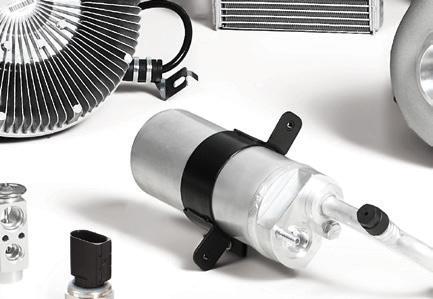


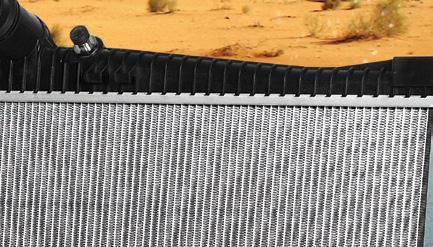
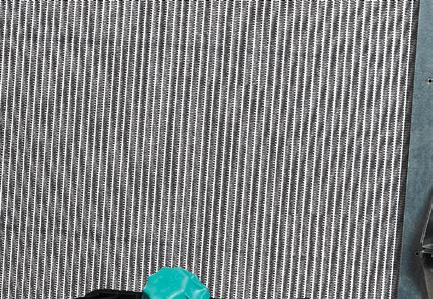
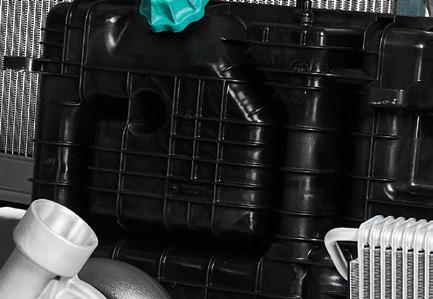
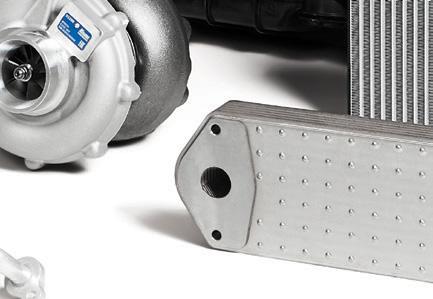






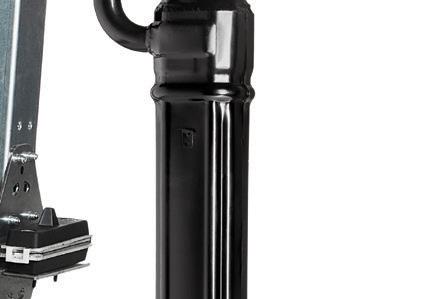

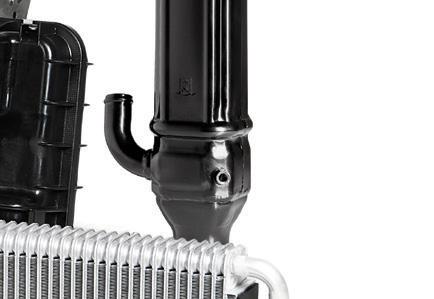

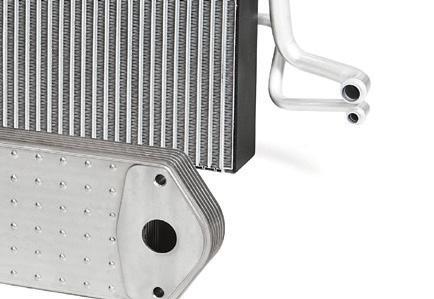








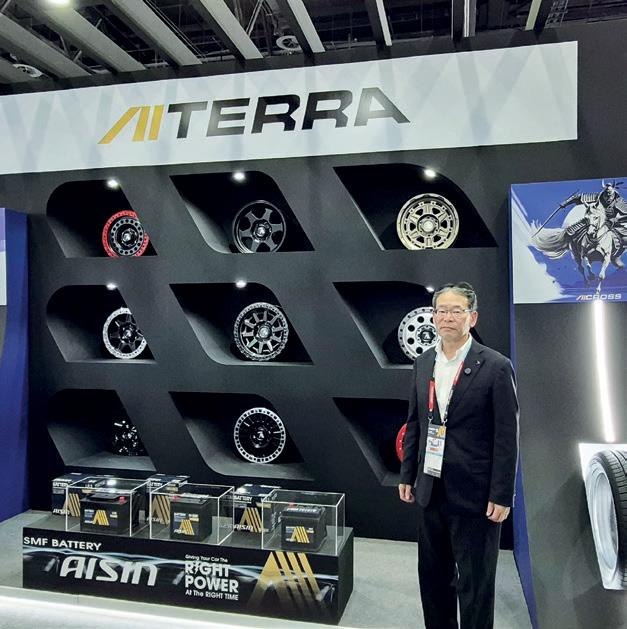
AISIN Corporation, a global leader in automotive components, showcased its ambitious expansion strategy at Automechanika Dubai 2024, underlining its vision to transform the global af-termarket industry. As part of this vision, the company unveiled its latest innovation—a new tyre brand, AITERRA, reflecting its commitment to sustainability and advanced technology. Held at the Dubai World Trade Centre, the event served as a prime opportunity for AISIN to highlight its strategic transformation into a total automotive parts and service provider. Building on its legacy of excellence, the company is set to expand its extensive product portfolio to cater to evolving customer needs.
AISIN’s expanded offering goes beyond traditional components to introduce essential maintenance products. The company plans to offer wiper blades, lubricants, high-quality batteries, and tire accessories, alongside advanced tools such as wheel balancers, paints, and car lifts. This comprehensive approach aims to provide everything needed for vehicle upkeep, supporting customers with innovative, highquality solutions. Additionally, AISIN presented cutting-edge equipment for automotive service and maintenance, including rim solutions and electric mobility components, reinforcing its position as a leader in both innovation and sustainability. Masahiro Shiiya, President of AISIN Corporation’s Global Aftermarket division, shared his thoughts on the company’s future: “Our expansion strategy reflects our vision to evolve.”
Al Masaood Automobiles, the exclusive distributor of Nissan vehicles in Abu Dhabi, Al Ain, and the Western Region, is celebrating the successful rollout of its Nissan Brakes Services Aftersales Campaign.
Launched earlier this year, the campaign highlighted the critical role of brake maintenance in vehicle safety, encouraging Nissan owners to prioritise regular checks and upkeep. Through tailored service packages, transparent pricing, and expert care, the initiative aimed to equip customers with the knowledge and resources needed to maintain their vehicles responsibly and drive safely on UAE roads. Timed to coincide with the demanding summer months— when high temperatures often
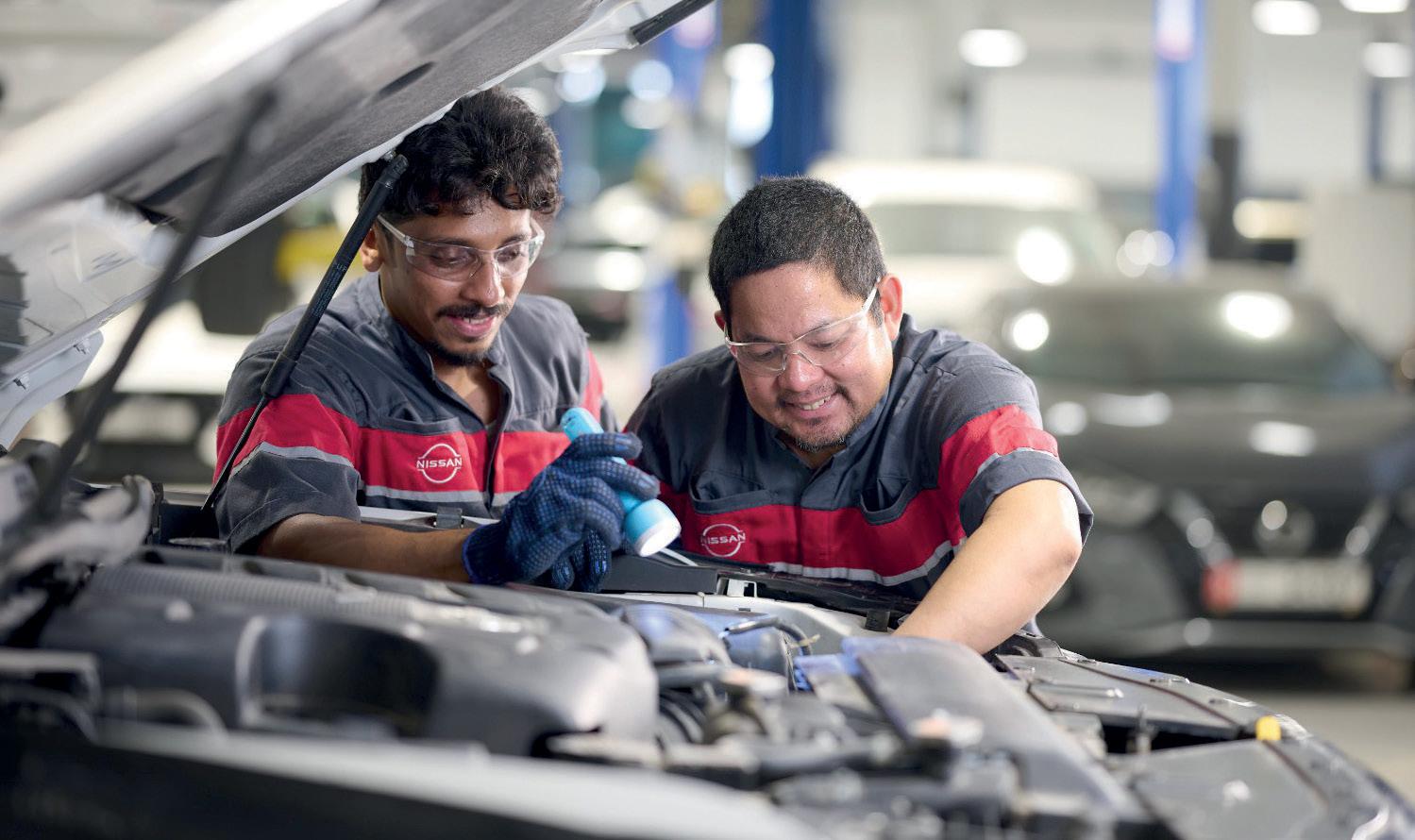
accelerate wear and tear on vehicles—the campaign featured genuine Nissan parts and guidance from experienced service advisors and technicians. Personalised communication strategies further engaged customers, encouraging proactive vehicle care and fostering trust.
The results were immediate and impressive. Al Masaood Automobiles confirmed that it had recorded an impressive 130% year-on-year increase in customer visits, a clear testament to the campaign’s success in addressing safety concerns and enhancing road safety awareness.
BuyAnyAutoPart, a UAE-based B2B used car part aggregator, has raised USD 750,000 in pre-seed funding, positioning itself to disrupt the region’s multi-billiondollar used car part market.
The company specialises in streamlining the search and supply of used car parts for multibrand workshops across the UAE. Prominent backers of this funding round include Galadari Brothers, the exclusive dealer for Mazda in the UAE, and 6G Capital, the
family office of the Allana Group, alongside other strategic investors.
“As a global family office focused on forward-thinking investments, we prioritise companies with innovative solutions and strong growth potential, like BuyAnyAutoPart,” said Adil Allana of 6G Capital.
The secured funds will enable BuyAnyAutoPart to fulfil contracts with some of the UAE’s largest multi-brand workshops while preparing for an ambitious expansion to serve thousands of small and medium-sized garages
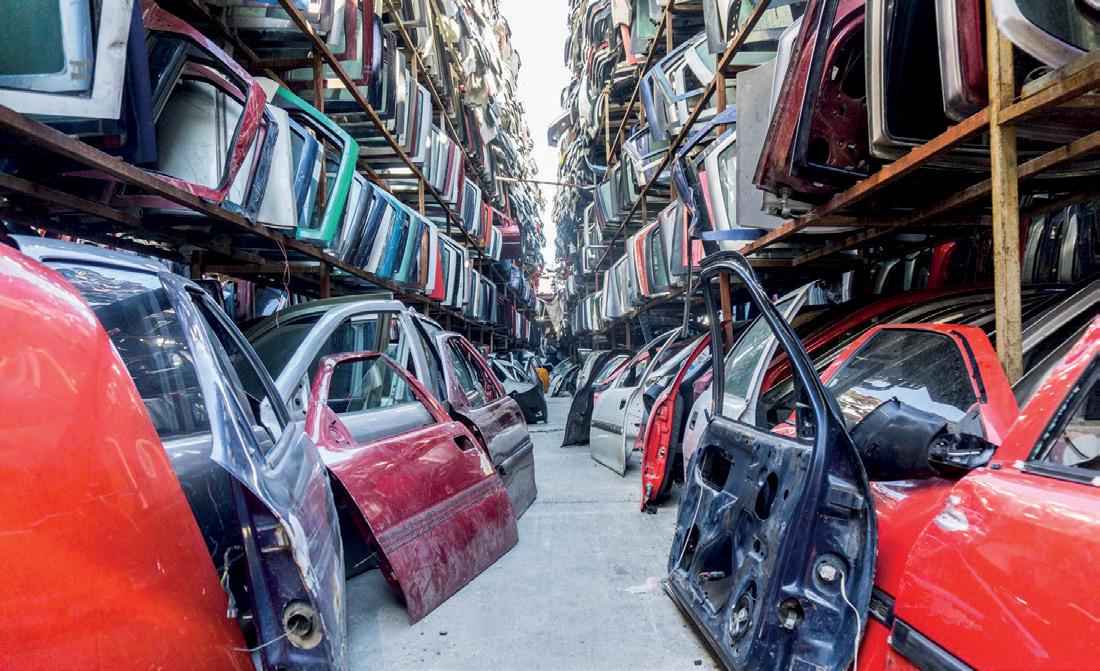
nationwide. With the UAE acting as a global trade hub, the company’s ultimate aim is to become the largest supplier of used car parts in the country—and eventually, the world.
“The sheer scale of the regional used car part market, combined with BuyAnyAutoPart’s innovative solution to sourcing parts for nondealership insurance accident repairs, made them an ideal early investment for us,” said Mohammed Galadari, Co-Chairman of Galadari Brothers.
“Our goal is to become the biggest supplier of used car parts in the country,” said Zarir Saifuddin, CEO of BuyAnyAutoPart. “Given that the UAE is a global trade hub for these parts, we are wellpositioned to become the largest used car part supplier in the world.”
BuyAnyAutoPart’s strategic approach has garnered recognition. Earlier this year, it was shortlisted for the Dubai Government-backed Sandbox Accelerator Program, an initiative by Oresaya Capital to support pre-seed and seed-stage technology entrepreneurs.



The 20th anniversary of Automechanika Shanghai was a celebration and a chance to see why exhibitions remain relevant
Over the past 20 years, Automechanika Shanghai has grown into a vital hub for innovation, global collaboration, and market adaptation. The event not only reflects the evolution of the automotive sector in China but also showcases the broader development of the Automechanika brand, which now spans 14 shows across the globe, including the thriving Dubai show.
From its roots as a biannual event to its current status as a global powerhouse, Automechanika Shanghai exemplifies the
evolution of the Automechanika brand, as well as the wider automotive aftermarket.
In between walking the vast halls of the Shanghai exhibition centre and getting the most of a packed programme celebrating it’s 20th anniversary, T&FME was able to listen to the Automechanika leadership team’s thoughts on the aftermarket’s biggest event line-up and how they are adapting to a rapidly evolving automotive industry.
At a commemorative press conference, three key leaders of the Automechanika family—Michael Johannes, Vice President of Automechanika; Olaf Musshoff, Director
We need to inspire the next generation to join the industry”
of Automechanika Frankfurt; and Fiona Chiew, General Manager of Automechanika Shanghai — offered insights into the show’s legacy and its dynamic response to the challenges of a rapidly changing global market.
Launched in 1971, Automechanika has become synonymous with the automotive aftermarket, standing on four pillars: innovation, sustainability, transformation, and education and training. Over time, the brand has expanded its footprint to include 14 shows, each tailored to the unique needs of its region.
With its focus on innovation, sustainability, and education, the lead team at
Automechanika certainly feel the line-up of international and regional events ensures the brand is well-positioned to lead the industry into the future, fostering collaboration and driving progress on a global scale.
Michael Johannes emphasised the adaptability of the brand, which has allowed it to thrive despite global challenges.
“Automechanika is a strong and resilient brand. We have strategically expanded to emerging markets like Central Asia and launched shows that reflect the evolving needs of the industry,” he said. Johannes highlighted the brand’s ability to create platforms for collaboration, noting that the growth of its events underscores their importance in connecting businesses across diverse markets. Johannes also touched on the brand’s growing global influence.
“We’ve even seen competitors attempting to imitate us, which we view as a testament to our success. But what sets Automechanika apart is our commitment to delivering innovation, sustainability, and high-quality content to our participants.”
Automechanika Shanghai, which debuted in 2004, was initially a biannual event.
However, as Fiona Chiew explained, the rapid development of China’s automotive sector necessitated a shift to an annual format.
“The Chinese market developed at such a pace that we needed to respond to the growing demand for sourcing and export opportunities,” she said. Today, Automechanika Shanghai stands as one of the largest automotive aftermarket shows in the world. Its 20th-anniversary edition featured 6,763 exhibitors from 40 countries, 222,341 visitors from 181 regions, and 17 international pavilions. The show’s scale and diversity underscore its importance as a bridge between China and the global automotive industry.
Chiew highlighted the event’s role in showcasing China’s leadership in new energy vehicles (NEVs). “This year marks the first time that NEV sales in China have surpassed traditional combustion engine vehicles. Automechanika Shanghai reflects this shift by prioritising sectors like new energy and connectivity, providing platforms for innovations in battery management, hydrogen fuel cells, and digitalisation,” she said.
In an era dominated by digital communication and virtual trade shows,
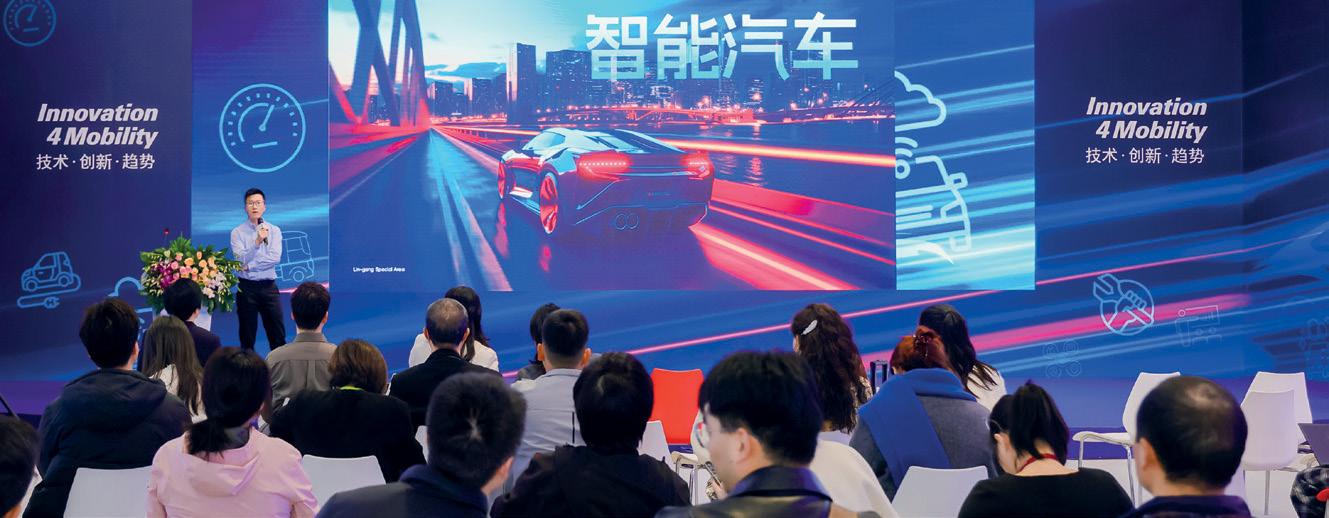
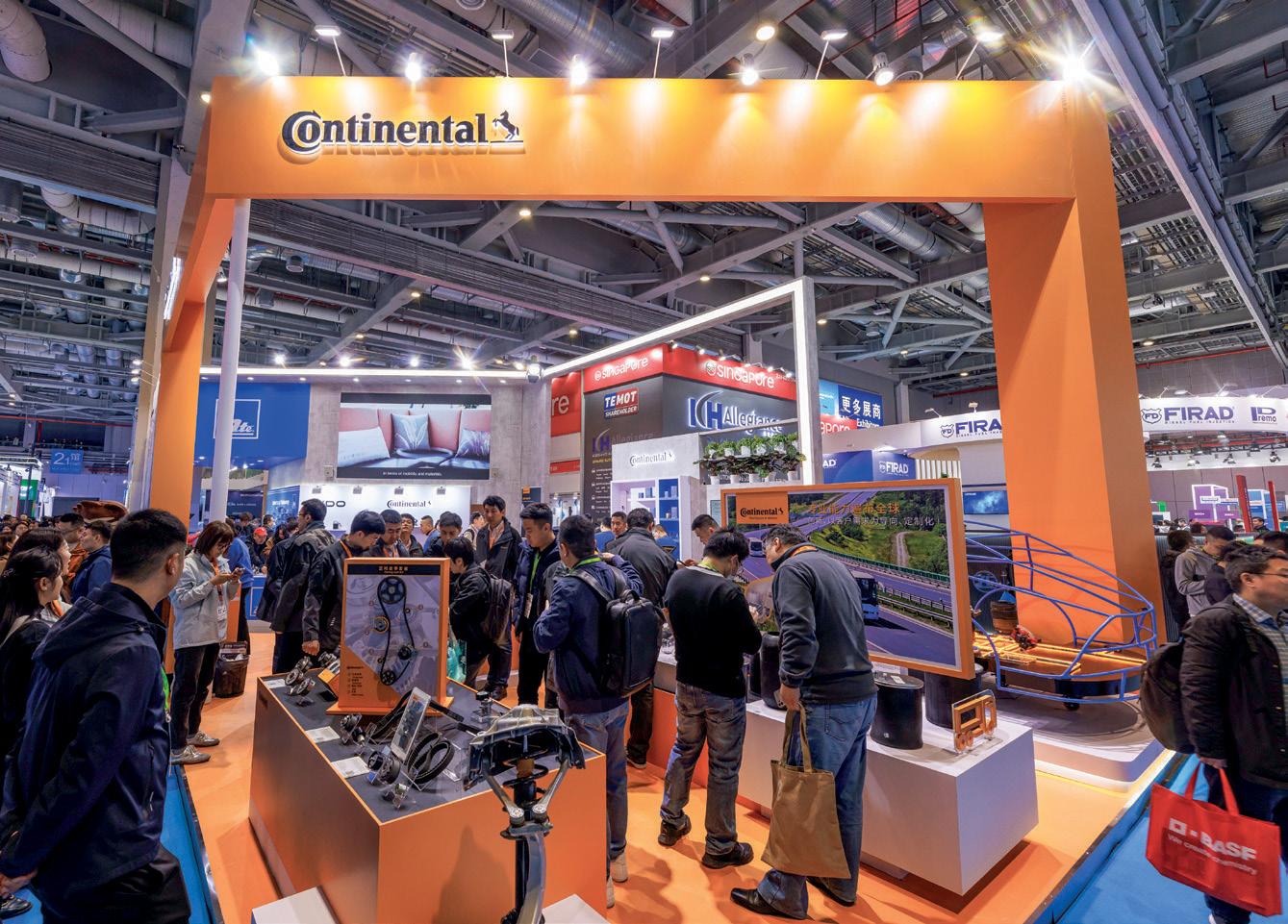
We have strategically expanded to emerging markets like Central Asia and launched shows that reflect the evolving needs of the industry”
Automechanika Shanghai’s recordbreaking attendance underscores the enduring importance of in-person exhibitions. Michael Johannes reflected on the unique value that exhibitions bring to the automotive aftermarket.
“The pandemic forced us to question whether our business model would remain relevant. What we’ve learned is that faceto-face interaction is irreplaceable,” he said. “People need to see products, discuss ideas, and build trust. The digital world can facilitate communication, but it can’t replicate the tangible experiences and personal connections that exhibitions provide.”
Johannes pointed to the rise in attendance as evidence of pent-up demand for in-person networking: “2024 was a test of whether people still value these events, and the response has been overwhelming. Exhibitors and visitors alike recognise that these shows are essential for building partnerships and staying ahead in a competitive market.”
Olaf Musshoff echoed this sentiment, emphasising the importance of quality over quantity. “It’s not just about the numbers — it’s about attracting the right people. Decision-

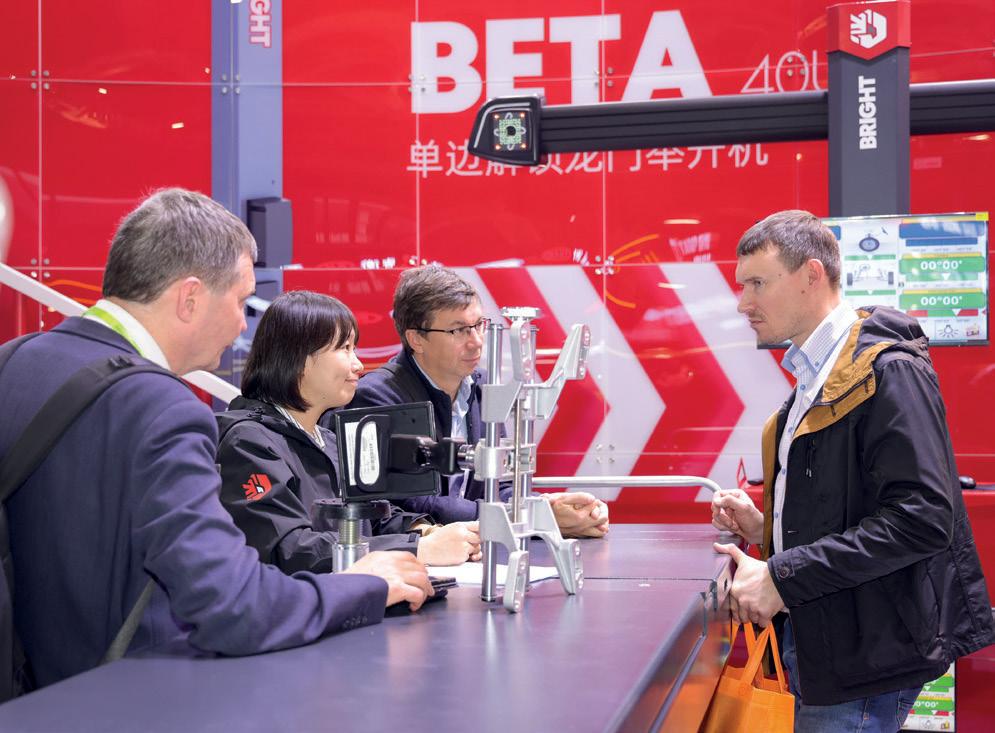
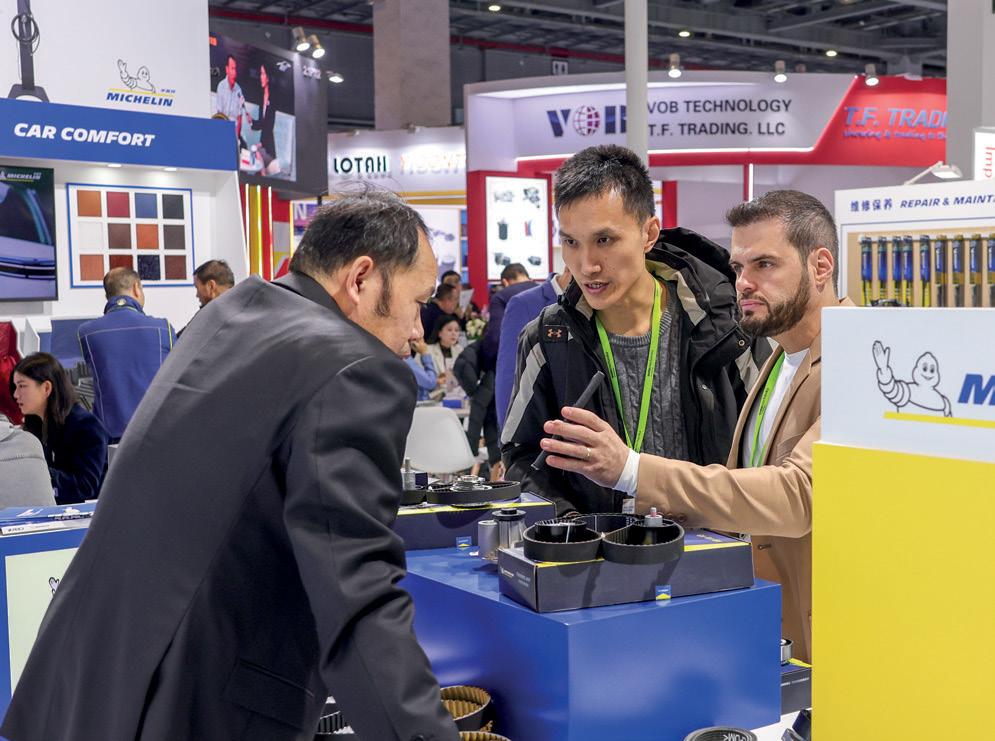
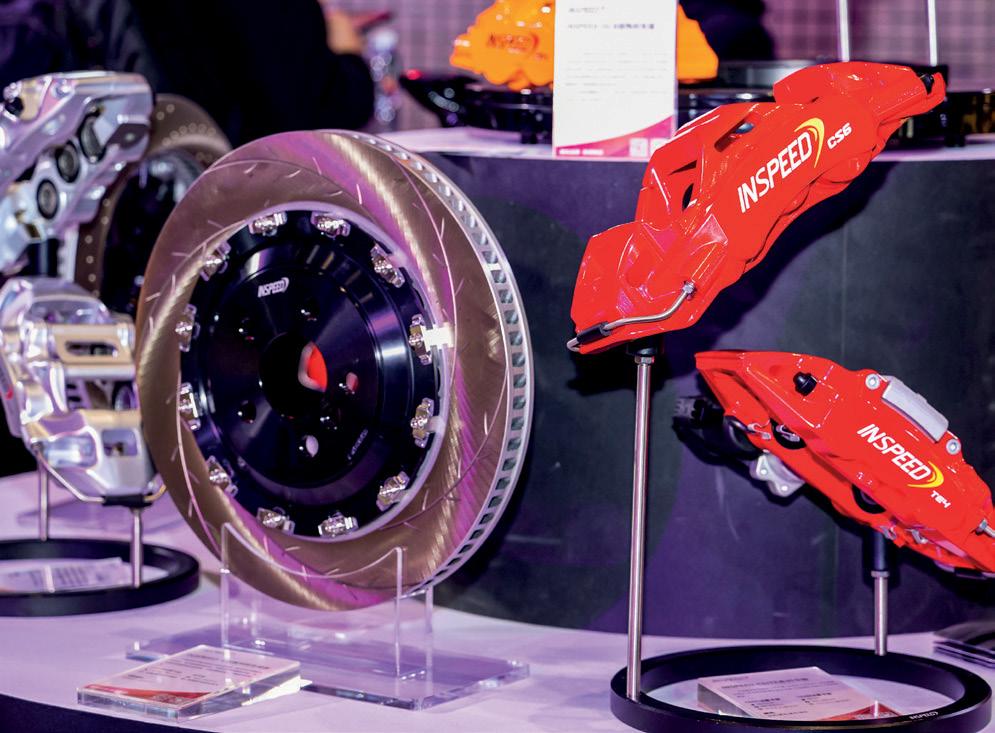
makers, industry leaders, and innovators come to Automechanika because they know they’ll find meaningful opportunities here,” he said. Sustainability has emerged as a cornerstone of the Automechanika brand, with both Frankfurt and Shanghai integrating this theme into their programming.
At Automechanika Frankfurt, the Sustainability Forum provides a platform for discussions on reducing emissions, developing green technologies, and improving supply chain efficiency. “We brought together industry leaders to address pressing sustainability challenges and opportunities,” Musshoff said. In Shanghai, sustainability was showcased through the Innovation4Mobility sector, which featured advancements in hydrogen fuel cells, battery technology, and electric drive systems. Chiew noted that these innovations align with China’s broader goals of becoming a global leader in NEV production and reducing its carbon footprint.
The show also introduced visitor programmes designed to guide participants through specialised themes, such as sustainable mobility and digital transformation. “We created curated routes that allow visitors to explore

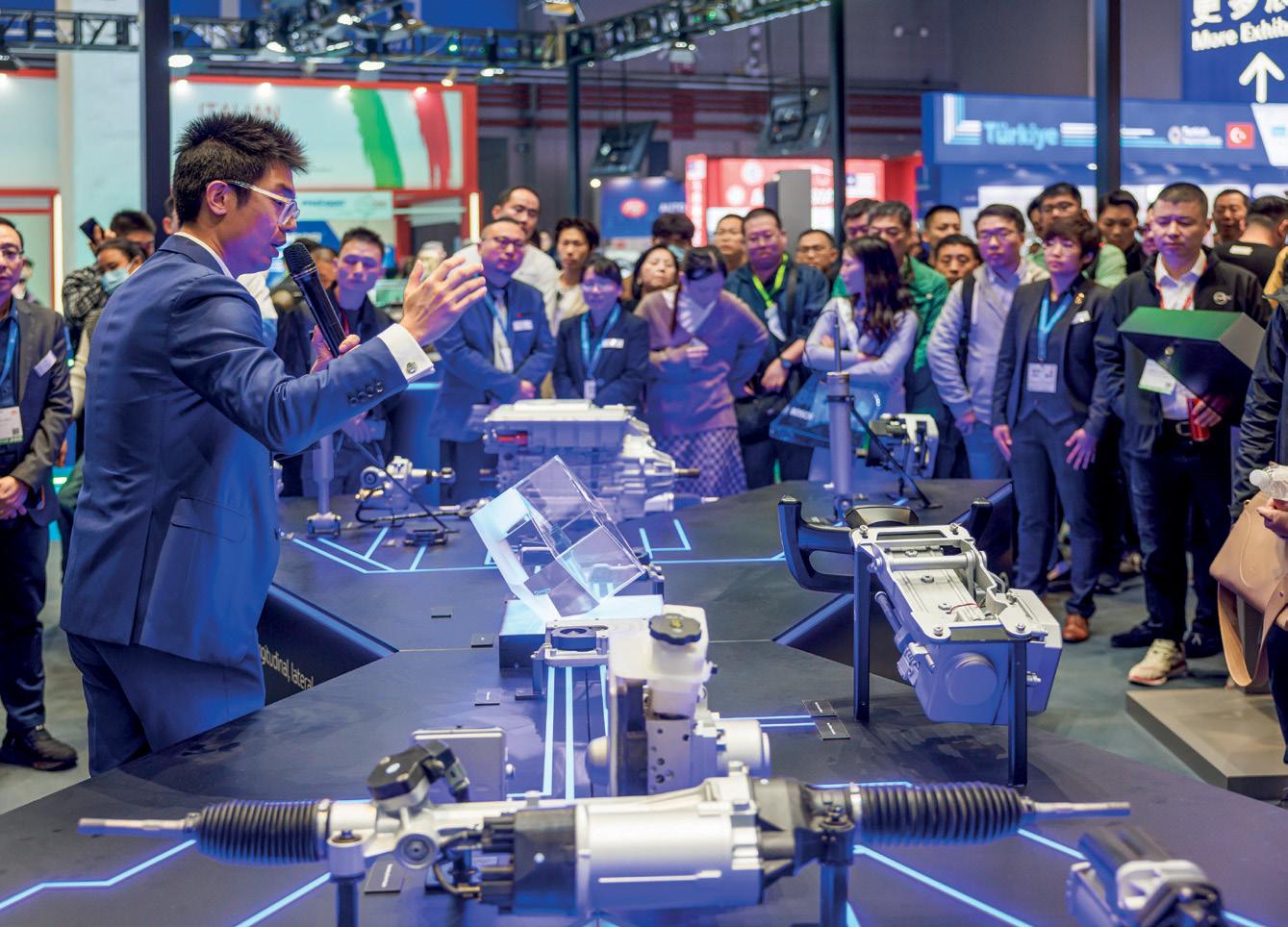
The transition to NEVs isn’t just about new talent—it’s also about equipping existing professionals with the skills they need to adapt”
specific product lines and services, ensuring they maximise their time at the event,” Chiew said.
As the automotive industry grapples with a talent shortage, Automechanika is actively working to attract younger professionals. In Shanghai, initiatives such as motorsport simulator contests and live-streamed content were introduced to engage younger audiences.
“We need to inspire the next generation to join the industry,” Chiew said. “These programmes not only attract young talent but also provide opportunities for existing professionals to upskill, particularly in areas like NEV maintenance and repair.” Musshoff echoed this sentiment, highlighting Frankfurt’s efforts to create welcoming environments for networking and social interaction. “We want attendees to feel connected—not just as professionals, but as individuals. Our events provide spaces for meaningful interactions that go beyond business.”
Education and training remain integral to Automechanika’s mission. Johannes stressed the importance of these initiatives in preparing the industry for its ongoing transformation. “Whether it’s training workshops for NEV maintenance or
seminars on digitalisation, education is key to ensuring the aftermarket remains competitive,” he said. Chiew added that the need for training extends across generations.
“The transition to NEVs isn’t just about new talent—it’s also about equipping existing professionals with the skills they need to adapt,” she said.
Looking to the future, the Automechanika brand is poised to continue its leadership in the automotive aftermarket. Johannes pointed to the increasing complexity of the industry as both a challenge and an opportunity. “With the rise of NEVs, autonomous vehicles, and digitalisation, the aftermarket is becoming more complex. Automechanika’s role is to provide the tools, knowledge, and platforms the industry needs to navigate this complexity,” he said.
Chiew highlighted the importance of maintaining Automechanika Shanghai’s global appeal. “As we celebrate 20 years, we remain committed to bridging the gap between domestic and international markets. Our goal is to ensure that Automechanika Shanghai continues to be a hub for innovation and collaboration.”
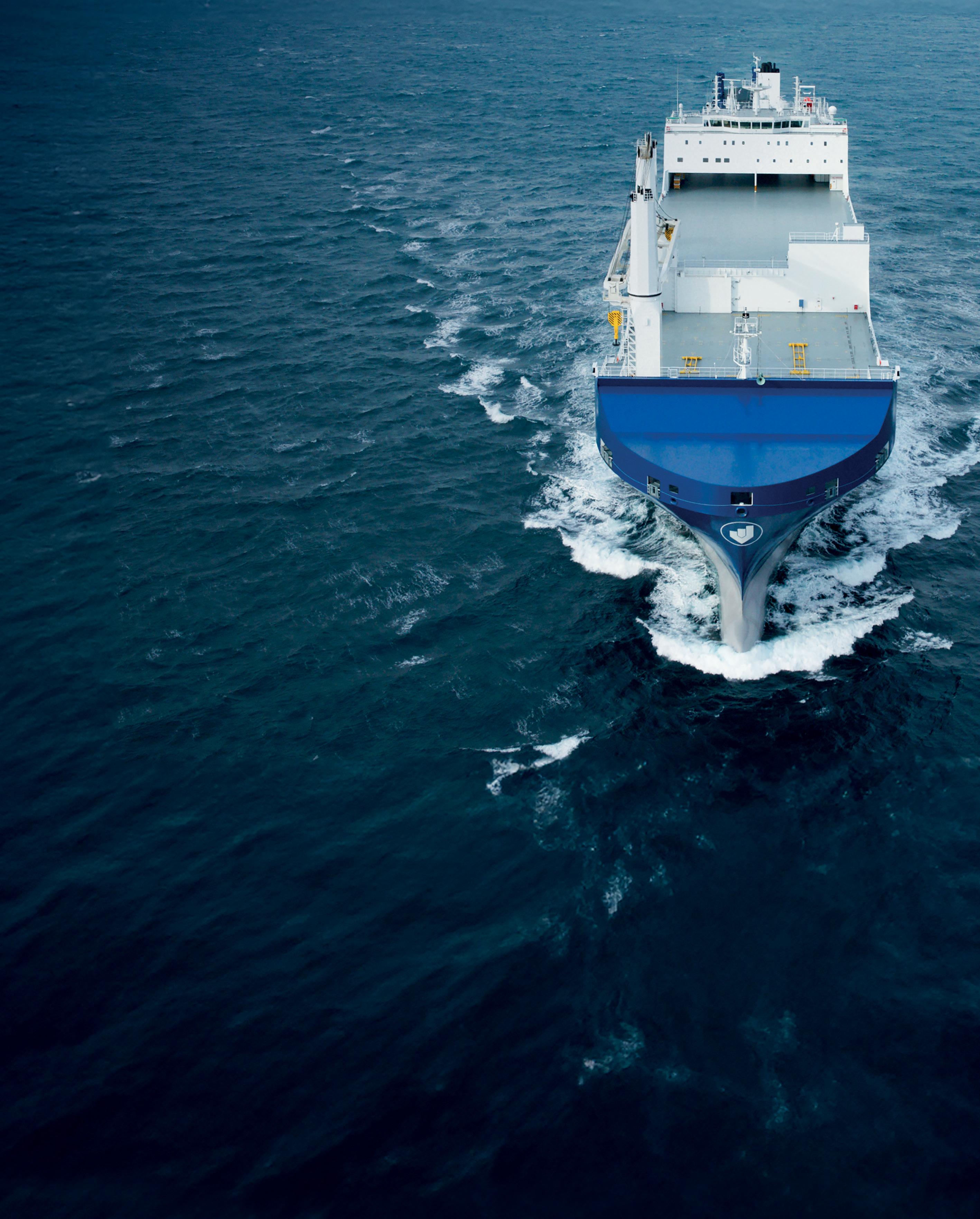
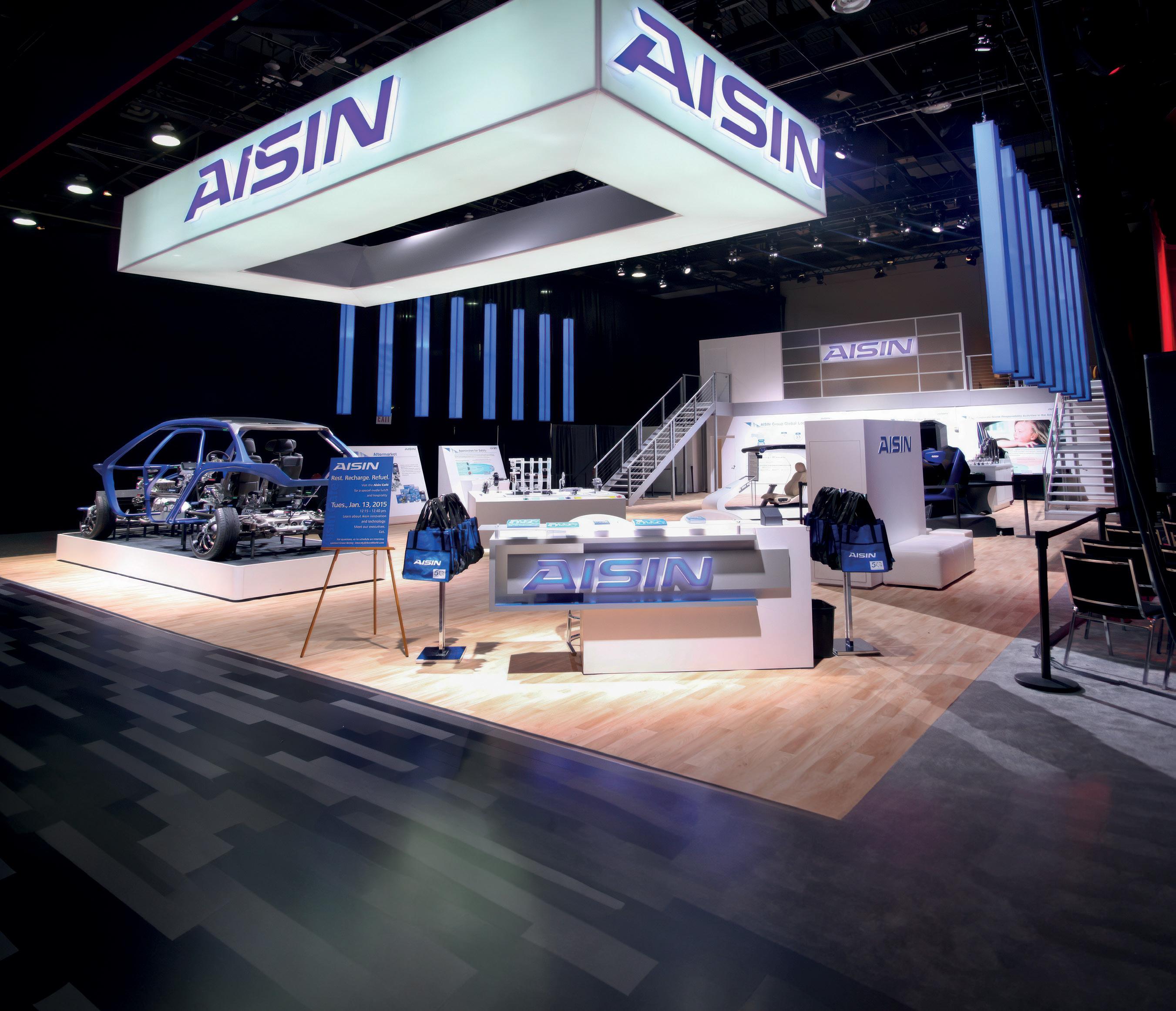
The event, held at the Dubai World Trade Centre, served as the perfect stage for AISIN to introduce its expansion strategy and showcase its innovative new tyre brand – AITERRA. Demonstrating a commitment to sustainability, cutting-edge technology, and regional customisation, AISIN is reinforcing its position as a comprehensive
AISIN has unveiled an ambitious expansion strategy. Can you walk us through the vision behind AISIN Corporation unveils its ambitious vision
automotive parts and service provider.
During the event, AISIN showcased a broad array of equipment for automotive service and maintenance, highlighting products such as rim solutions and e-mobility components. The company’s product line-up now includes cooling systems, drivetrain products, steering and suspension, chemicals and fluids, alongside essential maintenance items like lubricants, batteries, and service tools.
AISIN’s ability to innovate ensures it remains a leader”
In an exclusive interview with T&FME during the event, Masahiro Shiiya, President of AISIN Corporation’s Global Aftermarket, discussed the company’s vision, the launch of AITERRA, and AISIN’s strategy to stay ahead in an ever-evolving market.

this expansion and how it will impact the global automotive aftermarket industry?
AISIN’s expansion strategy aims to become a comprehensive automotive parts and service provider by broadening its product lineup. This includes not only traditional automotive components but also essential maintenance items like tires, lubricants, and service tools. The company’s global network of 36 locations enables it to deliver high-quality products efficiently. This expansion strengthens AISIN’s position as a trusted partner in the global automotive aftermarket industry.
What do you believe are the key drivers behind the growing demand for a more diverse and innovative automotive aftermarket offering? The demand for diverse and innovative aftermarket offerings is driven by the complexity of modern vehicles and evolving consumer needs. As technologies like EVs and smart systems become more common, specialized parts and services are required. Consumers also seek sustainable, fuel-efficient, and safe solutions. Companies like AISIN are responding by offering a broader range of products and integrating cutting-edge technology.
In terms of sustainability, how does the launch of AITERRA reflect AISIN’s broader commitment to eco-friendly solutions within the automotive industry?
AITERRA reflects AISIN’s commitment to sustainability by combining advanced technology with eco-friendly solutions. The tyre brand is designed for high performance while supporting fuel efficiency and environmental responsibility. The name AITERRA, combining “AI” and “Terra,” symbolises AISIN’s dedication to both innovation and sustainability. This aligns with the company’s broader vision of zero-emission solutions for the automotive industry.
AISIN has a strong presence with 36 locations across 17 countries. What role does regional customsation play in AISIN’s strategy, and how do you ensure that your offerings cater to local market needs?
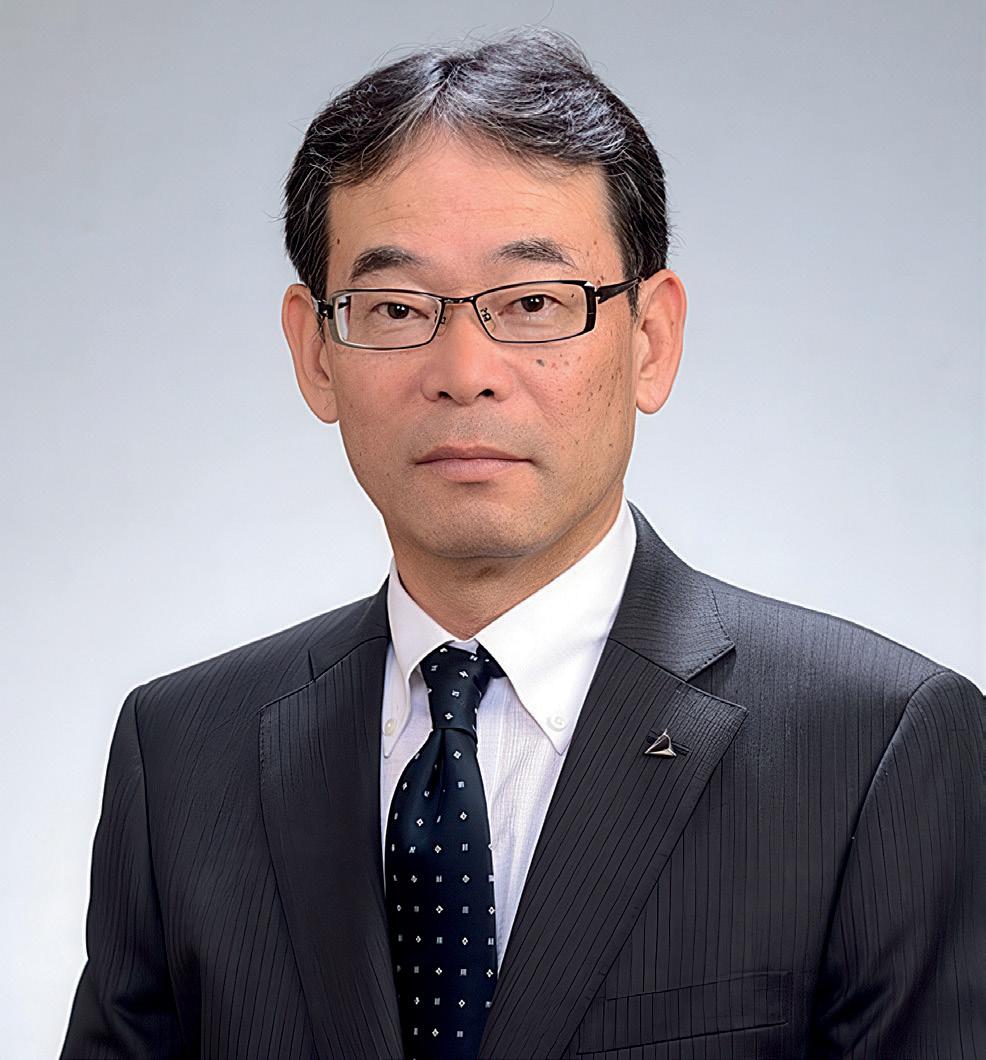
Regional customisation is crucial to AISIN’s strategy, as it tailors products to meet local market demands. The company adapts its offerings based on consumer preferences, regulatory requirements, and environmental factors. With a strong global network, AISIN ensures timely and efficient delivery of customized solutions. This approach helps AISIN maintain a competitive edge in diverse markets worldwide.
Regional customisation is crucial to AISIN’s strategy”
How will AISIN’s product diversification and innovation in aftermarket services help it stay ahead of competitors in a rapidly evolving industry?
AISIN’s product diversification allows it to address emerging trends like electrification and sustainability. By expanding its lineup to include items such as AITERRA tires and service equipment, AISIN meets a wider range of customer needs. The integration of cutting-edge technologies in its products helps the company stay ahead of competitors. AISIN’s ability to innovate ensures it remains a leader in a rapidly changing industry.
Automechanika Dubai 2024 is an important event for the automotive industry. How would you describe the significance of Automechanika as a platform for AISIN to showcase its new products and innovations?
Automechanika Dubai is a key platform for AISIN to showcase new innovations like the AITERRA tire brand. The event allows AISIN to connect with global customers, partners, and industry leaders. It also provides an opportunity to gather valuable feedback on its offerings. AISIN’s participation reinforces its position as a leader in the automotive aftermarket industry.
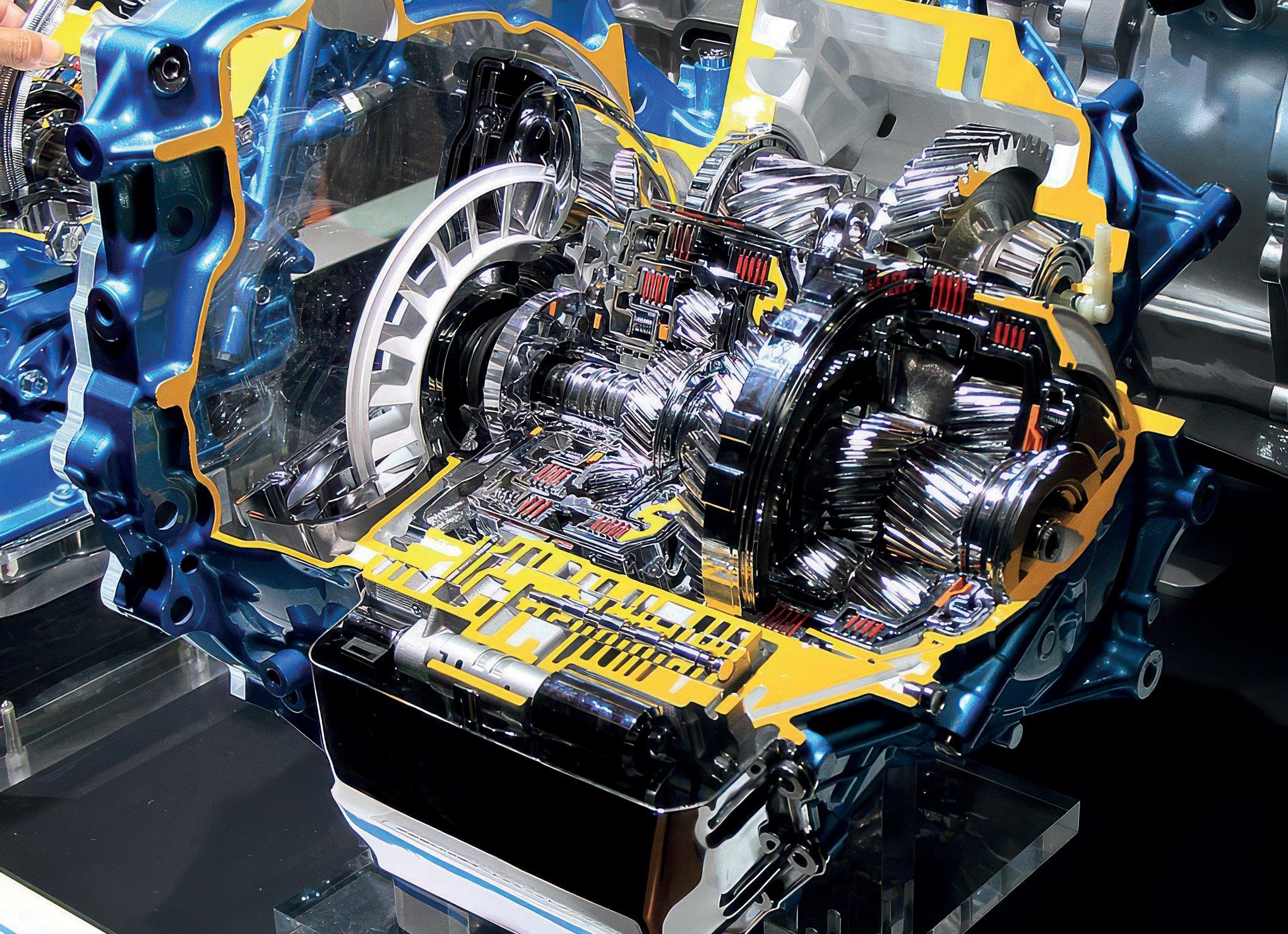
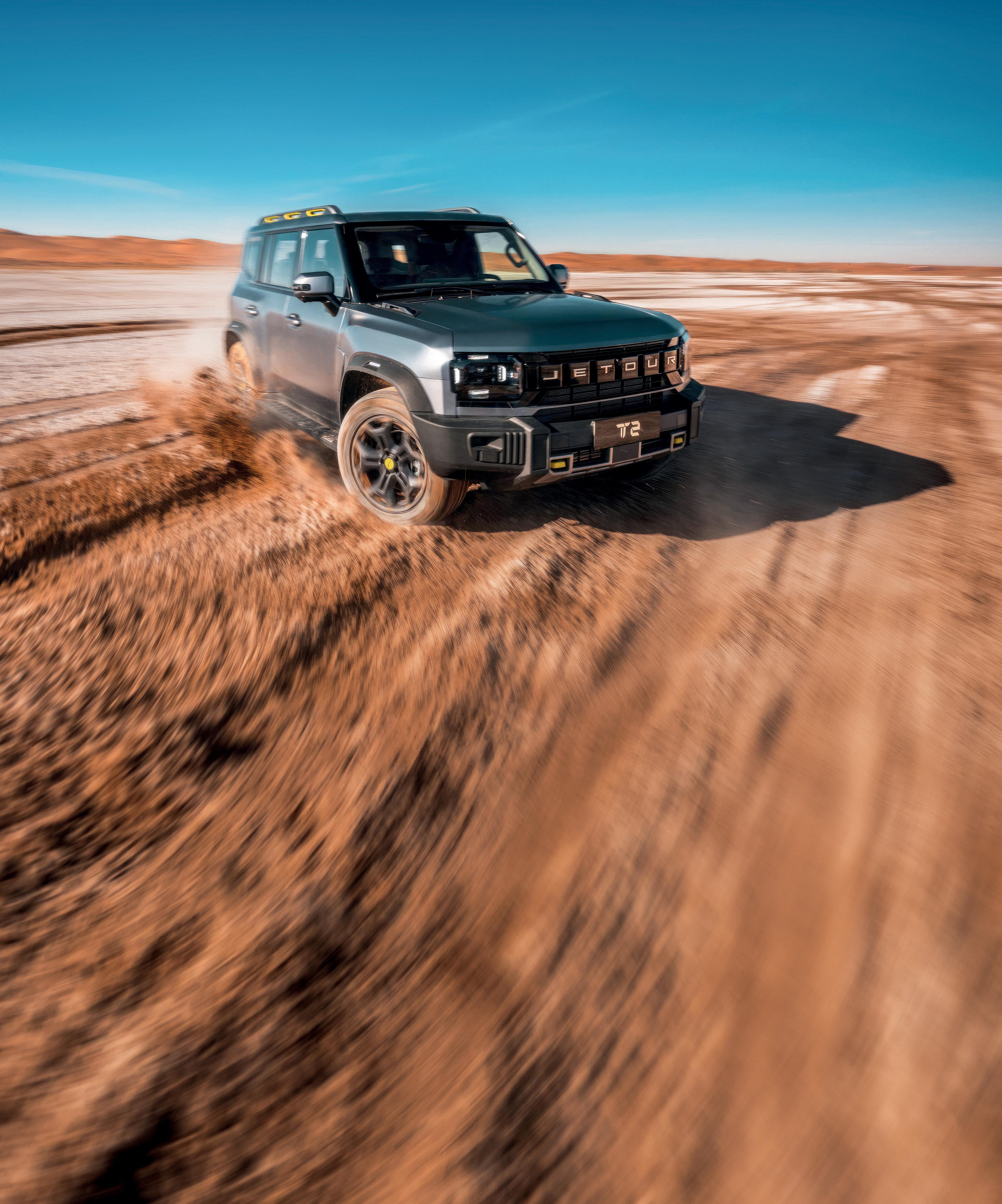
The rise of Chinese automotive Original Equipment Manufacturers (OEMs) in the Middle East has reached a significant milestone, with over 20 Chinese brands now operating or preparing to enter the markets in Saudi Arabia (KSA) and the UAE.
A recent study by Glasgow Research & Consulting (GRC) underscores the growing acceptance of these brands, which are steadily gaining traction against established players from Japan, the US, and Europe.
Chinese OEMs have captured approximately 11% of the UAE’s car market, based on retail sales from the past quarter. However, GRC estimates that this number rises to 14-15% when including exports and parallel trade. In KSA, this trend is more mature, with Chinese brands gaining significant ground over the past 1-3 years, compared to a similar trajectory in the UAE within the past 1-2 years.
One of the key strategies driving Chinese OEM success is their focus on high-end trims of passenger cars, particularly in the SUV segment. By offering premium features at competitive prices, these brands appeal to a wide range of consumers. For example, in one showroom, Chinese principals emphasized pricing an SUV under AED 100,000 to capture market attention—a testament to their competitive market entry approach.
Chinese brands are also prioritizing market share and brand building over immediate profit margins. Their efforts are evident in the growing preference among Saudi women for Chinese cars, which serve as first vehicles, economical choices, or additional cars for families with an average ownership of 2.5 to 3 cars per household.
While Chinese OEMs are rapidly penetrating the market, long-term success depends on addressing key challenges in aftersales service and spare parts availability. Some UAE dealerships that sold large volumes of Chinese
vehicles are already encountering issues in these areas. As the first wave of new Chinese cars ages, expected within the next 3-4 years, the effectiveness of their service delivery will be a critical factor in maintaining consumer trust.
The presence of Chinese brands like GAC Motor, Changan MEA, BYD, and Jetour on Dubai’s Sheikh Zayed Road highlights their visibility and influence in the region. With a strategic focus on market-specific pricing, consumer needs, and brand-building efforts, Chinese OEMs are establishing a strong foothold.
As Michael Johannes, Vice President of Automechanika Frankfurt, noted during the Automechanika Dubai Awards, the scale of Chinese participation at events like Automechanika Shanghai—boasting 6,500 exhibitors—reflects their ambition and capability. In summary, the Chinese OEMs have truly “arrived” in KSA and UAE, marking a transformative period for the re-gional automotive landscape.
NEXT ISSUE: THE LONG, WINDING ROAD TO GREENER TRANSPORTATION, RENTAL REVIEW SPECIAL, AND MUCH MORE!



